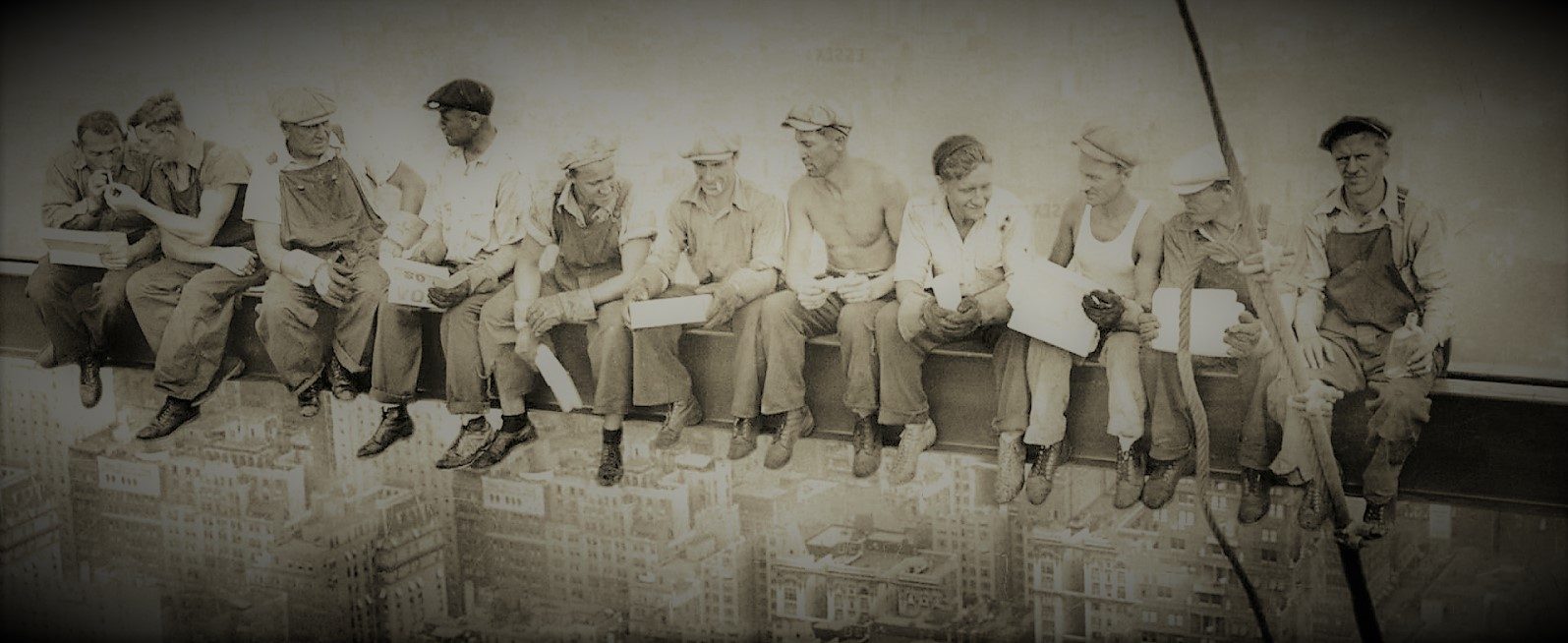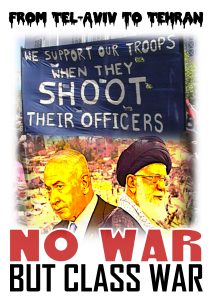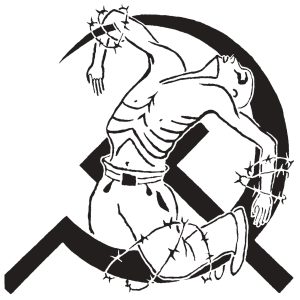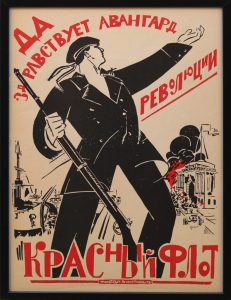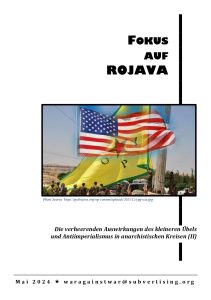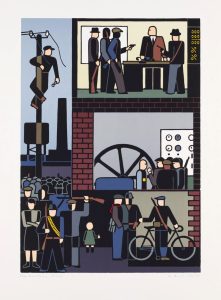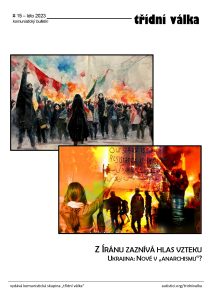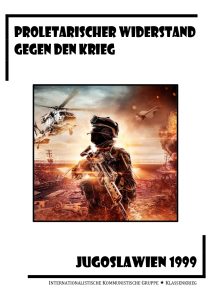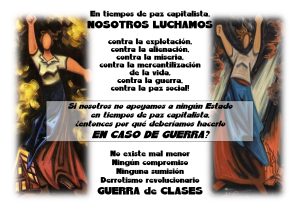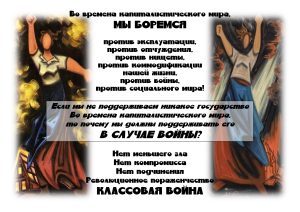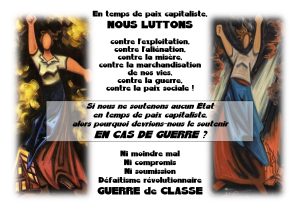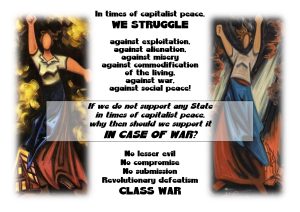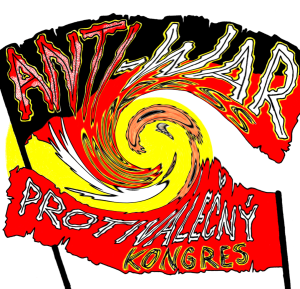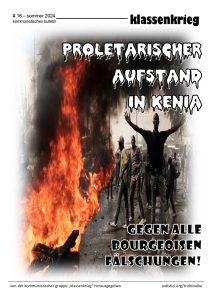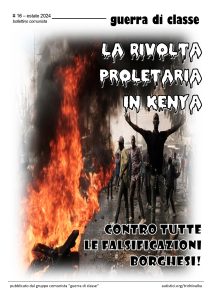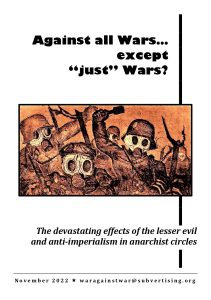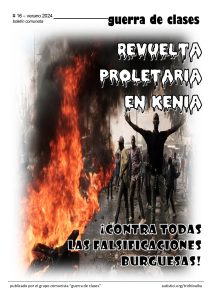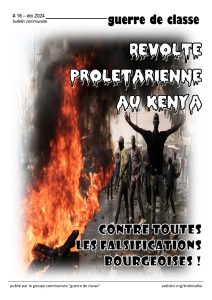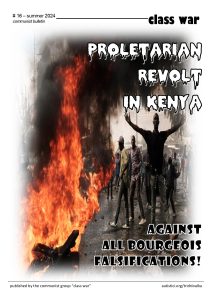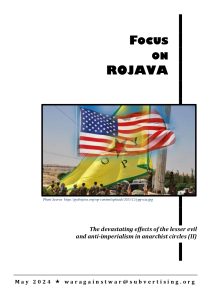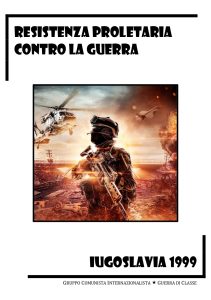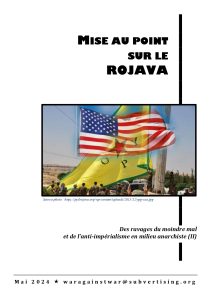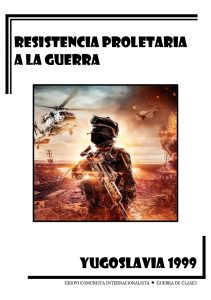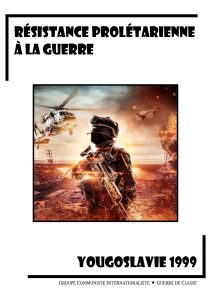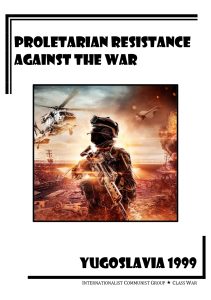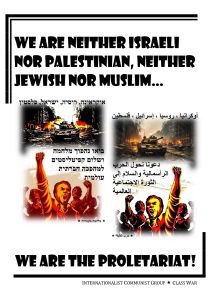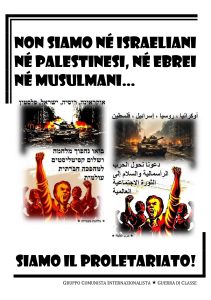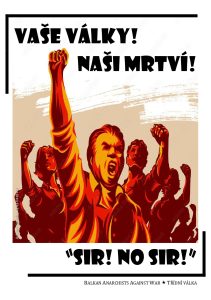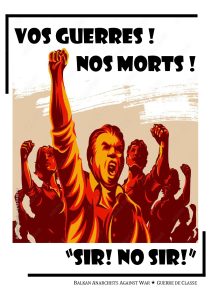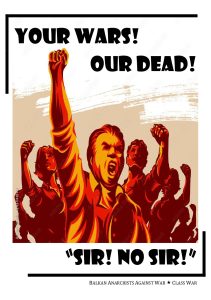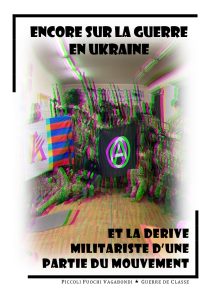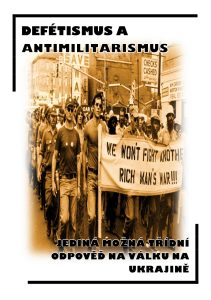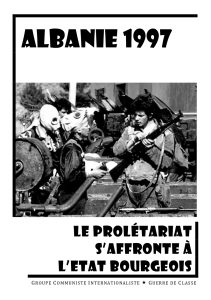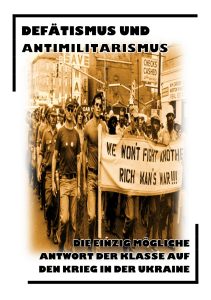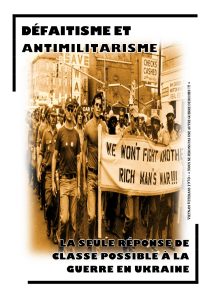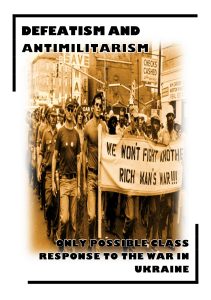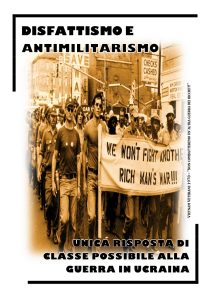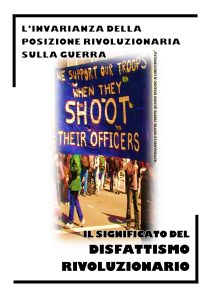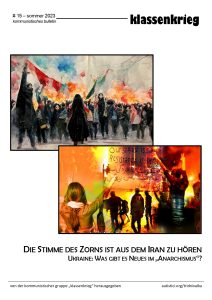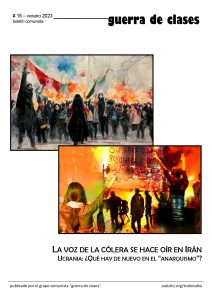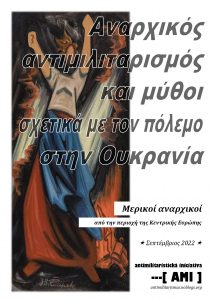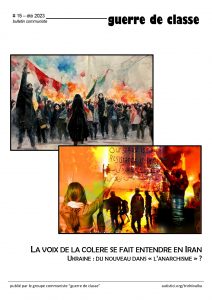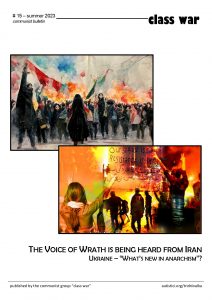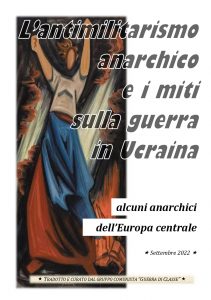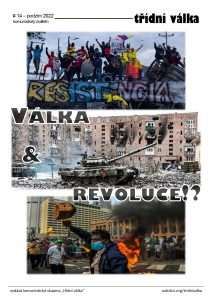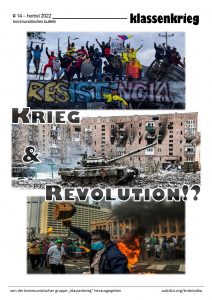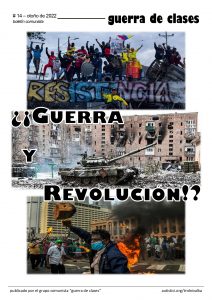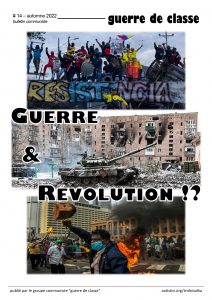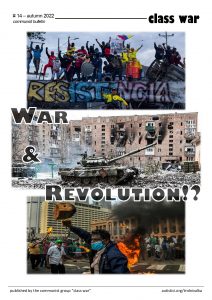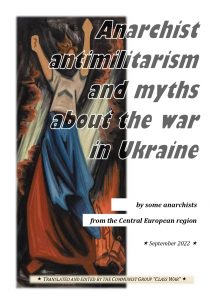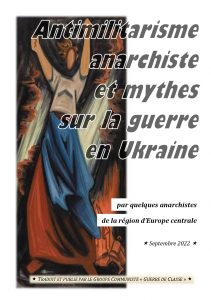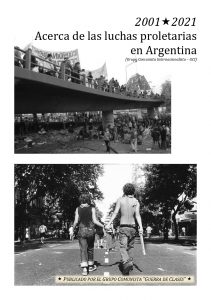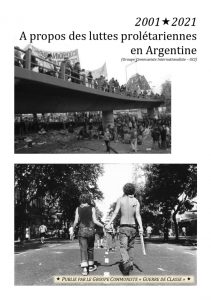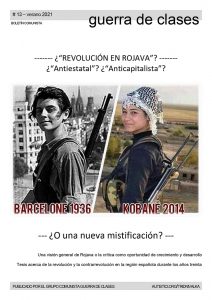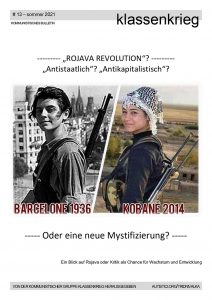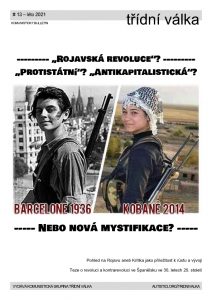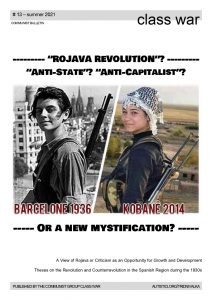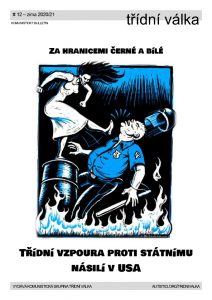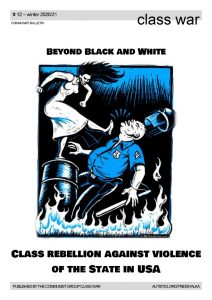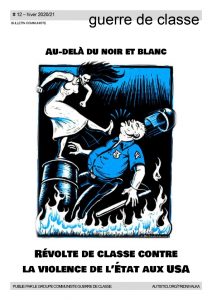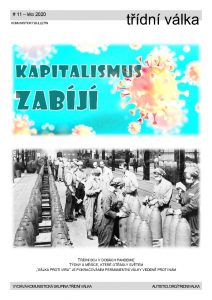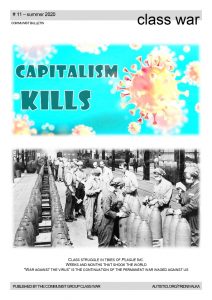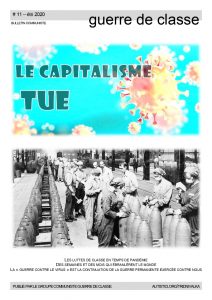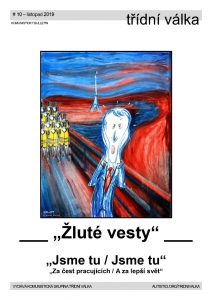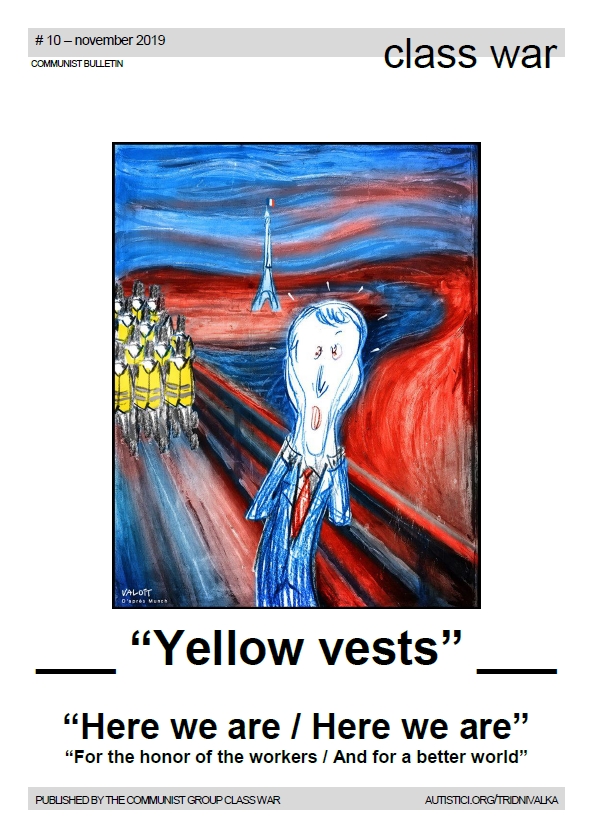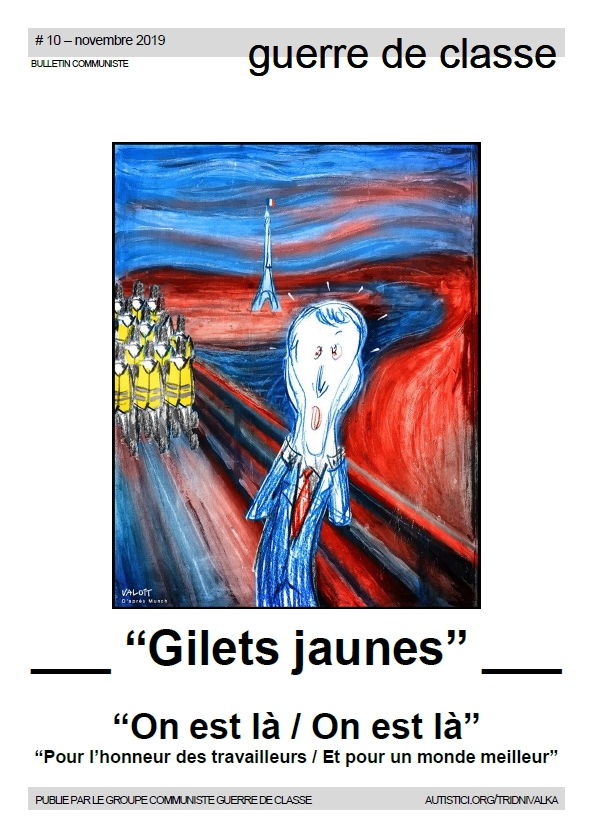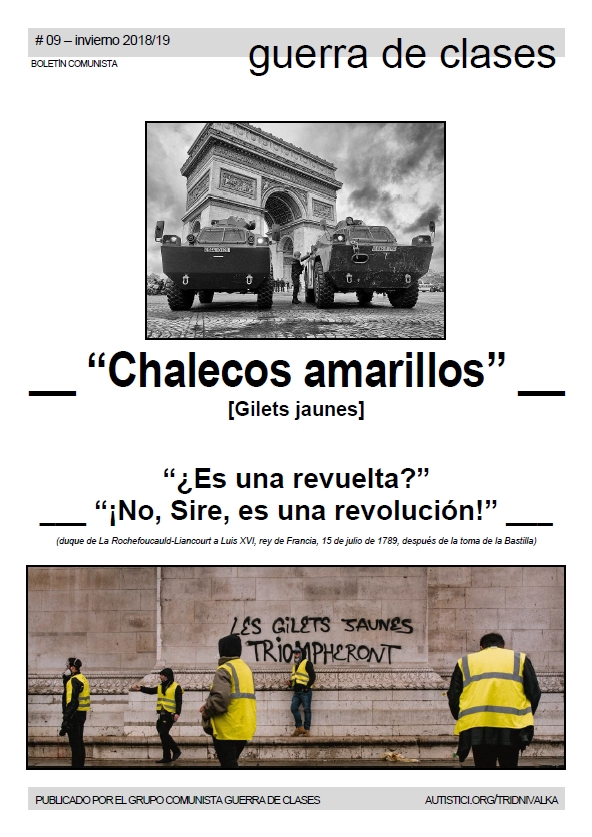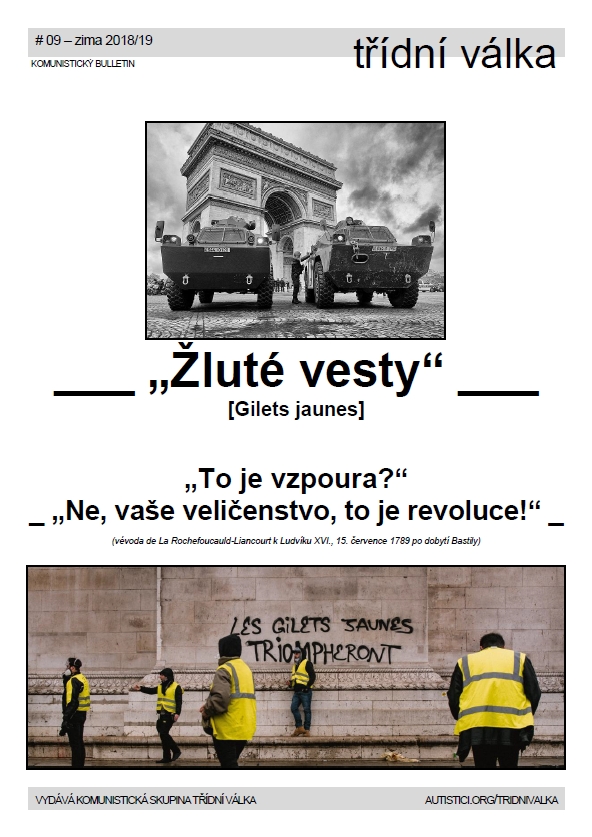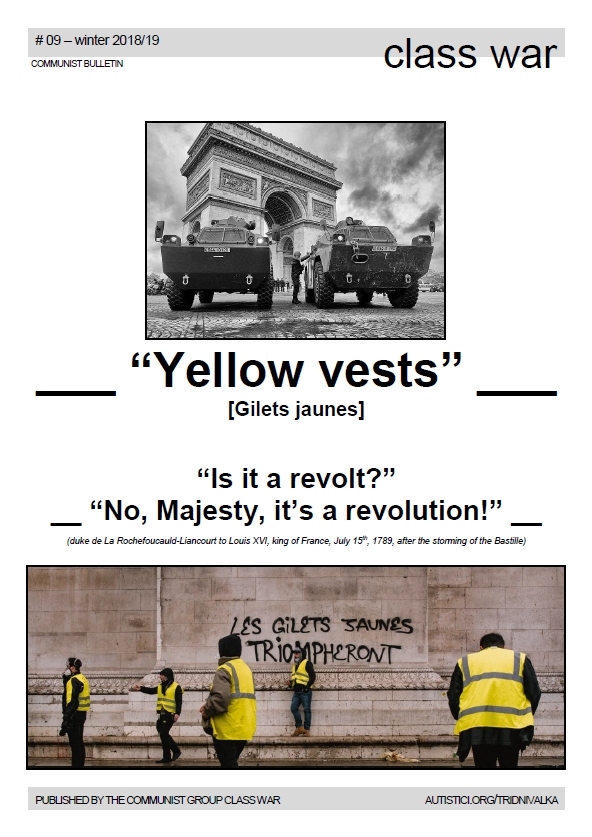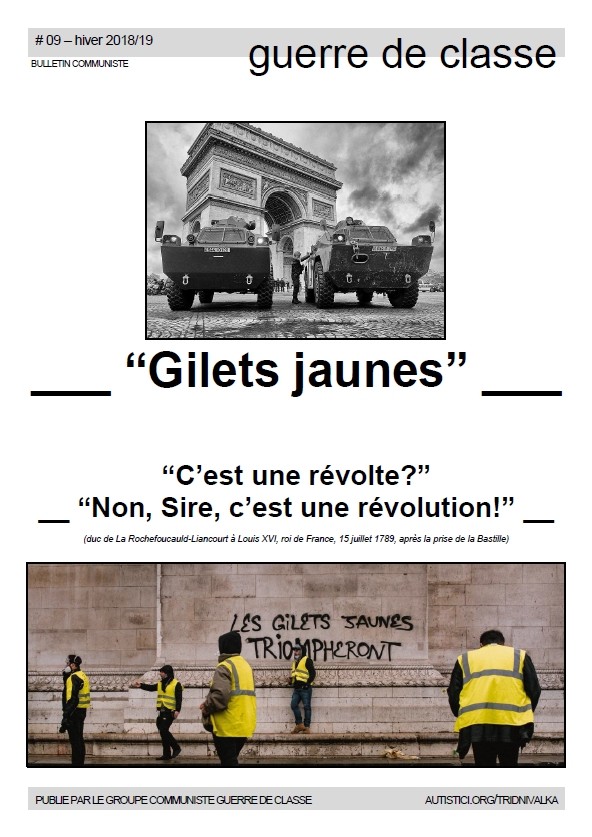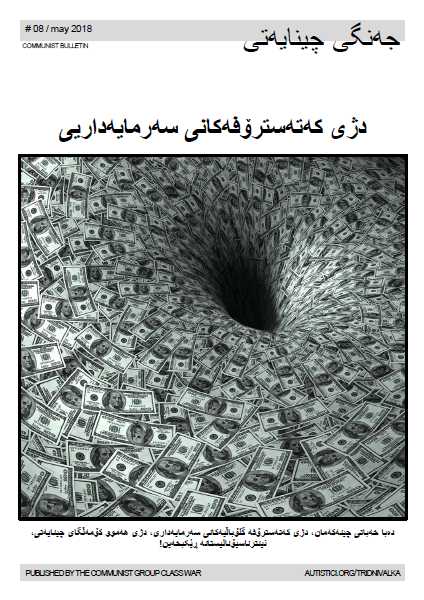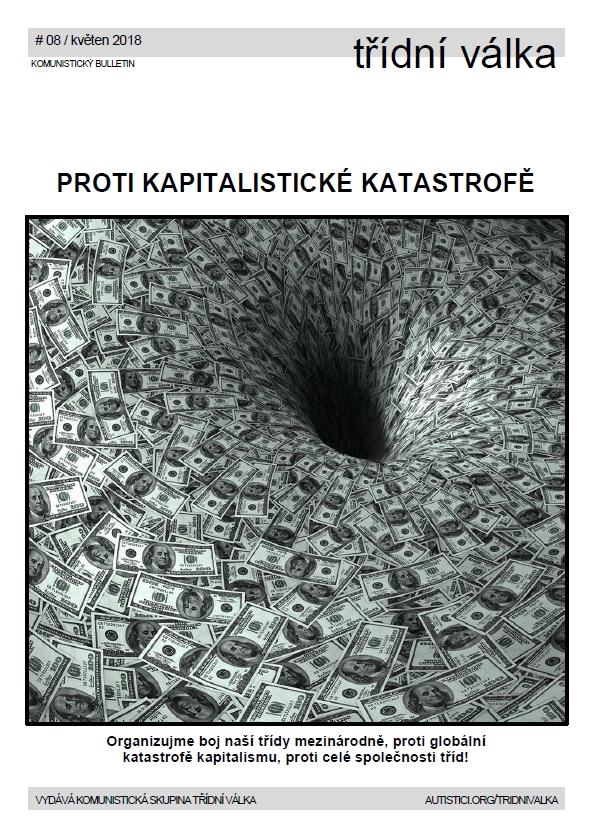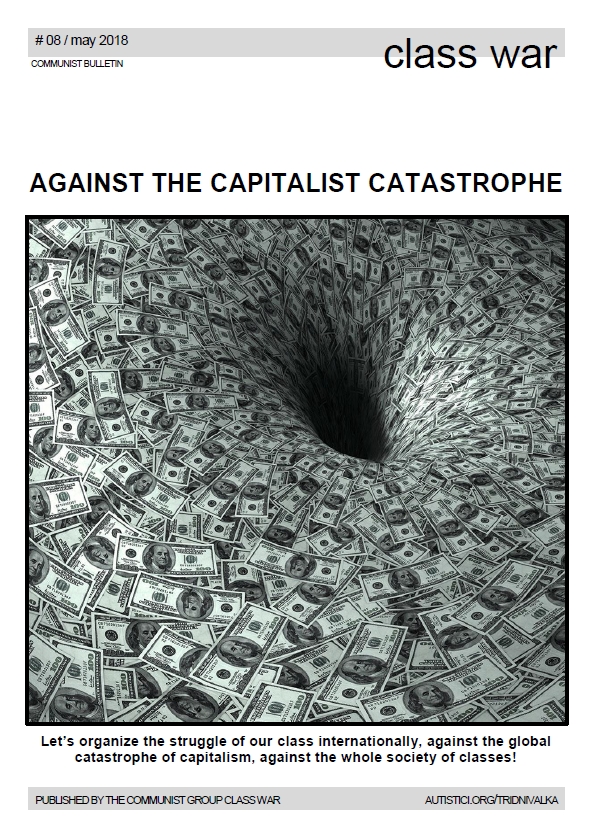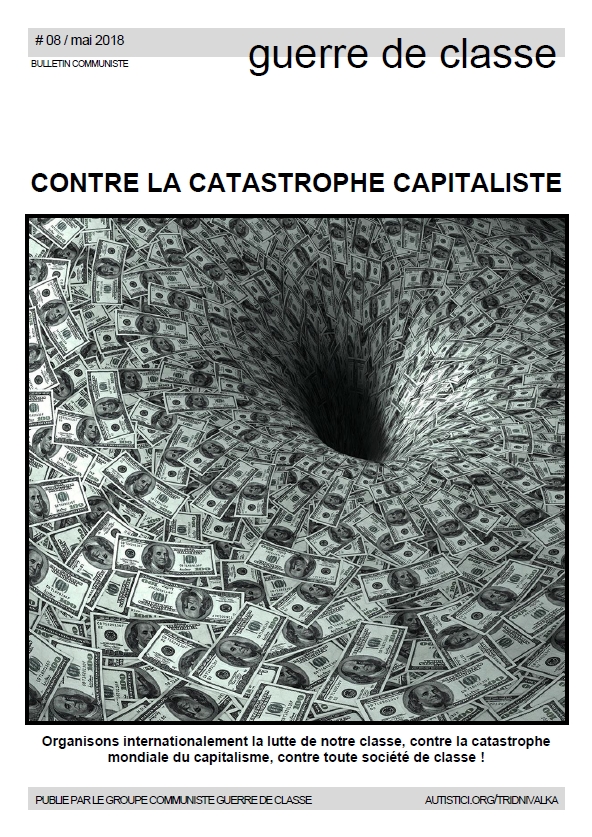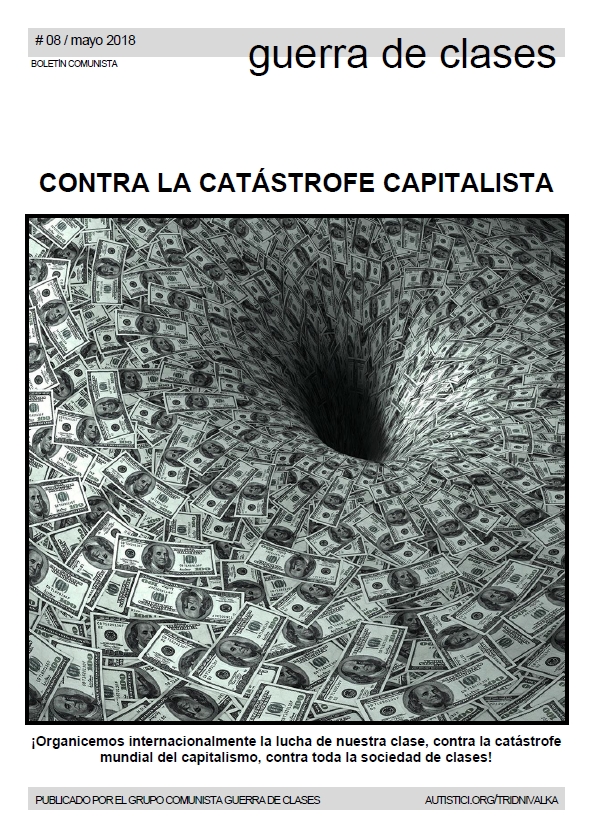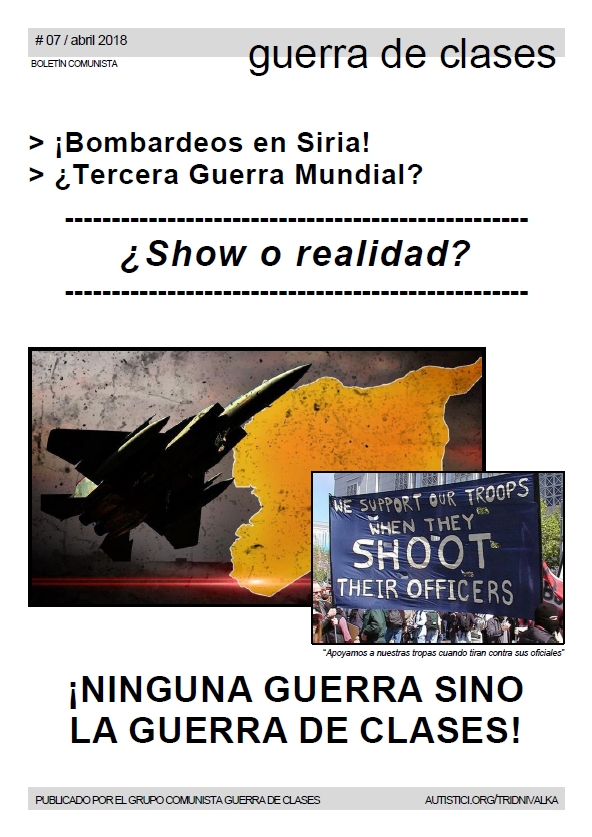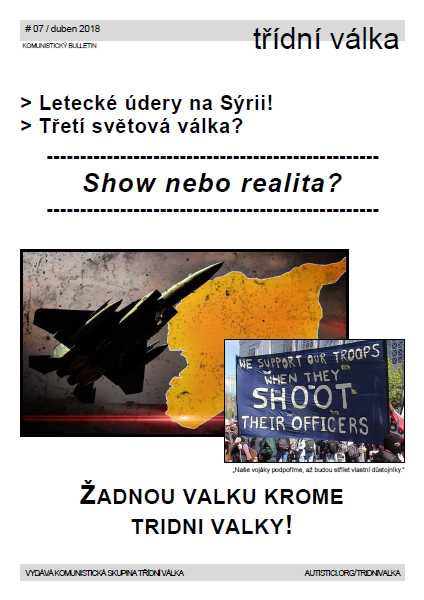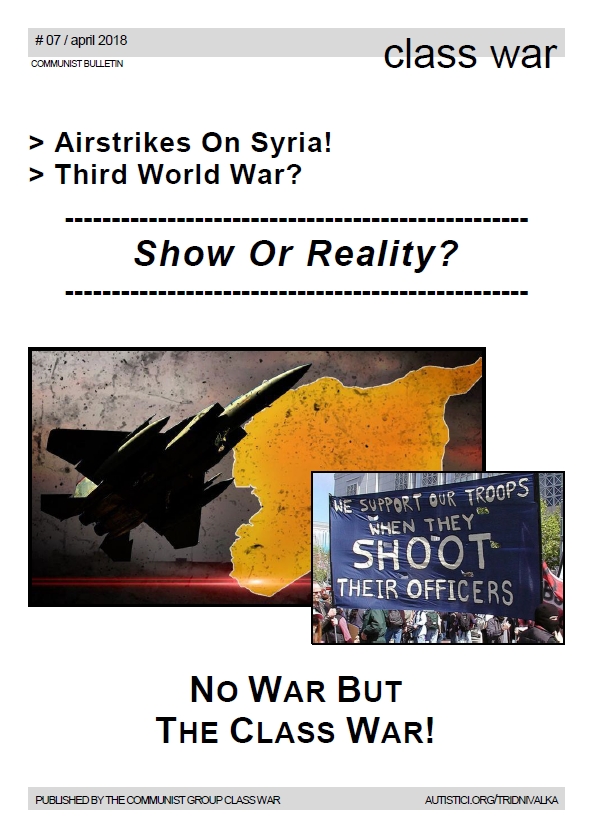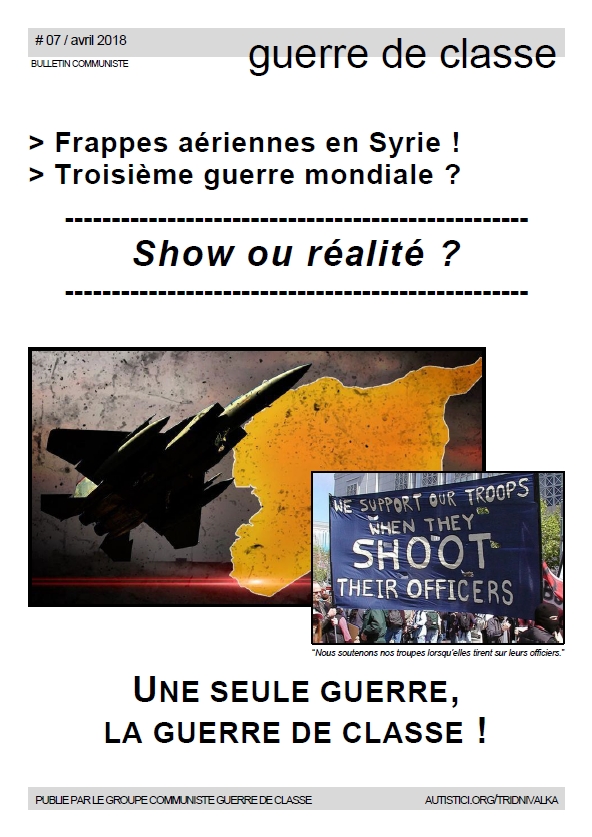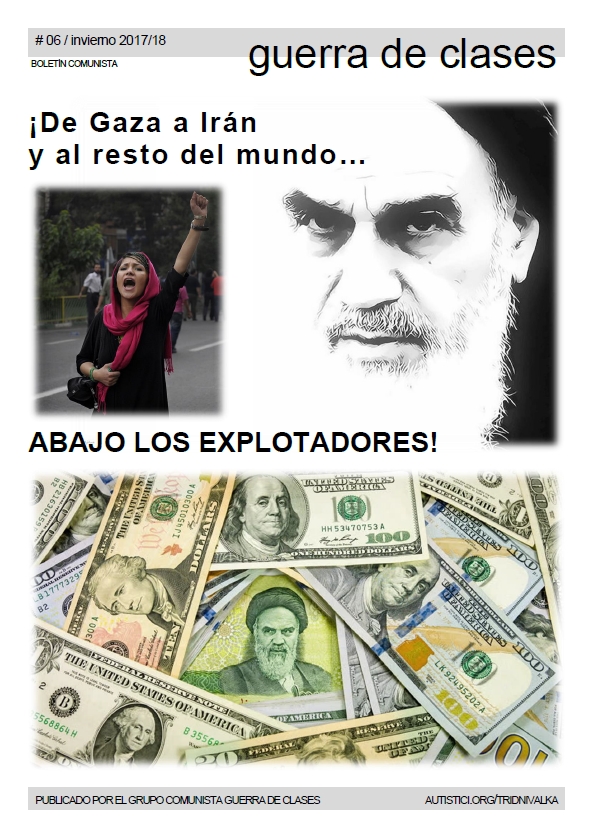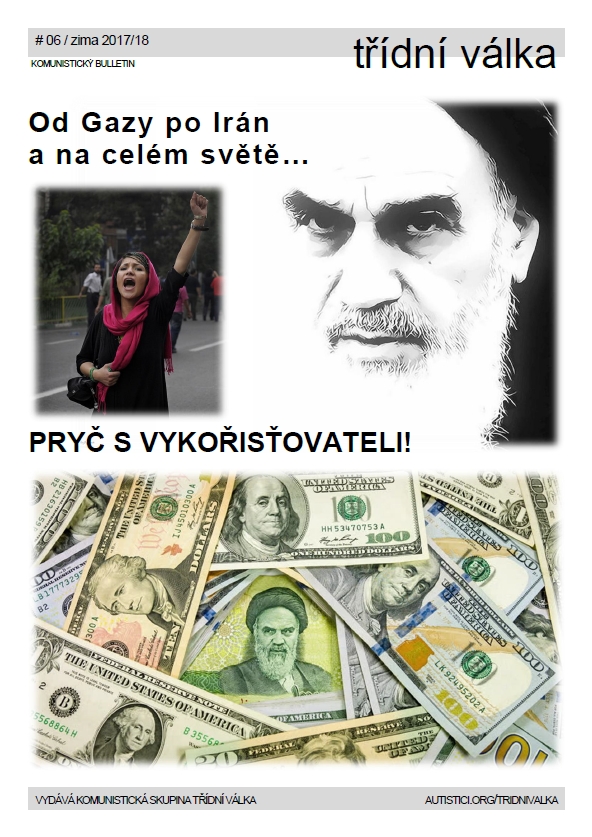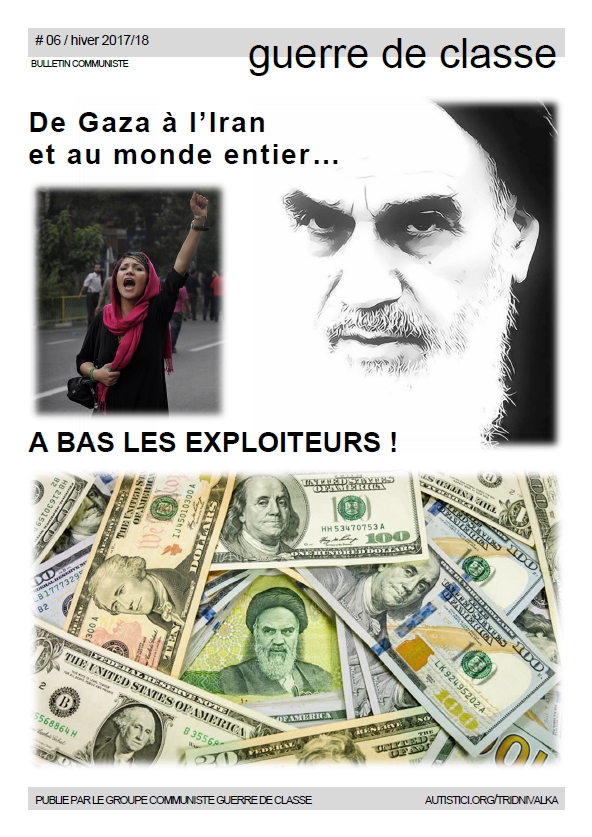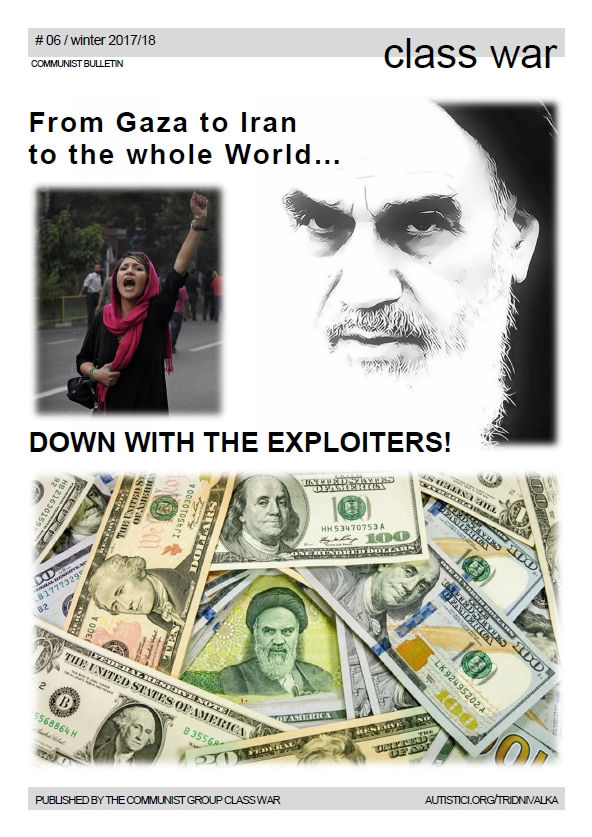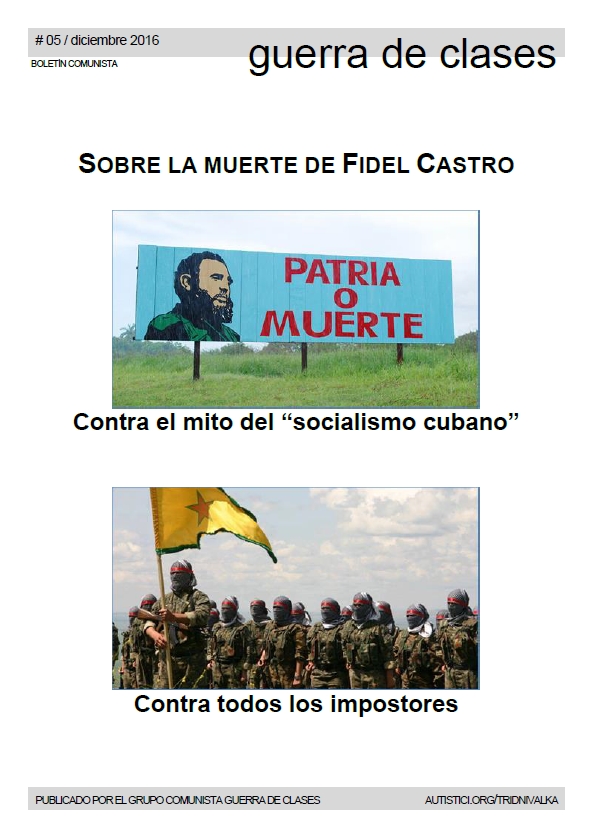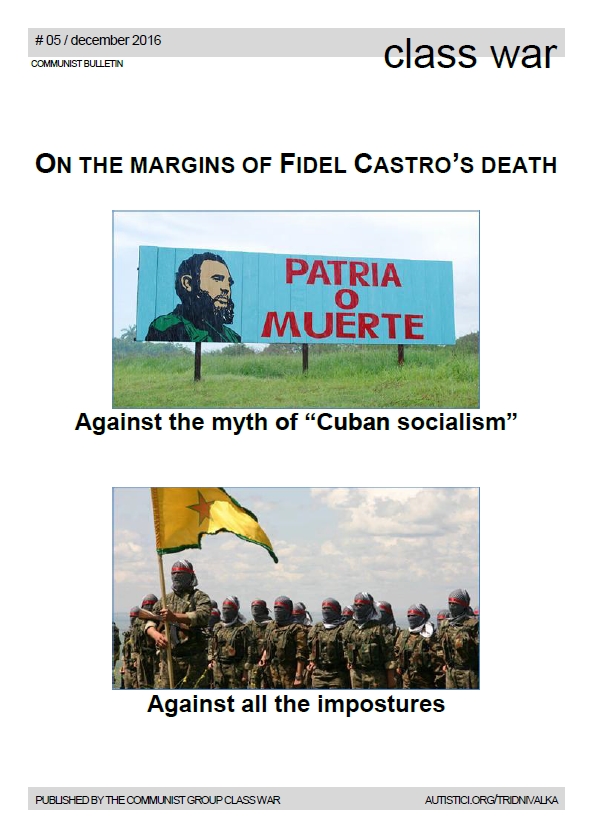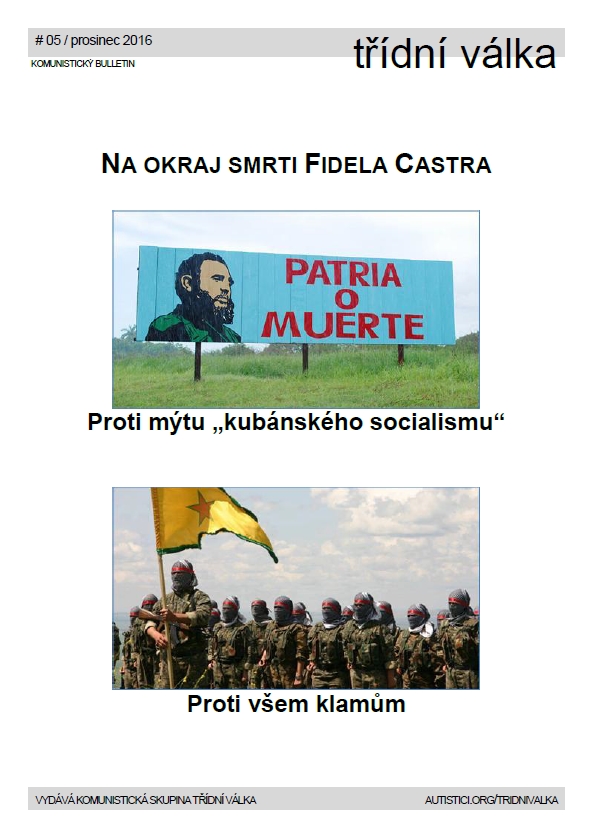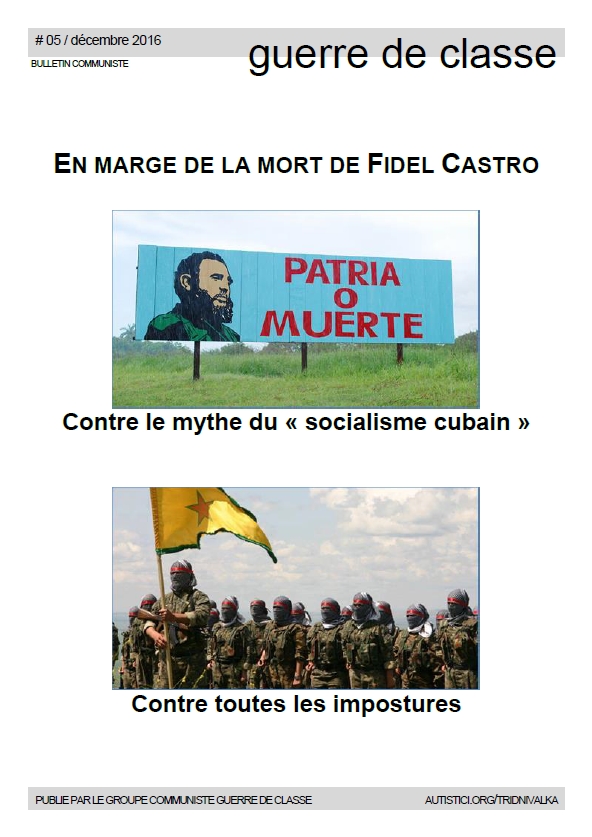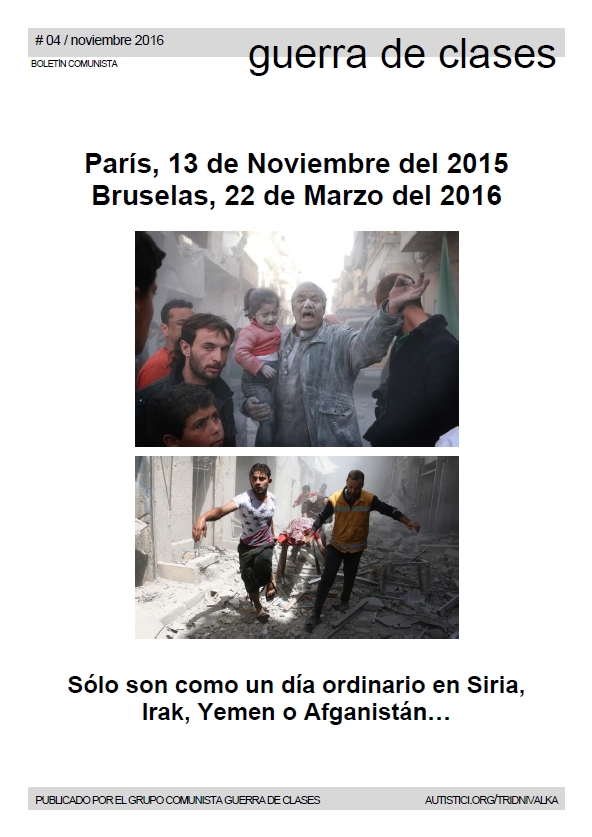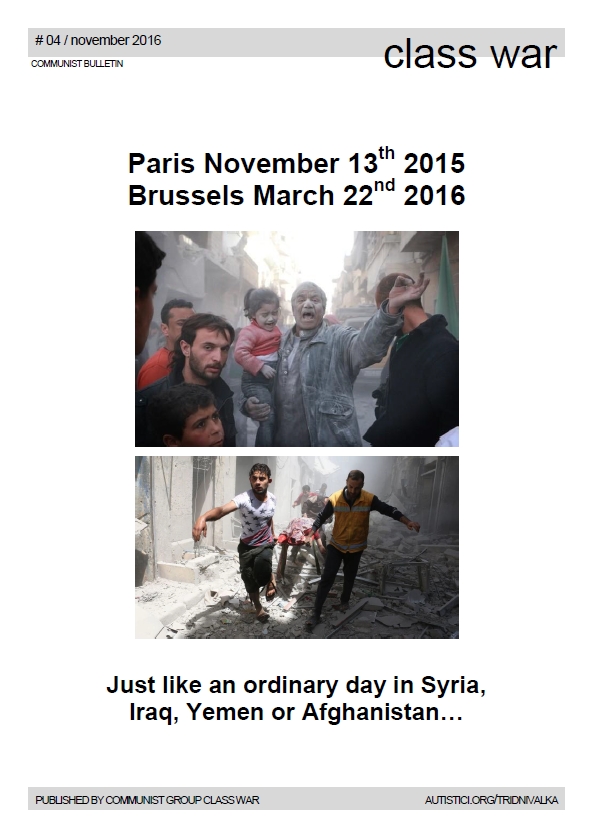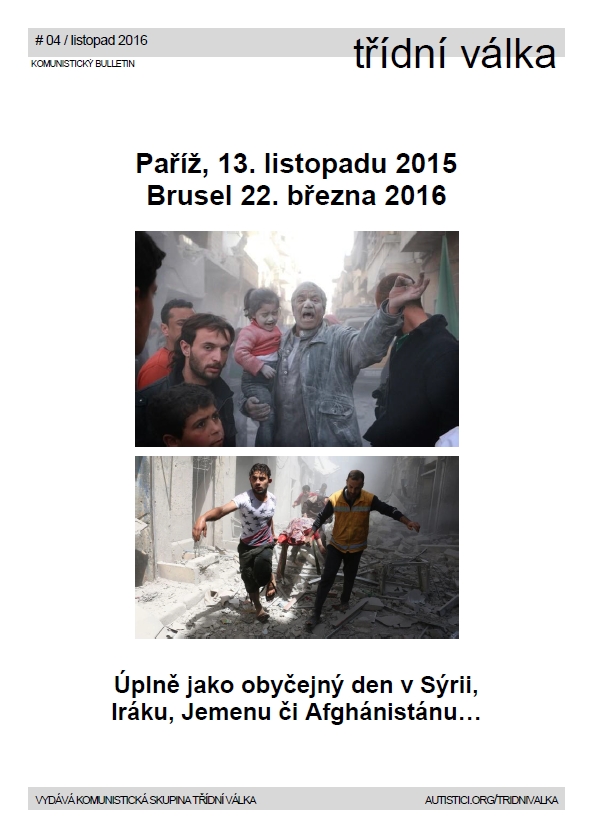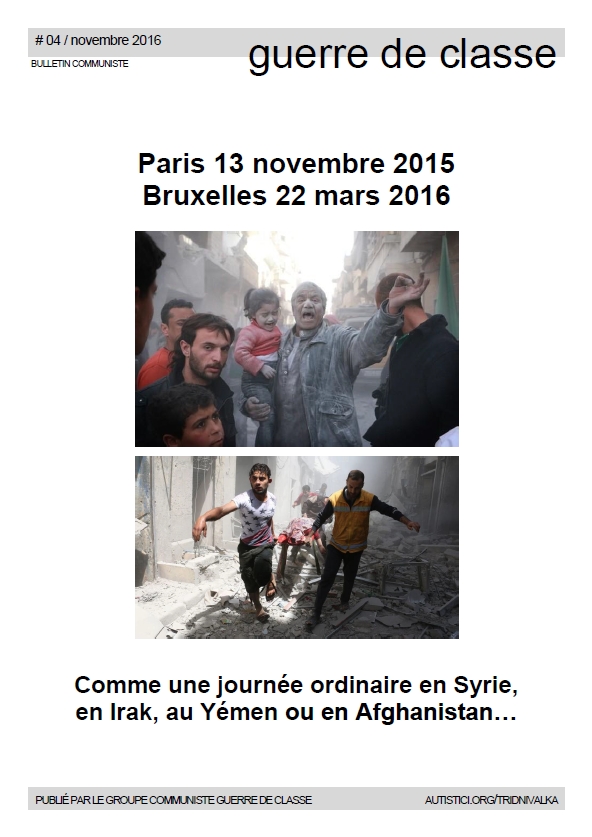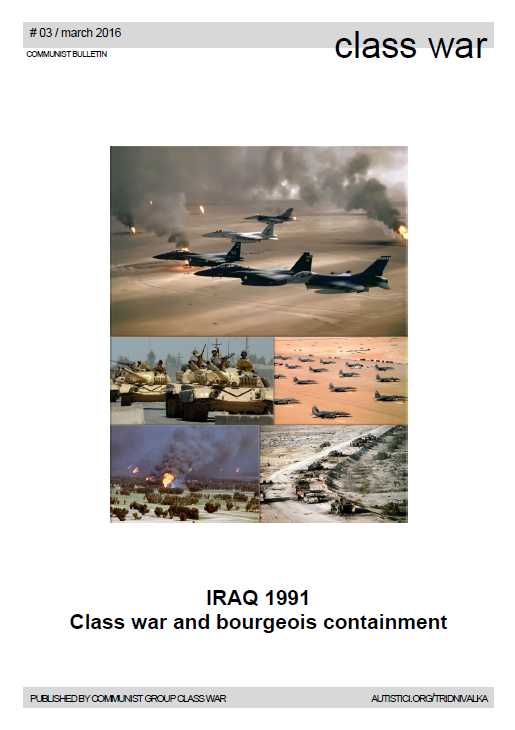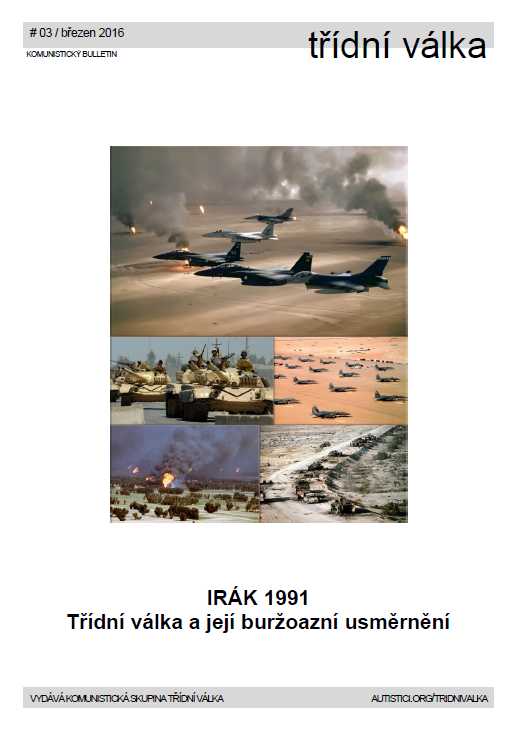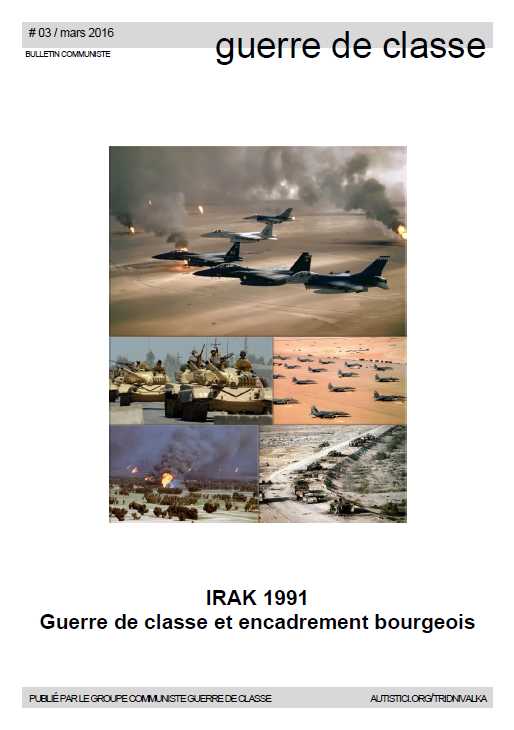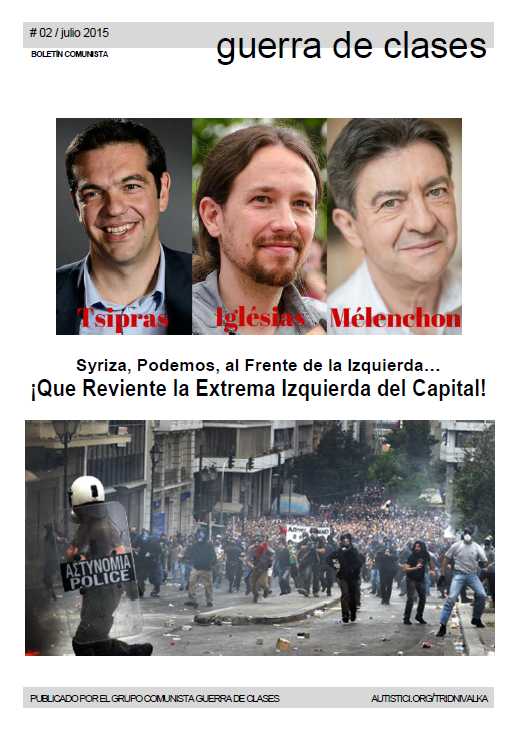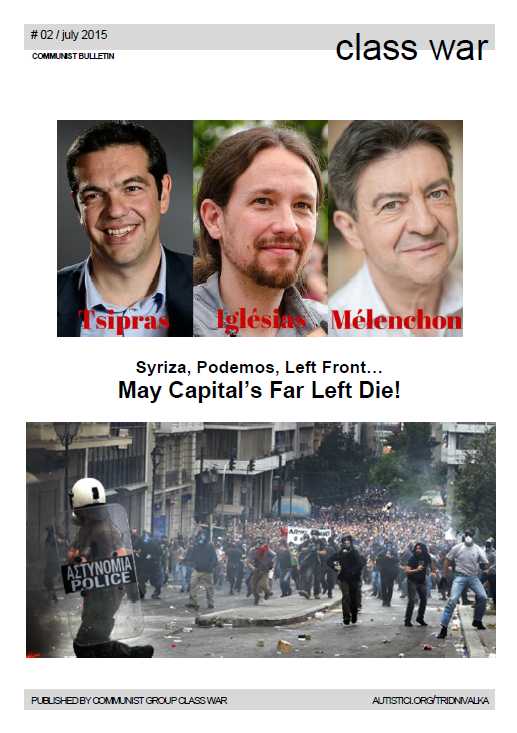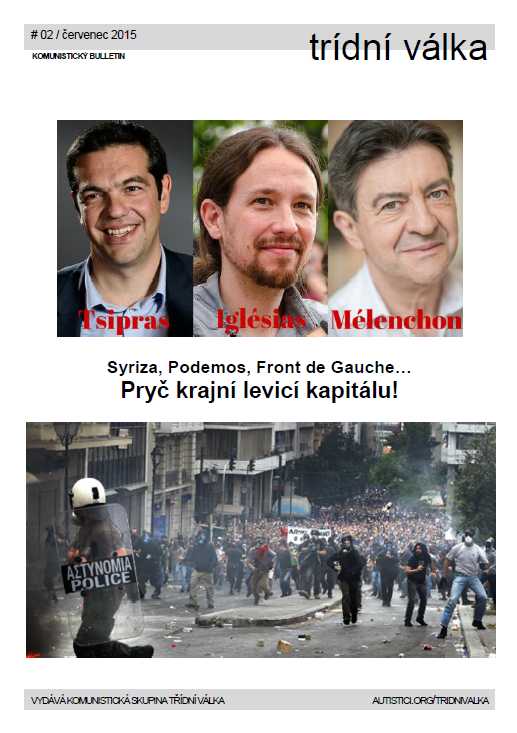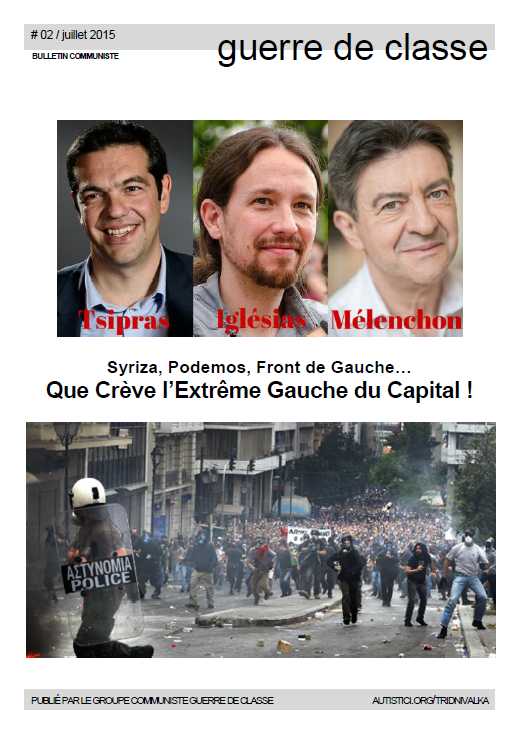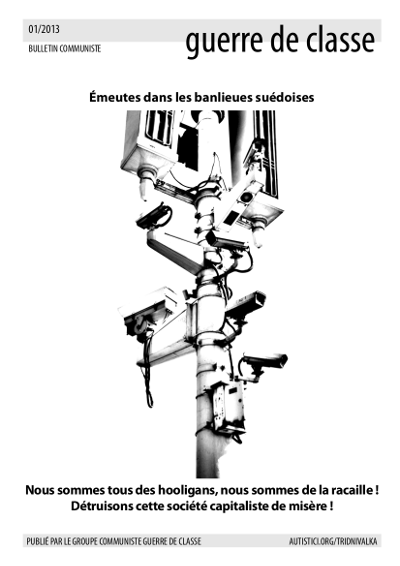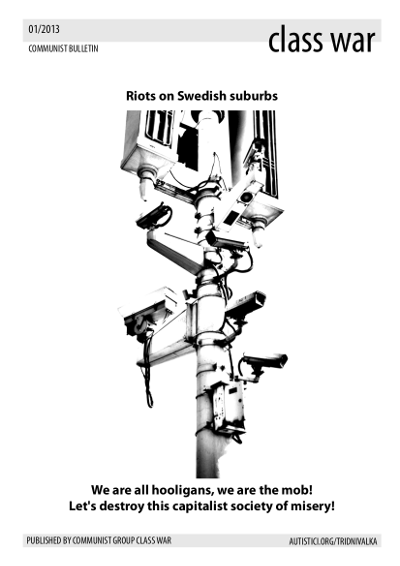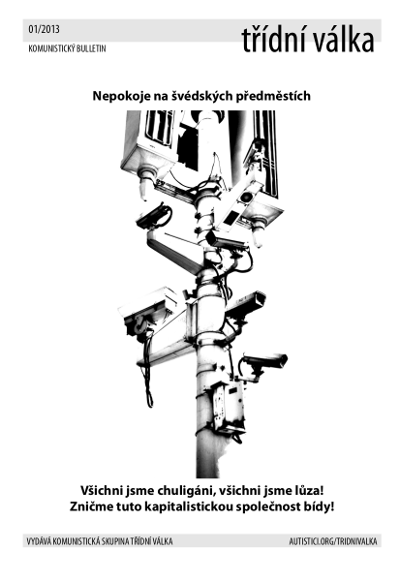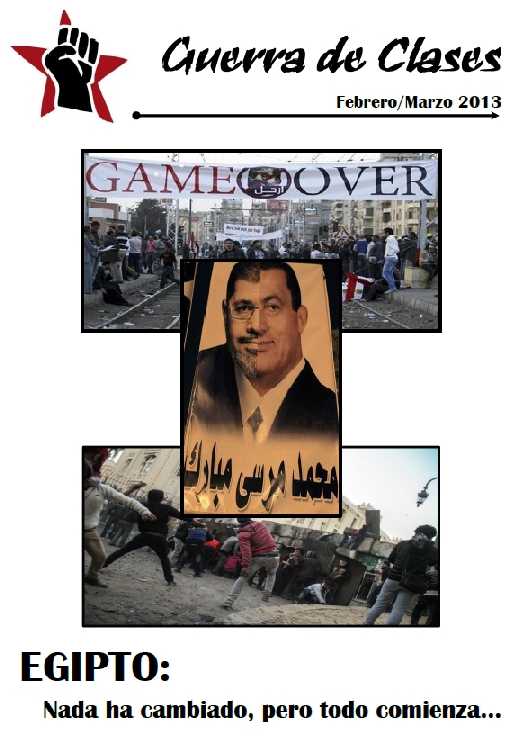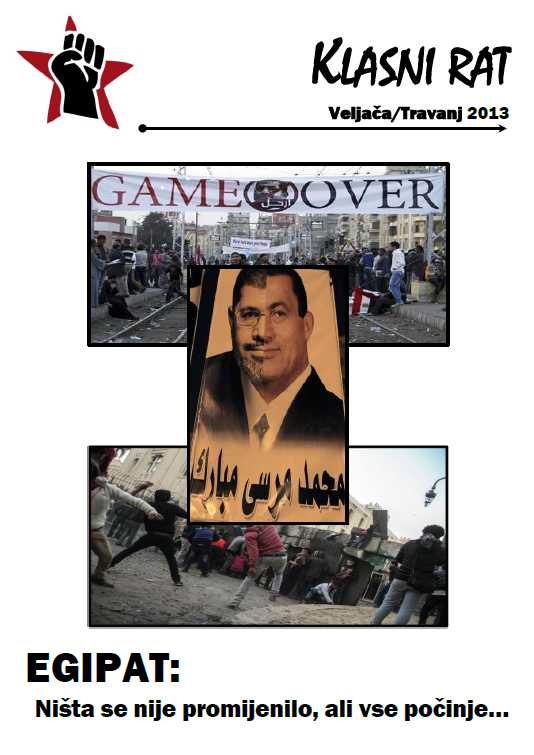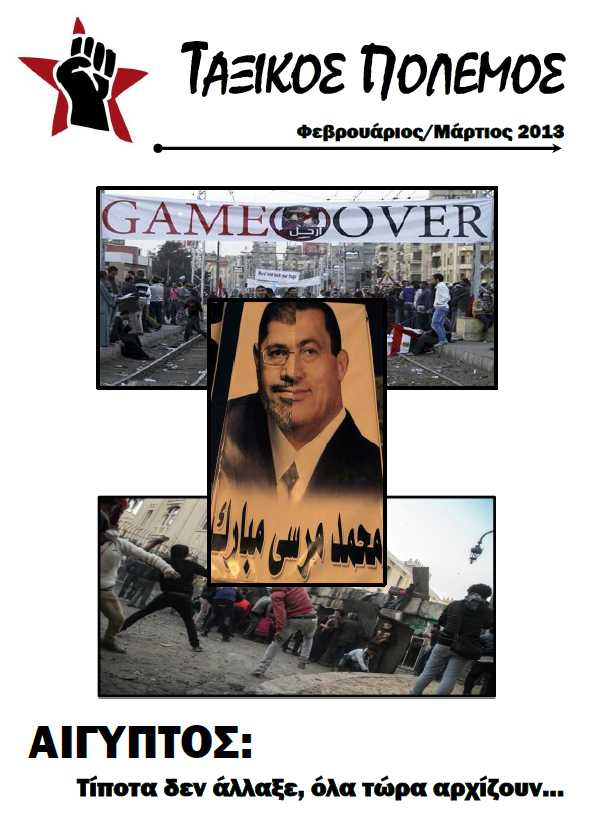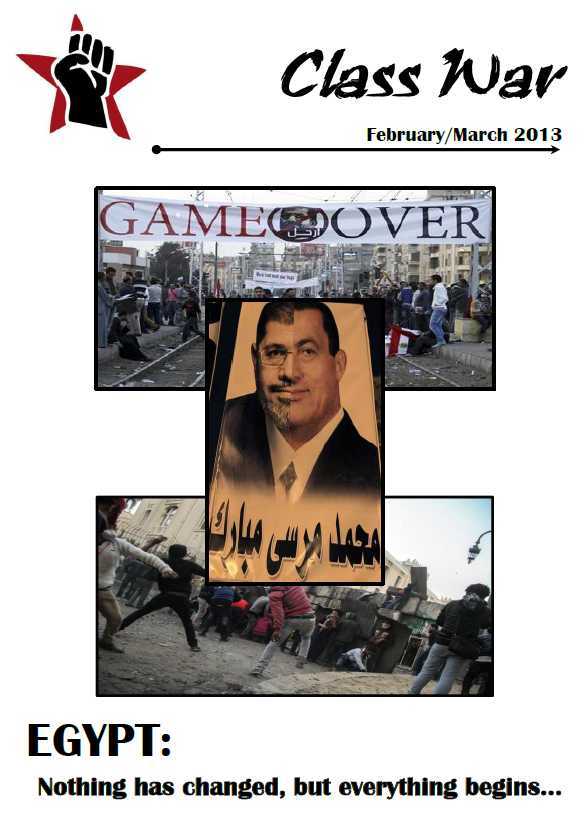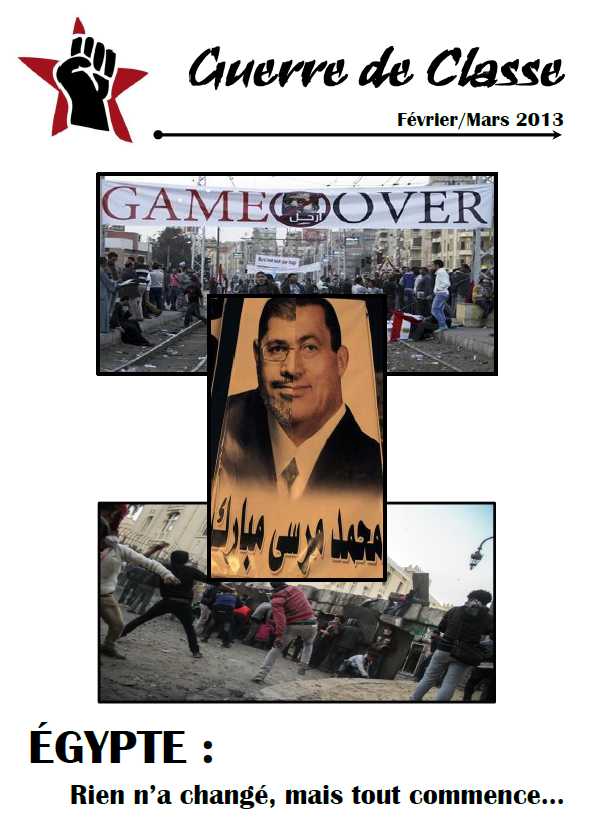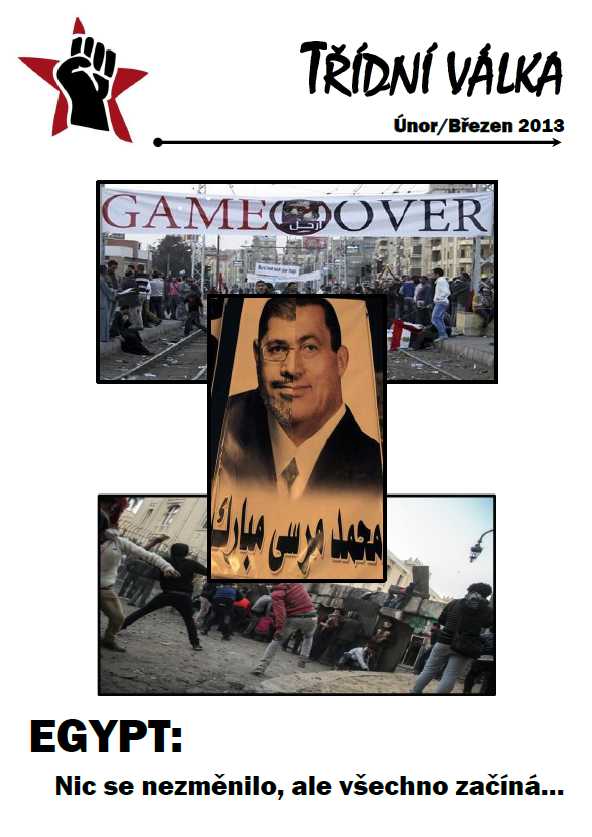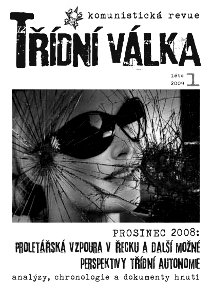ǀ English ǀ Čeština ǀ Français ǀ Deutsch ǀ Español | Italiano ǀ Nederlands ǀ Português ǀ Русский ǀ
Last Update: 2 December 2022 – English and translation from Greek
- [Class War] Proletarians in Russia and in the Ukraine! On production front and military front… Comrades!
- [Class War] Internationalist Manifesto against capitalist war and peace in Ukraine…
- [Red and Black Notes] Statement on Russia’s invasion of Ukraine
- [No War but the Class War] War, Poverty, Crisis and Disease: The True Face of the Capitalist System
- [Internationalist Perspective] Don’t fight for “your” country!
- [Fredo Corvo and Anibal] What revolutionary internationalist defeatism in the “Ukrainian” war really means
- [ACG] The “Campaign for real war”
- [ACG] Revolutionary Defeatism
- [ACG] We’ll shoot the generals on our own side
- [Dark Nights] War is the supreme drama of a completely mechanized society
Translations from Czech:
- [Proletarchiv] Critical commentary on the political orientation of the text from Kolektivně proti Kapitálu – Mouvement Communiste
- [Subverze] Internationalist Contributions to Resistance against War
- [antimilitarismus] Anarchist antimilitarism and myths about the war in Ukraine
- [antimilitarismus] Appeal: Days of international solidarity with deserters
- [antimilitarismus] Mutinies in the Russian army
Translations from French:
- [Avis de tempêtes] Logics of war
- [A$AP Revolution] Against the War, Class War!
- [anarchie!] War starts here
- [Exploités énervés] Against the war of Putin and NATO, let’s rise up in Ukraine, in Russia, in France!
- [La mouette enragée] Peace to the huts, war to the palaces!
Translations from German:
- [Soligruppe für Gefangene] Against wars of capitalism, our answer is social war
- [In der Tat] Against war and military mobilization (Preliminary notes on the invasion of Ukraine)
- [Papier-Mâché] No peace with the existent which knows no peace!
Translations from Italian:
- [Bezmotivny] We sabotage the war – Triggering the International
Translations from Spanish:
- [La Oveja Negra] Against Capitalist War!
- [Vamos Hacia la Vida] Reflections on the ongoing capitalist butchery (Russia/Ukraine)
- [Grupo Moiras] War in Ukraine: An Internationalist Voice from Russia
- [Proletarios Revolucionarios] On revolutionary defeatism and proletarian internationalism in the current war between Russia and Ukraine/NATO
Translations from Russian:
- [KRAS] Anti-war struggle in Russia and in Ukraine
- [KRAS] Again about “anarchists” who forget the principles
Translation from Greek:
- [Acte] A message of solidarity to all those who are fighting against the war in Russia and Ukraine
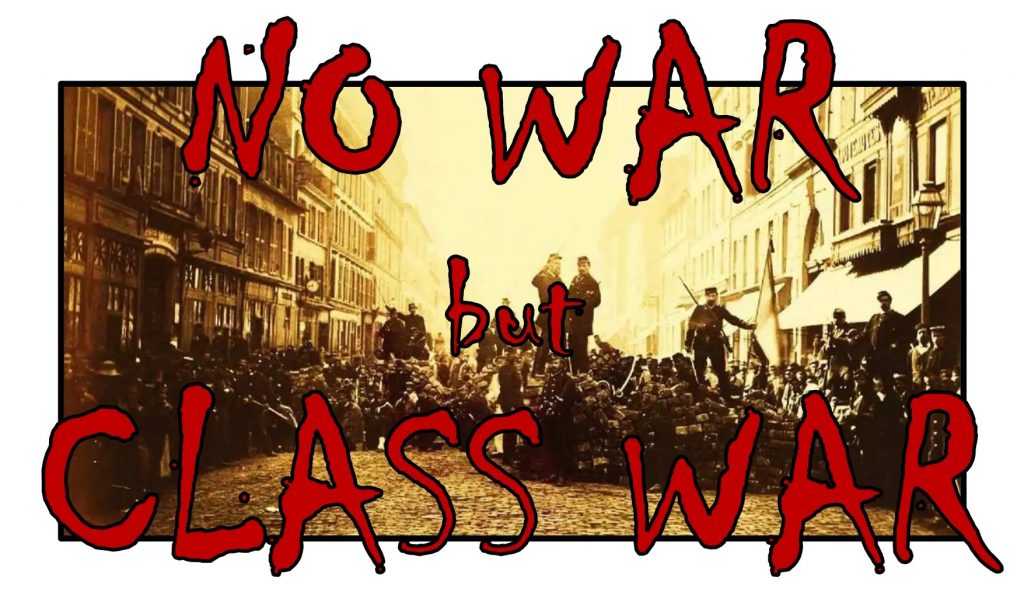
[Red and Black Notes] Statement on Russia’s invasion of Ukraine
Source: https://www.redblacknotes.com/2022/02/26/no-war-but-the-class-war/
Russia’s recent invasion of Ukraine is an extension of the human disaster that began many years ago – a product of years of political dictatorship, capitalist terror and geopolitical rivalries. It will predictably result in the deaths of many civilians, and the displacement of even more.
Putin has taken this expansionist course in order to prevent Ukraine from becoming further integrated into the economic bloc of the European Union. His Eurasian Economic Union, comprising Russia and its close allies like Belarus and Kazakhstan, is set up as an expression of the interests of the bourgeoisie of his own country, which prefers to be a big fish in a small pond than to negotiate with the EU as a regular partner.
In some sense, this is a clash between two kinds of capitalist economy: the paternalistic, oligarchic, often state-driven economies of Russia and its neighbours, and the modern, market-driven, hyper-competitive economies of the “advanced” EU states. The integration of the states around Russia threatens the current Russian bourgeoisie, because it threatens their own existence.
We do not believe this is as simple as a clash between western liberalism and eastern dictatorship, as some would suggest. Our opposition to the Russian bourgeoisie does not entail support for the western European one; as cases like Poland and Hungary show, countries can develop “democratically” towards authoritarianism under the aegis of the EU and NATO. The growth of “fortress Europe”, greatly inspired by Australia, that brutalises migrants with increasing severity, also demonstrates that liberal democracy and authoritarianism are not opposites, but joint partners.
The war in Ukraine will have global repercussions. Not only will it affect the EU and Eurasian states, but also the USA, which serves as Europe’s main military power through NATO. Ukraine is also a major agricultural exporter, with many countries reliant on the wheat produced by its fertile soil. Lebanon, for instance, already in the throes of an economic crisis, imports 50% of its wheat from Ukraine. Libya imports 43%. By value, 86% of Egypt’s wheat imports come from Ukraine and Russia. Destabilisations in this market will undoubtedly trigger the kind of “bread riots” we have seen before in many of these countries.
Despite their differences, both the Western European and Russian bourgeoisies share one essential thing in common: defence of their own existence against their own working classes. Accordingly, the main response to this warmongering should not be either apologia for Russia imperialism or support for NATO, or even “national defence” within Ukraine. Rather, we support a renewed effort to bring together workers across national boundaries, supporting all forms of revolt that challenge their respective systems: mutinies, desertions, strikes, sabotage, demonstrations.
For those of us in Australia, we have some basic tasks:
- To fight against the warmongering of our own side, and against the hypocritical condemnations of Russia by the same politicians who drove the invasions of Iraq and Afghanistan – in particular, we should do all that is possible to prevent even more nations from intervening, which would risk the possibility of the war spiralling into a larger, even more disastrous global conflict;
- To undertake meaningful acts of solidarity with the working classes of Ukraine and Russia, who are the primary victims of the war, and with protestors against it in both countries;
- To spread information among workers here regarding the working conditions of those in Russia and Ukraine, and the ways they fight back against the war economy and the restrictions on liberties that inevitably come from it;
- To support the free, safe flow of migrants from the conflict, demanding that Australia end its brutal border policies and grant refugees permanent protection, regardless of how they arrived;
- To work, as always, for the union of workers across national boundaries, fighting for the only thing that can put an end to all wars: the social revolution.
The war is truly horrendous, but like all other capitalist crises, it contains the potential to trigger the kinds of social uprisings that overthrow entire regimes. A century ago Russia participated in a disastrous, bloody war. It ended with a working-class revolution that sent shockwaves across the entire world. It is up to the international working class to make sure that this current war will end in the same way.
Signed by the following anarchist groups of Australia and New Zealand:
Anarchist Communists Meanjin
Black Flag Sydney
Geelong Anarchist Communists
Melbourne Anarchist Communist Group
RedBlackNotes
NO WAR BUT THE CLASS WAR!
[No War but the Class War] War, Poverty, Crisis and Disease: The True Face of the Capitalist System
Source: https://files.libcom.org/files/2022-03/NWBCW Liverpool.pdf
Russia’s invasion of Ukraine is bringing the world ever closer to its boiling point. Once again the working class across the world are being asked to take sides in a conflict from which we have nothing to gain and everything to lose. On the one hand Russia, attempting to reclaim what it has lost since the collapse of the USSR. On the other hand NATO, attempting to draw Ukraine further into its sphere of influence. In the background, imperialist line ups are solidifying, with the EU states rallying behind the US, and Russia turning to China.
While the war in Ukraine represents an escalation in the drive to generalised war, it is not the only battleground right now. Whether it’s Syria, Yemen or Palestine, the capitalist class are pitting workers against each other across the world. All in search for financial revenues, raw materials and cheap labour power. Nationalism – that ideological weapon of divide and rule – calls us to kill and die for a cause which is not ours.
Alongside military conflict, we are in the midst of a class war with our living and working conditions as the sacrifice on the altar of profitability. Through austerity we were forced to pay for the 2008 financial crash. But the global economy has never quite recovered. Even before the pandemic properly arrived, billions were being pumped into markets every day to keep them afloat and another recession was being predicted. The pandemic was only the spark that lit the flame. Now under the cover of restructuring, we are once again expected to pay for the crisis. Across workplaces we are seeing wages falling behind inflation, sackings, fire and rehire, pension and benefit cuts, and various other assaults on our class. Meanwhile at home we face food and fuel price rises, higher rents, more bills and more taxes. All the while the rich grow richer. And the war, as it upsets supply chains even further, will make the situation even worse.
Finally, let’s not forget the climate crisis. Floods, fires and extreme weather events are gradually making whole swathes of the planet uninhabitable. The ruling class continues to treat the planet like their private backyard with little consideration for the biodiversity and environmental underpinnings of life on earth. And, let’s face it, the capitalist conditions which created Covid 19 and allowed it to spread, killing millions, are still in place. The threat of future pandemics looms large.
War, poverty, crisis and disease are creating whole generations of people scarred by a system tending towards barbarism: refugees, friends and families of those fallen ill, maimed and killed, the unemployed and the homeless.
This is a war on multiple fronts against all workers and the future of humanity. But we can resist. Attempts to defend our living and working conditions can sow the seeds of a wider movement which recognises that capitalism – the current system of production characterised by the existence of private property, wage labour, money and states – is the source of the problem. We have to pose the social question and the possibility of creating a society where production is according to need, not profit, a global commonwealth where states and borders have disappeared, where independent organs created by the working class can begin to collectively address the problems facing humanity.
Likewise, the scattered anti-war actions that have been reported so far – protests in Russia, soldiers disobeying their orders in Ukraine, refusals to handle shipments by dockers in the UK and Italy, sabotage by railway workers in Belarus – need to take on the working class perspective to be truly anti-war, lest they get instrumentalised by one side or the other. Support for Russia or Ukraine in this conflict means support for war. The only way to end this nightmare is for workers to fraternise across borders and bring down the war machine. Don’t buy into nationalist propaganda!
This is why we say no war but the class war. The ruling classes are already waging their war on us and the planet. It’s up to the workers of the world – the great majority without whom everything grinds to a halt – to create the alternative.
Worldwide capitalism is in a long term and deepening crisis which is taking us down the road to generalised war. There are more than 60 local wars going on today. Every one of those destroys the lives of our working class sisters and brothers while different gangs of bosses struggle for control. Most of these wars are between the clients of the key imperialist powers. They are proxy imperialist wars which together with open trade wars are harbingers of a wider global conflict. The drive to war is an outcome of the operation of the capitalist system itself. It is not the result of a few mad or bad capitalist leaders and only the overthrow of the capitalist system can prevent war. The real alternative we face is war or revolution.
Supporters of No War but the Class War (NWBCW) are aiming for the revolutionary overthrow of capitalism by the working class and the creation of a new global system of production. We are for a system based on common ownership to directly satisfy everyone’s needs. This will be controlled democratically [sic, CW’s note] by the working class via a global system of workers’ councils [sic]. Production for profit and the system of nation states and borders will be eliminated. In the process capitalism’s degradation of the planet will be reversed and humanity will be able to plan for sustainable development.
To achieve this we need to organize ourselves on a global scale and spread the understanding of both the need to create a new society and consciousness of how to achieve it. The working class itself needs to create an international political organization of revolutionaries for this task.
The necessary starting point is to step up the defence of our own interests and reject ruling class agendas including the wars they ask us to support. All these wars are imperialist wars in the interests of sections of capital. NWBCW exists to oppose war on the basis of class, not just against one section of the ruling class but against the whole rotten system which offers the world’s workers death, destruction and misery whether slowly by poverty, disease and disaster or at the faster tempo of war.
Workers have no country! So called “national liberation” or “anti-imperialist” wars are simply imperialist wars in disguise! We make no common front with any of the bosses’ puppets on the capitalist Left like the parliamentary parties and trade unions and their hangers on in the pseudo revolutionary swamp. They are all embedded in the bosses’ system and support it in peace and in war.
No War but the Class War! Let us step up and generalise class struggle as our response to bourgeois war mongering and austerity!
NWBCW is an organisation of groups and individuals who support the political positions above. We invite others who support these positions to join NWBCW to help us produce and distribute propaganda and carry out interventions in the class struggle for “No War but the Class War”.
nwbcwliverpool@protonmail.com
twitter.com/NWBCWliverpool
No War but the Class War – LIVERPOOL
[Internationalist Perspective] Don’t fight for “your” country!
Source: https://internationalistperspective.org/dont-fight-for-your-country/
Everybody hates war. Most of all the people who send other people to die on the battlefield. They claim that they abhor it, but alas, they’re forced to it by the other side. The other side, which is encroaching on our traditional hunting grounds. The other side, which is invading a “sovereign” nation. We have no choice! We must defend ourselves… Which “we” are you a part of? Relentless propaganda on both sides pushes everyone to pick a side, to become an active participant or cheerleader in the war. Because the other side is truly horrific. And it always is.
The Russian army is accused of war crimes. A strange term, “war crime.” A redundant one, really, because war is by definition a crime, the greatest of all crimes. Whatever the goal, the means are always mass murder and destruction. There is no war without atrocious massacres. The term suggests that there are two ways of waging war: a civilized one and a criminal one. If ever there was a difference between the two, it was erased by advances in military technology. Since the early 20th century, the percentage of civilian casualties in wars has grown steadily. In the 19th century American Civil War, military personnel still accounted for more than 90% of total war deaths. In World War I, civilian casualties were 59% of the total. In the second it rose to 63%, and in the Vietnam War to 67%. In the various wars of the 1980s it climbed to 74% and in the 21st century to 90%. Not since World War II have so many people been displaced by war. The difference between combatants and non-combatants, between military and non-military targets, has largely disappeared in contemporary warfare. The greater destructive force each side deploys, the greater the “collateral damage” to the civilian population. The more the war in Ukraine escalates, the more lives of ordinary Ukrainians are destroyed, the more the country becomes a ruin.
What constitutes a war crime or not then becomes a matter of opinion. Like “terrorism,” which has become a cheap swear word that everyone hurls at the opponent in every conflict, it is an excuse disguised as an accusation. Because “terrorism”, having been defined by mass media and politicians as the greatest of all evils, implies that all means are good to suppress it, and is thus the cut-and-dried excuse for using terror oneself. Likewise, the accusation of ‘war crimes’ justifies the crimes ‘our own’ side commits, which ‘our’ media barely mention, or sometimes not at all. Think of Yemen for example, where the Saudi forces have bombed and starved civilians much worse than the Russian army so far has done in Ukraine. The Saudi air force would hardly have lasted a week without British and American military/technical support and supply of weapons. Is that too “a war for democracy”? This atrocity is ongoing, outside the media spotlights. Move along, nothing to see. No war crimes here.
Modern war
It has often been observed that in wartime the line between propaganda and reporting becomes difficult to perceive. When the Russian army carries out a (failed) missile attack on the television tower in Kyiv, the Western media call it a war crime. But when NATO (successfully) bombed Belgrade’s radio and TV tower in 1999, it was “a legitimate military target.”
That the Russian army’s “special military operations” are criminal has been abundantly proven in Grozny and Aleppo, to name only the most extreme recent examples of cities it reduced to rubble. In Ukraine it has not yet gone this far, perhaps because the pretext for the invasion is that the Ukrainians are a brotherly people who must be liberated. But to achieve its military goals, Russia must step up the war and overwhelm that “brother people” with its superior power of destruction. The logic of war drives the Russian invasion toward an escalation of devastation.
Let us not pretend that this is a Russian phenomenon. During the Gulf Wars, the Americans bombed shelters (with bombs designed to crush bunkers) in Baghdad resulting in hundreds of civilian deaths. Many more died when fleeing soldiers were massacred from the air on the “highway of death” in 1991. In the wars the West fought in Iraq and Afghanistan, more than 380,000 civilians died. The countless drone attacks that the U.S. military has carried out since then also show no respect for the difference between combatants and non-combatants. Not to mention what Washington’s most loyal vassal Israel has done in Gaza. They are all capable of it. This is modern warfare.
War is the ideal framework for tightening the grip of the state over its citizens. That is abundantly clear now in Russia, where you risk 15 years in prison if you call the war a war, where protests against the war are brutally suppressed, where all media that are not mouthpieces of the Kremlin are silenced. But it points to the weakness of the regime that it needs this naked repression. There is no doubt that this is not the case in Ukraine. There, everyone stands behind Zelensky. That is, as far as we are allowed to know. In the many interviews with Ukrainians on Western media, you never hear someone express opposition or even doubts about the war, although we know, from social media and our own sources, that they do exist. But according to the media, everyone there is willing to die for the nation. Yet Zelensky found it necessary to issue a ban on all men from 18 to 60 years of age from leaving the country. Everyone must remain available as cannon fodder for the homeland. He also found it necessary to ban opposition parties and force all television news channels to combine in “a single information platform of strategic communication” called “United News.” All in the name of the defense of freedom. Of course, the media that call on Ukrainians to kill as many “Russian cockroaches” as possible can continue to spew their poison. Many western media — even papers like the New York Times — chose not to report Zelensky’s authoritarian measures. The Times’ famous motto says “all the news that’s fit to print,” and this kind of news does not fit the story that this is a war for democracy.
Liars
The Russian and Ukrainian governments both claim the censorship is necessary to protect the population from misinformation. That’s another slippery word. Like “war crime” and “terrorism,” it is “in the eye of the beholder.” Of course, misinformation is teeming in social and other media. But who decides what it is? In Russia, the state decides who can speak and who must remain silent. In the West, that task is largely outsourced to the private sector, the companies that control the mass media and social media platforms. But they too are being prodded by the government. “We will ban the Kremlin’s media machine in the EU. The state-owned companies Russia Today and Sputnik and their subsidiaries must no longer be allowed to spread their lies that justify Putin’s war. We are developing instruments to ban their toxic and harmful disinformation in Europe,” said EU Commission President Ursula von der Leyen. And indeed, loyal Russian news channels and other sources that do not follow the pro-Western line are no longer accessible on Facebook and other major social media outlets. But don’t call it censorship, that’s what the enemy does.
Russians and Westerners each get a very different picture of the war. They are being lied to, especially by what their media choose to show or not show. For example, the Russian viewer sees time and again images of Ukrainians telling them they were beaten and threatened by ultra-nationalists because they spoke Russian and the Western viewer sees time and again mothers saying goodbye with tears in their eyes to their husbands who say they are willing to die for Ukraine. Both kinds of images are presumably real but each side chooses to show what fits in their propaganda narrative.
In the West, the story is about a gritty underdog bravely defending himself against a vicious bully. Of course we cheer for the brave heroes, of course we help them, of course we wave the yellow blue flag. It’s as simple as that.
Russia’s story is not very sophisticated, it’s a grab-all of accusations in the boorish style of the former USSR. Ukraine is suffering under a corrupt, neo-Nazi, genocidal regime. We are not waging war against Ukraine, we are just preventing it from becoming an outpost of NATO, a threat to our homeland. We’re fighting for a world without Nazis. With the same kind of transparent pretexts, Russian tanks rolled into Budapest and Prague at the time.
As in every propaganda story, there is a grain of truth. The push of NATO is real. There is an ultra-nationalist current in Ukraine. There are fascist groups like Svoboda and the Azov Battalion (now integrated in the Ukrainian army) that attack gays, feminists, Roma and Russian speakers. Of course, Ukraine is far from the only country where the far right is rearing its ugly head. It does not mean that the political system in Ukraine is fascist. Less so than in Russia at least. And genocidal? What the Russian military did in Syria and Chechnya was immeasurably worse.
Those who want to beat a dog will always find a stick. All states lie when their armies go out. The US as well as Russia. Think of Saddam Hussein’s non-existent “weapons of mass destruction” and his non-existent ties to Al Qaeda that were the pretexts for the US invasion of Iraq.
The true story
The true story is called inter-imperialism. For however global the world has become, it is a world based on competition. Commercial competition that becomes military competition, cold and hot war, as circumstances require. Circumstances like loss of power, loss or potential gains of markets, economic crisis. We live in a system that brutally clashes with the needs of humanity. A system at war with the planet, at war with life itself. Fighting back, defeating the capitalist system, is the only war that makes sense.
The cold war did not end. At most, there was a pause. The Warsaw Pact disappeared but NATO did not. Yeltsin suggested that Russia should also become a member of it but of course that was not possible: the NATO’s raison d’être was to subdue Russia. A fierce discussion ensued about whether NATO was still needed now that Russia had also become a capitalist democratic country. The question was answered affirmatively in practice. NATO advanced to Russia’s borders, breaking earlier promises. Fourteen ex-Warsaw pact countries were integrated in the anti-Russian alliance. American missile bases were installed in Poland and Romania. Capturing Ukraine was the latest phase of that offensive. For profit but even more so to contain Russia. Ukraine did not yet become a NATO member but began to cooperate militarily with the West.
The expansion of NATO meant a huge market expansion for the American (and other Western) arms industry because new members are required to make their arsenals conform to NATO standards. In order to meet these norms Poland’s military spending increased with 60% from 2011 to 2020 and Hungary’s with 133% from 2014 to 2020. The cash register was ringing. But the NATO expansion was also driven by the realization that Russia, with its military might and especially its nuclear arsenal, remained a potential threat to the pax americana. It is still the only country against which the US cannot wage war against without risking quasi-total destruction itself. Just like during the cold war. Which thus did not end. Washington’s strategy has remained the same: containment. To contain Russia and to reduce its sphere of influence, to weaken its power without entering into direct conflict with it. During the Cold War, this conflict was fought out with coup d’états and national liberation movements. Now Ukraine is the eager volunteer to die for the “free west,” led by the “sympathetic” actor and millionaire Zelensky who is so bellicose that, like Che Guevara during the Cuban missile crisis, he wants to escalate the conflict to a world war if necessary. That would be the risk if his demand for a “no fly zone” — an air war between NATO and Russia — were granted. Like Che, he will not get his way. Direct confrontation remains taboo. That is one reason why drawing parallels with pre-nuclear wars can be misleading.
The enemy can no longer be portrayed as the “communist danger” but that does not make Russia an ordinary capitalist country like ours. The rich there are not capitalists like ours but “oligarchs.” Who are they, these oligarchs? Billionaires who became rich thanks to corruption, exploitation and speculation and who like to show off their fortune in ostentatious luxury consumption. In other words, capitalists. The adage “Behind every great fortune there is a great crime” was not invented in Russia. But there “the great crime” is still quite fresh. The new capitalist class in Russia consists in large part of members of the old capitalist class, people who were factory-directors, party-bosses, bureaucrats in the pseudo-communist USSR, and who made out like bandits when state assets were privatized. The privileged class remained the privileged class, now as private capital owners. But as managers of the state as well. The interests of private capitalists are intertwined with and subject to the state apparatus that Putin seems to have firmly in hand for now.
The disbandment of the old USSR and privatization of the ‘central command’ state-capitalist economy was the result of a crisis caused in the first place by the crushing cost of maintaining an empire and the unwillingness of the working class to work harder for less. But the desire of members of the ruling class to be not only managers of capital but also private owners of capital, with access to the whole world of capital, was an important factor as well.
They plundered the economy while the average standard of living sank like a stone. Russia’s GDP in 1998 was only a little more than a third of what it was in the last year of the USSR. Industrial production had declined 60%. But starting in 1999 the prices of Russia’s main export product, oil and gas, began to rise. This fueled a recovery which improved living conditions. The state consolidated, with the security apparatus at the center of power. With Putin, an ex-KGB colonel, at the helm, Russia began to reassert itself. The army was rebuilt to such an extent that the arms industry (which employs more than 2.5 million Russians) struggled with overproduction. That army bloodily restored “order” in the interior (Chechnya) in border states (Georgia, Kazakhstan) and outside (Syria).
But in 2015 industrial production was still below the 1990 level. Only the oil and gas sector exceeded pre-privatization production levels. But that year, the oil price began to slide again and so did the Russian economy. GDP fell from $2.29 trillion in 2013 to $1.48 trillion in 2020, less than that of Texas.
So the challenge to Russian capital was multifold:
– to defend the market position of its main export-industry, oil and gas;
– to reduce its dependency from it: with its wild price swings and uncertain future, it is an unreliable crutch for a crippled economy;
– to either shrink its overproducing military industry or increase the use of its products;
– to hide the fact that it has nothing to offer to the working class, to distract the proletarians from their miserable conditions, by engaging them in a campaign of national pride against a foreign enemy who is to blame for the deteriorating conditions of survival.
It is a recipe for imperialist aggression.
Ukraine is an attractive booty. It has the world’s largest iron ore reserves, gas and other mineral resources, excellent farmland, industry, shipbuilding, ports… it also has a modern arms industry, a rival to Russia’s, which is one reason why Moscow insists that Ukraine be “demilitarized.” And then there are the pipelines that carry the Russian gas and oil through Ukraine to western Europe. Of course Russia wants to control them.
Russia provides 45% of the European gas imports through those pipelines, but in recent years the US has nibbled at its market. Russia is the third largest natural gas producer in the world. The US is the largest, and its gas industry has known a prodigious growth, thanks to new and ecologically damaging ways of extracting it (fracking). However, lately it has been struggling with overcapacity and aggressively seeking new markets. Since 2018 its export to most EU-countries and the UK has been growing fast. The exception was Germany, the terminus of the new Nordstream 2 pipeline under the Baltic sea that bypasses Ukraine. It’s not in use yet, and as things look now, it might never be used at all. It was German capital’s hope for a stable cost-effective energy supply and expanding trade relations with Russia in general. Now Germany is back in the fold, investing in new terminals for receiving liquefied gas from the US. Heavily polluting coal-fired power plants are getting a new lease on life. The EU commission announced a plan to reduce Russian gas imports by two thirds by next winter and end them by 2027. Even though that goal may not be reached entirely, the direction is clear. In as much as the war in Ukraine is a war over the European energy market — and that is clearly part of the picture — the US has already won.
The current war does not come out of the blue. The struggle over Ukraine has been going on since 2008. In 2014, that struggle became a war. Since then, Ukrainians and Russians have been inundated with patriotic war propaganda. Ukrainians have the misfortune of living in the country that neither Moscow nor Washington want to cede to each other. It is reminiscent of King Solomon’s judgment: two women both claimed motherhood of a baby. Solomon said: then I will chop the baby in two and give you each half. To which the real mother said: no, give him to her intact. But in the case of baby Ukraine both women say: chop it.
Desert!
Fake news and real news are now so mixed that it is difficult to understand what exactly is happening in Ukraine and Russia. For example, on February 27 we were told that thirteen Ukrainian soldiers on “Snake Island” had chosen to die for the fatherland. “Fuck you,” is how they would have responded to a Russian warship’s demand to surrender. In Ukrainian and all Western media their heroism was praised to the skies. Their statue was already being ordered, so to speak. It was hard to believe. Were those soldiers so intoxicated by propaganda that they embraced a useless death? Like suicide bombers, did they hope to be rewarded in the afterlife? No one benefits from their deaths. They should not be celebrated as heroes but mourned as victims of patriotic insanity.
Fortunately, it turned out pretty quickly that the soldiers had wisely surrendered after all. Whew. Even after they were shown alive and well on Russian TV, many media outlets in the west failed to report it.
Fighting for the homeland is not in the interest of the vast majority of the population of Ukraine. Whatever the advantages of living in a country integrated into NATO and the EU, they do not outweigh the disadvantages of war. When, in a few weeks, months or years, the guns fall silent and the smoke above the bombed cities dissipates, the Ukrainians will have a poisoned country full of ruins and mass graves. And Western countries will likely be less generous with money for reconstruction than they are now with weapons.
Suppose that Ukraine “wins” the war, what will the people there have gained? The “honor of the nation”? Freedom? After the war ends Zelensky and Ukraine’s own “oligarchs” will still be wealthy, but only deep misery awaits ‘ordinary’ Ukrainians.
The best news we’ve heard about the war is that some Russian soldiers are sabotaging their own equipment and are deserting. How many is unclear. We can only hope that the desertion will become massive. On both sides. That Russian and Ukrainian soldiers fraternize and turn their weapons against their leaders who sent them to their death. That Russian and Ukrainian workers strike against the war. Peace demonstrations alone cannot stop the war if the population continues to endure the war and all its consequences. It becomes possible only when the great mass, the working class, turns against the war. World War I was stopped by the working class’s revolt against war, first in Russia in 1917 and a year later in Germany. But that was some time ago. Today there is no atmosphere of mass rebellion in Russia but the disastrous consequences of the war may awaken a sleeping giant.
In both Russia and Ukraine, the gap between rich and poor has increased steeply. In both countries, the “oligarchs” (Putin and Zelensky included) hide fortunes in offshore tax havens and pay little or no taxes. Meanwhile, real average wages in Ukraine have not been raised in twelve years while prices have risen sharply. Social spending has been cut by successive Ukrainian governments from 20% of the budget in 2014 to 13% today. The vast majority of the Ukrainian population was already poor and will be much poorer after the war. Its interests and those of the ruling class are not the same. Just like in Russia. In Ukraine, Russian and Ukrainian soldiers are killing each other for interests that are antagonistic to their own.
A Coincidence?
We don’t know how this war will end. Perhaps there will be some kind of compromise that will allow both camps to claim they have won and that in fact is just a breather in anticipation of the next war.
Since the “Great Recession” of 2008, the global economy has been in deep crisis. World profitability fell to near all-time lows. The collapse was only avoided by creating gigantic amounts of money and borrowing heavily from the future. At the turn of the century, global debt stood at $84 trillion. When the 2008 crisis began, the meter stood at 173 trillion. It has since risen 71% to 296 trillion by 2021. That’s 353% of the total annual income of all countries combined!
Inflation is skyrocketing and there is no plan, no prospect of climbing out of the hole by any “normal” means. Increase or reduce taxes, stimulate or rein in spending, reduce or expand the money supply, nothing works against the crisis of the system which is dependent on growth, on the accumulation of value, yet increasingly incapable to accomplish it. The restoration of favorable conditions for value accumulation requires a devaluation of existing capital, an elimination of “dead wood” on a massive scale.
Is it a coincidence that in the same period of growing economic insecurity and hopeless crisis, global military spending has increased year after year and the number of military conflicts has increased sharply?
Wars are raging and tensions are rising in just about every continent. The US and China accelerated their armament efforts with each other as justification. Global arms spending has increased by 9.3% (in constant dollars) over the past decade and is now topping $2 trillion annually. The biggest spender by far is the US (778 billion in 2020, an annual increase of 4.4%) dwarfing all others, including Russia (61 billion in 2020, an increase of 2.5%). Total military spending in Europe in 2020 was 16% higher than in 2011. Even the pandemic-triggered recession did not put a brake on the trend. In 2020, while global GDP shrank by 4.4%, global arms spending increased by 3.9% and in 2021 by 3.4%. The war in Ukraine is accelerating the process. Business will boom for arms producers in the coming years.
Europe is once again the locus of a possible world conflagration. But there are important differences from comparable moments in the history of the last century. First: The nuclear factor is putting a brake on escalation. Second difference: the economy is more global than ever. The interests are intertwined. You cannot punish your enemy economically without cutting into your own flesh. Russia is only the eleventh largest economy and its main export, oil and gas, was largely spared from sanctions for now. While Europe sends weapons en masse to Ukraine to fight Russia, Russian oil and gas continue to flow to Europe through Ukraine. The mutual dependence limits escalation.
But both these brakes on escalation are no ironclad guarantee. The red line which the military powers are supposed not to cross may become a matter of interpretation, especially for the losing side. Russia made public in 2020 a new Presidential directive on nuclear deterrence lowering the nuclear threshold “to avoid the escalation of military actions and the termination of such actions on conditions that are unacceptable to Russia and its allies.” The threshold may be lowered by the use of “dirty bombs” (that combine conventional explosives with radioactive material), chemical or biological weapons. From there an escalation to tactical nuclear weapons may not seem such a big step. And so on. To trust in the sanity of the ruling class to avoid such a course would be foolish.
The intertwining of economic interests is no guarantee either. This is what the present moment makes clear. The war is disastrous for the economies of both Russia and Ukraine. The capitalist class in both countries will make less profit as a result. The world economy as a whole will suffer as well. Especially from the economic sanctions, which have been surprising in their severity. It’s all bad for profit and yet the hunt for profit is what sets it in motion. The war and the sanctions will accelerate and deepen the coming recession which was becoming inevitable anyway. Now the war can be blamed for it. Biden will call it “Putin’s recession”. Putin will blame the West’s economic war on Russia.
The hardening of the sanctions regime after the war would signify a preparation for future conflict. It would mean that, in the current dynamic of capitalism, profits are sacrificed for the sake of winning the war. Being protectionist, the sanctions go against the globalizing tendency of profit-seeking. Trade relations are broken, logistical ties are cut. But in the war economy they would be reorganized. The targets of the sanctions — Russia, Iran, North Korea and in the future possibly China — may band together against the common enemy. The geostrategic implications of the war will be the subject of another article. The point here is that we cannot trust in globalization to protect us from global war.
But there is a third, crucial difference with pre-world war moments of the past. It is about consciousness. What any ruling class needs to submit its own population to an all-out war effort, is the destruction of class consciousness, the atomization of individuals and their unification in the phony community of the nation. Putin isn’t there yet. He does not have the Russian people in his pocket like Hitler had the Germans. It’s true that despite the numerous protests in Russia against the war, resistance against it remained limited for now. But patriotic manifestations of support for Putin were nowhere to be seen, aside from one mass meeting in which many were pressured by the state to participate. Putin, aside from his military capabilities, cannot escalate the war as Hitler could because his ideological control is too weak. On the other hand, that is why he must escalate: without a victory, he risks falling off his pedestal like the Argentine junta after the Falklands defeat.
Similarly, in most other countries with a tradition of social struggle, ideological control is too weak to drag the population into a large-scale war. But it is being worked on. We are being molded. We are learning to revere soldiers as heroes again, we are learning to cheer for victories on the battlefield again, we are learning to accept that we must make sacrifices for the war effort. And while there are no national solutions to any of our problems — economic crisis, climate disruption, pandemics, impoverishment, etc. — we are learning that there is nothing more beautiful than fighting for borders, dying for the homeland.
Don’t let them format you. As Karl Liebknecht concluded his appeal for revolutionary defeatism in 1915: “Enough and more than enough slaughter! Down with the war instigators here and abroad! An end to genocide!”
Sanderr
3/23/2021
Sources of military data: Sipri, IISS, Ruth Leger Sivard. Economic data: IMF, World Bank, Bloomberg News, Macrotrends.
[Fredo Corvo and Anibal] What revolutionary internationalist defeatism in the “Ukrainian” war really means
For us, we don’t only see the proletariat as it is now,
what it believes and how it acts,
but as what it will be forced to do. Or better,
what it can do when put before the test of history.
(Paraphrasing Marx)
At the beginning of the war in Ukraine, some positions appeared that claimed – in words – internationalism and the revolutionary struggle against capital. But in reality, they proposed participation in the war on the side of Ukraine. We have seen this in the U.K., Germany, and in Spain. The arguments used are partly identical to those by some Trotskyists, autonomism Italian style, anarchists participating in the war on the side of Ukraine. As some of these positions came from hitherto proletarian groups and individuals, we found it urgent to discuss with them. We discovered that their impatience, wanting “to do something now” is the counterpart of a missing strategy based on revolutionary internationalist defeatism. [1]
Lacking class autonomy
Those who have slipped into war participation generally recognize that the war has an inter-imperialist and capitalist character. But they insist again and again that the cause of the Ukrainian resistance deserved consideration since the proletariat, lacking class autonomy, is participating in this resistance to defend itself against the Russian invasion.
Of course, the proletariat in the two parts into which Ukraine has fallen apart shows a dangerous lack of class autonomy. The same is true for the proletariat in Russia and that in the “West” (USA, countries of NATO, AUKUS, and E.U., etc.). In short, the world proletariat lacks class autonomy, even if this is understood in a limited way, as awareness to have different interests than the capitalist class and as the struggle to defend its living situation against the ever-growing attacks by capital. The war in Ukraine actually is not a Ukrainian problem. The war itself is not a national war or a Ukrainian war, or even a war of “national liberation”. If the latter were true, we should ask if the war is “justified” from the side of Kiev, or that of the Donbas republics, or even both. This war, because it is an inter-imperialist war, as all wars since the beginning of the 20th century, is a problem for the proletariat in all countries. The international proletariat already is paying its price in a deterioration of its living and working situation, in a nearing threat of total nuclear and environmental destruction. Therefore, it is a mistake to focus on current events in Ukraine that come to us filtered by war propaganda on both sides, but mostly from ‘our’ bourgeois side. This is even more true if we realize that defeatism is the most difficult on the battleground, both for soldiers and civilians in the war zone. As we see with minimal manifestations by “citizens” in Russia, at the “Homefront,” there are more possibilities that could eventually culminate in large-scale industrial mass actions against both the war and its consequences for the workers.
These are some reasons for the need for a revolutionary strategy that doesn’t limit itself to some catchy slogans.
a. Beginning of the Russian invasion
In the beginning of the war (or a war raging Ukraine since 2014, escalating by the 2022 Russian invasion), the will to do something immediately brought many to defend the Ukrainian bourgeois cause of national-popular armed resistance, and particularly its democratic factions, defending providing arms for the Ukrainian defence against Russia and its army, that is, what NATO and “own” Western government are doing. This was falsely understood as “positive action” from “understanding” what the Ukrainians are doing in the face of the Russian invasion. In that period, we didn’t hear much about proletarian internationalism from these war supporters.
Our understanding of the inter-imperialist character of the war, of the imperialist character of both the pro-Western faction of the bourgeoisie of Ukraine, as that of its pro-Russian faction, was considered as “meaningless”, and even the rhetoric of a new kind of “ultra-red anti-imperialism”, as a moral and political condemnation of proletarians who take up arms to defend themselves against invasion. Throwing away the lessons the communist left learned from previous inter-imperialist wars, Trotskyist reflexes dominated “action.”
This actual support of Ukrainian imperialism was presented as supporting the proletariat. The Ukrainian working class was being subjected to a situation in which it could not “autonomize itself militarily” but still needed to defend its living conditions. This support would be “critical,” entirely in the Trotskyist style, helping the militarized proletariat to differentiate itself politically as a precondition to autonomize itself. They concretized this in the idea to give “critical” support to those forces that would serve the establishment of a political regime, “as democratic as possible” [as can be in the imperialist war, as democratic as that of Kerenski in 1917] and, therefore, help them to defeat the forces that oppose that form of political regime. Amid a western war campaign presenting the government Zelenski as defending “democracy” against “totalitarianism,” our war participants presented themselves in the old-fashioned clothes of ultra-red democratism, following the example of the CNT-FAI in 1930-ties Spain and the Rojava-adepts in our times.
b. The siege of cities
In the face of the Russian siege of cities, and the separation of conscriptable men from their families fleeing abroad to escape the horrors of war, our war supporters stated “The more people join the militias, the more impossible it is for them to be ‘vertically’ controlled or subject to external command (even if they depend on who controls the supply of arms, supplies and everything else).”At that very moment, the Western war propaganda succeeded in using campaigns to collect money and goods for the besieged population in Ukraine and the fugitives (‘women and children first’) to suggest the sending of weapons (of “defense”). Our war participants took the lead by insisting on the need to provide the Ukrainian proletariat with the means to defend itself against the Russian invasion, “which are weapons but not only that, all kinds of supplies to be able to resist.”
This was considered not incompatible with promoting the most elementary of proletarian defeatism. The “most elementary” proved to be, very realistically, to call on the proletarians organized in the existing militias to try to organize themselves within them, democratize them, and autonomize them from the army as far as possible.
The ultimate aim, invented for war participation, would be to overthrow the Russian autocracy by helping the Ukrainians to defeat the invasion and establish a liberal-democratic regime. Meanwhile, Biden has revealed by a slip of the tongue his goal of supporting this massacre of the Ukrainian and Russian proletariat: the replacement of Putin with a “democrat”. Fortunately, our little Trotskys assure us that this new regime in Russia must be “as democratized as possible in favor of the civil and political activity of the proletariat.” Those like us, that on the contrary, defended proletarian internationalism were slandered as practical collaborating in facilitating the victory of the Russian army and government.
However, it is clear that the supposed “autonomization” as a “reasonable minimum objective” was only wishful thinking, not something that corresponded to a possibility of workers’ action. It has not happened, and on the contrary, sections of the bourgeois left, particularly anarchists, have become integrated into the service of the nationalist militias, i.e., the opposite has happened of what was imagined possible.
c. The stalemate
At the moment, that became clear that the imagined “autonomization”, even in its perverted military and democratic “realistic” way, didn’t take place in the real world of warcraft, the Ukrainian forces defeating the Russian invasion proved to be an illusion as well. At the same time, the Russian army was stuck around Kyiv in the north and failed to conquer Mariupol in the south, hindering the conquest of the whole territory considered its own by the Donbas republics and, of course, the strategically essential coast of the Black Sea. This real stalemate, this long and exhausting war, was precisely the tactical goal of the USA to weaken Russia and undermine the Chinese-Russian alliance. Russia decided to replace its troops from the surroundings of Kiev to conquer the east of the Ukraine and – if possible – the shores of the Black Sea. War propaganda changed. So did the “communist” discourse of the supporters of Ukrainian imperialism.
Suddenly we were told it was incorrect to join interclass militias, let alone state-controlled militias with professional military commanders. Apparently, it was time to talk about class autonomization within the militias, civilian solidarity, and relief organizations, creating aid networks to prepare the ground for turning the guns against the Ukrainian government. And of course, we were accused of proposing to do nothing.
At the beginning of the war, defeatism was hardly mentioned. But in this phase of the war, the population of Ukraine, especially the workers, are becoming tired of a war that goes on and on with immeasurable misery. Now “communist” war participants present a future turning the guns against the Ukrainian government, which would be revolutionary defeatism. But again, an internationalist slogan is perverted to its contrary by presenting participation in the war as a way to end it.
Against these deformations, we said “You keep saying ‘no’ defeatism, but you try to make it concrete… with ambiguity. Nobody here is saying that nothing should be done, but that it should be done on a proper basis, outside the bourgeois framing and its structures”. Instead of “being in the now”, we should act on a proper proletarian class basis, with a strategy that understands what future developments are possible.
Levels of revolutionary defeatism
The way the revolutionaries bring forward revolutionary defeatism depends on several situations. Historical slogans like The enemy is in our own country, War against the war, that of revolutionary defeatism, etc., offer our broad guidelines in a nutshell. These will be concretized depending on where we can have conversations: in the trenches, or (weapon) industry, amongst proletarians in residential districts, or amongst fugitives. Are these places engaged in open war or not? What is the balance of forces between classes, and how is the influence of war propaganda? And we should understand how in these situations, sentiments, consciousness, and possibilities for action can change. For example, in our discussion with ultra-left war participants, we differentiated between different resistance levels against the war.
If in the real movement of classes, there is no effective large-scale resistance of the proletariat, events are dictated by the balance of power between the two imperialist sides in the war. In such a situation of low-level revolutionary internationalist revolutionary defeatism, there will be a lot of reprisals, arrests, torture, and assassinations of its defenders, who would logically seek to flee or camouflage themselves. After a disaster, the bourgeois forces would win.
If there is, however, what can be called a medium level of internationalist revolutionary defeatism, it may happen that the more lucid bourgeois try to stop the war and bring down the government, as in Russia in 1917 and even more in Germany in 1918. These bourgeois forces want, at the same time, a negotiated “peace” with other imperialisms, and to offer an outlet for the feelings of anger, hate, and revenge, especially amongst the workers that have started strikes and hunger marches. This outlet is a regime change; the Tsar, the Kaiser had to go, and democracy and left-bourgeois came into state power. Such a future regime change would open up the question of who is in charge and what is negotiated to stop the war, creating numerous tensions in the bourgeoisie and several positions in the proletariat.
When we have to realize the non-existence of an independent and revolutionary proletariat, we can understand how both certain proletarians and bourgeois in Ukrainian reason are “citizens” who see the destructions and mass killings. As “citizens”, they would act on bourgeois foundations. They would adopt pacifist slogans like “peace by negotiation”. Of course, even such a bourgeois pacifist position cannot be tolerated by the governing pro-American faction in Kiev nor the pro-Russian faction that governs the Donbas republics, who prefer to spill more blood as their Western and Russian masters demand. In this desperate situation, it is probable that workers who want an end to the war, will struggle for a negotiated “peace.” However, our ultra-red war participators at that moment will run the risk defending participation in nationalist militias, which can only defend the government on one side and the pro-Russian bourgeoisie on the other.
The task of communist revolutionaries in such situations is – as in the past – to denounce the bourgeois pacifist forces as “social pacifists,” who defend social peace, peace between the proletariat and the bourgeoisie. We oppose this by stimulating proletarian struggles to defend their working and living situation, the development of this class war into a revolution. [2]
However, our analysis of several situations was not understood, mixing up reality with what to do: “In other words, you propose ‘people’s’ diplomacy for humanitarian reasons and give a significant political victory to the Putinist regime.”
We were not understood when we replied that as revolutionaries, we cannot make our role an appeal to the capitalist sides to negotiate. Still, we must continue to show that the only way is through revolutionary internationalist defeatism and must lead to world revolution.
In applying revolutionary internationalist defeatism, we call upon the proletariat to use any situation in the midst of war to carry out boycott actions, grouping to defend its interests, security, and immediate and future needs. To such actions, we give a revolutionary orientation, which is not limited to pressing for political, economic, or military reforms, actions which do not stop at gaining palliatives. We say that on both sides of the war, this must be done. It is up to those who are directly involved to determine the concrete way.
If today groups of proletarians and pro-revolutionary conscious people try anything in Ukraine, they finally will have to take up arms against their army and militia leaderships, they must break away from and oppose the bodies controlled by the Ukrainian state. We know such a struggle at the war front is complicated. For this reason, we already showed that most possibilities are at the homefront. The same is valid on the Russian side. However, ultra-left war participation tried to do something ‘concretely’: either vague formulations or what served the Ukrainian national-popular resistance, i.e., the Ukrainian state and army, financially and with arms furnished by the NATO side of the war. Now they are looking for more nuances. But before, they were saying what is set out in summary above. They have distorted what internationalist revolutionary defeatism is, making it a caricature and accusing us that since we cannot do anything direct and concrete, we are just repeaters of sectarian phrases of revolutionaries who do not want to get dirty. However, getting dirty was defending the Ukrainian national resistance, which, contrary to what they say, uses the proletariat as cannon fodder and mass of maneuver, as a capitalist cause cannot fail to do. Their interest in conforming to what is possible has led them to put their foot in their mouth to defend a bourgeois cause.
Possible and impossible strategies
Let’s see concretely and in terms of possible/impossible: There are no facts that tell us that groups of proletarians can break away from the militias and fight against them and the state. Therefore, the famous “autonomisation” presented as “concretisation,” is not based on what is possible, but on what is necessary, as is done by the revolutionaries who advocate the application of revolutionary internationalist defeatism. The phrases on “autonomisation” don’t say anything what such autonomization within the militias would mean; they are not concrete at all. We can understand them as making proletarian sections within such militias or civilian bodies of solidarity and support. However, the bourgeoisie is not stupid; it ensures that the proletariat follows the ass of Ukrainian militarist nationalism, which imposes itself with the state terror of the law. Or does autonomization mean to separate from and therefore to clash with these structures, which will obviously react harshly and nationalistically, protected by the state structure that gives them life? This discourse on autonomization is too much rhetoric and too little concrete, avoiding naming what it means to do what is said.
In Spain – as in all Western countries – the bourgeoisie is supporting the Ukrainian side, and it is increasing the exploitation and plunder of the proletariat. Instead of denouncing what is the participation of the war by “our” bourgeoisie, by the enemy at home, who is the ally of the Ukrainian bourgeoisie (or, in the case of China, the ally of the Russian bourgeoisie), our ultra-left war participants leave aside even mentioning the home front. But for communist revolutionaries, the struggle against our own bourgeoisie is a substantial and essential part of the application of internationalist revolutionary defeatism. Everywhere the bourgeoisie is forcing the pace, increasing the level of exploitation in private, collective and state enterprises. Its political and trade union forces encourage workers’ isolation. Its states demand social meekness and nationalist fervour. Market tensions rage in minor and major economies and are transmitted in all directions. Imperialism has to finance and increase militarism, while inflation rises in major capitalist economies and spreads everywhere. As a result, wages erode in their purchasing power, workers’ existential insecurity increases, and unemployment and underemployment rise. In many countries, repercussions are appearing that were previously unthinkable and thought to be far away. Governments are demanding more money for armaments and armies. They all spread alibis and cynicism, and they are cunning. They want to be excused and supported since they are supposedly fighting for causes they claim are favorable for the exploited class. In reality, the main beneficiaries are the capitalist class and its civilization of profit, competition, and plunder, which generates wars everywhere. The international relations of the capitalist economy are necessarily contradictory and catastrophic for the exploited class and the environment.
Everywhere the natural environment is degrading at an ever-accelerated pace. The war shows to be an excuse for continuing to use fossil fuel – even using more coal is “acceptable” –, to use pesticides and other harmful chemicals for “cheap food”-policy. At the same time, the disasters resulting from the former lower levels of pollution and global warming go on and promise to devastate whole regions with hurricanes, floods, droughts, and insupportable heat.
Their central economic and financial bodies speak of a coming recession and problems in maintaining fiscal pressure, debts, and problems in the “supply and value chains.” Discussions on monetary policy orientations translate their diminishing capacities and the following narrowing of margins of maneuver. Capital is becoming more and more aggressive among itself through a huge competition and against the proletariat, from which it needs to extract more surplus value (work done but not paid), with the most remarkable social consensus favorable to capitalist interests.
There are abundant manifestations of social unrest, and in some cases there are workers’ protests and strikes, like right now in Sri Lanka attacking the seat of government, in Kazakhstan with strikes despite the recent repression led by Russia and the CSTO, with new hunger marches in Argentina during renegotiations on the debt with an IMF loan. The flood disasters in South Africa generate deaths and misery in an already impoverished working class. The war in Yemen claims numerous lives and aggravates the shortage of food and health care, as in Mozambique, Mali, Tigray (Ethiopia). In Myanmar, the bloody military junta wages an internal war, with Chinese support. China received a setback in Pakistan with the coup orchestrated by the CIA, replacing the President who withdrew from Parliament. And in its homeland, China experiences growing resistance from the Shanghai population, tired of the state terror of useless Covid measures.
There is a common thread between everything. On the one hand, the economic pressure on the proletariat both in the countries in open war, and in those that support wars indirectly. On the other hand, the repeated clashes and rivalries between states of imperialist capitalism. It is the task of the revolutionaries to show that this economic pressure on the proletariat results from imperialist participation by the enemy at home in these wars. Therefore, the economic attacks are in fact, political attacks, as the struggle of the proletariat against these attacks, is a political class struggle. Probably turning the weapons against the own bourgeoisie will be the result of mass struggles at home against capital and its demands, against the degradation of living and working conditions.
All national capitals are necessarily pitted against each other. The inherent dynamic of globalized capitalism is based on disputes over markets, territories, strategic military control, sources of raw materials and energy, and control of the flow of labor. Imperialist war is not waged for the benefit of the proletariat. The capital and money for all these wars come from our labor. There can be no peace in capitalist society, there has never been, and there never will be. Internationalist revolutionary action must be radical, showing the roots of war and crisis, proposing demands that can extend and unify proletarian struggles, show the consequences of not fighting independently against capital and the need to do so, knowing that there are numerous and dangerous difficulties ahead, but aware that capitalism necessarily engenders these dynamics and other wars, even more dramatic.
Aníbal and Fredo Corvo, 18-04-2022
Notes
1/ Most of the arguments and proposals for war participation mentioned in this article were brought forward in Spain, but they are not unique.
With regard to the positions we criticise, the case where there has been most polemic has been with Roi Ferreiro (RF) in the framework of the Facebook group “Communism of councils and class autonomy”. To the discussion with RF belong those quotations in quotation marks. Now RF accuses us of distorting his positions, of sectarian and unethical decontextualization.
As the important thing is clarity with regard to the positions at stake, we have edited a text in which a large number of them appear:
Critique of interventionism in favor of one side in the imperialist capitalist war. (Fredo Corvo and Aníbal)
and we have no problem in informing you that the RF itself has presented a dossier in Pdf with what it considers relevant. We have reminded him that some particularly significant parts of this dossier were missing, he has redone it and it can now be viewed at Roi Ferreiro: Some reflections and comments on class politics, with regard to the war in Ukraine and the ultra-left’s approaches. 20 April.2022
2/ The role of the historical social-pacifists in the revolutions in Russia and Germany is well-known and a warning for future Kerenskis and Noskes, as is that of lesser-known adventurers that in WW1 volunteered for the front, like Erich Kuttner.
Critique of interventionism in favor of one side in the imperialist capitalist war.
Explanatory presentation
Aníbal and Fredo Corvo have elaborated the text:
What revolutionary internationalist defeatism in the ‘Ukrainian’ war really means. Fredo Corvo and Anibal (see above in English. In Spanish)
where a good part of the arguments and positions that we criticize have been sustained by RF (Roi Ferreiro), with whom we have discussed a lot about the revolutionary attitude to the war in Ukraine, in a Facebook group.
The differences from the beginning were notorious and important and have come to a head-on clash.
RF defended the following:
“We must critically support the forces that can serve the establishment of a political regime as democratic as possible and, therefore, help them to defeat the forces that oppose that form of political regime”.
“Among the minimum objectives right now is to provide the Ukrainian proletariat with the means to defend itself against the Russian invasion, which are weapons but not only that, all kinds of supplies to be able to resist now that a situation of total siege is looming in the big cities. This is not incompatible with promoting the most elementary of proletarian defeatism.”
“It is also a reasonable minimum objective to call on the proletarians organised in the existing militias to try to organise themselves within them, to democratise them (not out of fetishism, but to have a voice of their own and to assert their interests) and to autonomise them from the army as far as possible. And not to return the weapons to the army when the war is over”.
“Any proletarian should support this resistance, although, as I have proposed, there is a case for proletarians to form groups within the militias, to try to democratise them and to separate them organically from the army as much as possible, etc. The more people join the militias, the more impossible it is for them to be “vertically” controlled or subject to external command (even if they depend on who controls the supply of arms, supplies and everything else)”.
For us, his position is not unique, but we have seen how workers’ collectives in various parts of the world questioned or wondered whether to raise the question of internationalist revolutionary defeatism was necessary or whether on the contrary, it was necessary to seek other tactics and different strategies. In fact, the discussion began as a result of debating a text of the Angry Workers Group.
From the beginning, the arguments and methodology of RF have been similar or clearly coinciding with those of Trotskyist tendencies in favor of intervening in defense of the Ukrainian national cause, as well as those of Ukrainian anarchists who have decided to create their militia and insert it into the Ukrainian army for anti-Russian defense, or of individuals from the autonomist milieu who have rejected the defense of revolutionary internationalist defeatism.
We have devoted a lot of space in our publications and in discussions in various media to this problem of revolutionary internationalist defeatism, and that is why we wrote the text, which has provoked a strong response from RF, which has edited its comments on its wall:
https://www.facebook.com/roi.ferreiro
Also in the Facebook group Comunismo de Consejos y Autonomía de Clase we have continued the discussion, with crudely confronted positions.
RF was asked to write one or more texts criticizing us, and we would edit them, but he did not want to do so.
Let us see, in addition to the above-mentioned positions of RF, a summary of discussions and texts (all in Spanish):
https://inter-rev.foroactivo.com/t10985-lo-que-significa-realmente-el-derrotismo-internacionalista-revolucionario-en-la-guerra-ucraniana-fredo-corvo-y-anibal#90245
[ACG] The “Campaign for real war”
Source: https://www.anarchistcommunism.org/2022/03/29/the-campaign-for-real-war/
That “truth is the first casualty of war” is the first lie amongst many that accompany the slaughter of our class. For war to happen requires truth to have been well buried long in advance. The biggest lie, from which stem all others, is that we, the working class, the fodder of both wage labour and war, have any interests in common with those who order us to fight.
From the Fatherland myth, to the “democratic values” con, the idea that any Russian worker is equal to Putin through patriotism, or that any British worker, by using a ballot box alongside Johnson, shares the same power and influence would be laughable if it wasn’t so deadly. In either state concept the “social peace” we are supposed to prize is the drudgery of work, poverty, vulnerability to hunger and homelessness, under the heel of the laws that protect property, profit and power.
The community of nations following the “national interest” in the rules-based system is a thieves’ kitchen of speculating wheeler dealers: politicians, arms dealers, bankers, shareholders and profiteering planet wreckers protected by laws of their own making. Nothing we prize has been given to us, but wrung out of the rich by bloody class struggle and conceded to us to avert revolution and sustain the illusion of social peace. That “peace” takes our eyes off the jackboot relentlessly hovering over our heads. The lie of freedom.
Freedom, as the old song goes, is another word for nothing left to lose. And yet it is what they call on us to defend on either side of their frontiers, when the prospect of new real estates in the form of fuel, land, investment and resources – including us – drop from the table of their rules-based international system. The sheep’s clothing falls off to reveal the wolves fighting over a new carcass. Carcasses, the bodies of workers, we who labour, in and out of uniform, people like us, are fooled or coerced to fertilise this new opportunity.
Then, as we can see from Yemen to Ukraine, the sickest lies of all come out. Witness Turkey, which fed ISIS and watched Kobani burn, now acting as honest broker, for humanitarian reasons – from lies to irony! To restrain our disgust and resistance and channel it into the dead-end of sympathy, they mesmerise us with the fictions of war crimes and illegal wars. “Banned”; “Defensive” or immoral. Some weapons good, some weapons bad, some bombs virtuous chastisement, some bombs criminal. As if the real issue is a campaign for real war and not against it!
War is the crime! The causes and excuses, the lies! But there is another war, the real war, the class war. We don’t just die, we resist! Ukrainian farmers towing tanks away with tractors, 20,000 arrested protesting in Russian cities and then “fragging”, something not talked since the anti-war resistance in Vietnam: Soldiers killing their officers! Whilst sympathetic protest is growing, meaningful organised hostile resistance has yet to really develop. But those seeds, the seeds of class war, the real war to end them all, are also, if tragically, being sewn in fertile ground.
[ACG] Revolutionary Defeatism
Source: https://www.anarchistcommunism.org/2022/06/12/revolutionary-defeatism/
Why defeat matters more than victory…
Revolutionary Defeatism is a primary principle for anarchist internationalists. Acting locally and coordinating globally against imperialist war is the internationalist task and responsibility of social revolutionary militants and our class everywhere. But what does it mean? The term, coined in the first world war in 1915, was a response to the capitulation and collapse of the Social Democratic (Second International) movement in the face national chauvinism and defending their own nation states, despite their pre-war commitment to class unity and resistance.
Even some of the greatest revolutionaries struggled to be truly internationalist in conflict. Some favoured conditional support for their participants as a “defencist” need to resist the greater “evil” of the other side. For the anarchist communist Kropotkin that was Prussian militarism. For most of the German left, Slav autocratic barbarism. In much of Western Europe (including the British Labour Party) against both, in favour of the “progressive” gains of democracy.
Internationalists recognised the global conflict remained between our class and that of the ruling class squabbling to defend their respective capitalist empires. Initially as tiny persecuted minorities, they were the clarion call in the wilderness.
The principle is once again being questioned in the current conflict between Russia and Ukraine, and for similar reasons, sadly even by some claiming to be revolutionary internationalists – see statements on our website and social media by our comrades on either side of the conflict lines upholding “defeatism” despite slander, betrayal and persecution.
What makes the concept of defeatism so challenging? For some it is misunderstanding of the nature and importance of this as an internationalist position; for others on the left, being the liberal wing of capitalist democracy they simply take sides, but for most it is the instinctive moral drive to tell good from bad leaving them open to the power of state propaganda.
The horror of war projected from afar inevitably produces waves of anger, sympathy, compassion, and a sense of helplessness which is itself exploited by our bosses and their states to channel any possible awakening resistance into the dead end of charity. They manipulate us into false partisan choices in favour of one belligerent or the other. This is the true fog of war seeking to blind us from the what should be the obvious – The bosses on both sides are our enemy as the workers of both suffer and die awaiting our class solidarity in action.
Defeatism is not pacifism, it cannot afford to be whilst each rolling tank and falling bomb dismembers workers. It is not, as Lenin described it, merely to “…desire the defeat of ‘your own’ government, wish defeat, favour nothing less than defeat” ushering in the victory of the most militarised and brutal power. Revolutionary Defeatism is the active mobilisation of solidarity and defence of community against its forced militarisation and co-option, and resistance to the idea of a capitalist victory or a capitalist peace – the latter the bloody breathing space between blows.
This includes blowing away the fog to see revolutionary defeatism in action. In Ukraine and Russia, revolutionary comrades continue to recognise this as a conflict on the fault lines of global capital. They continue to work together opposing nationalist propaganda, coercion and militarisation naming the conflict for what it is, an attack on our class.
Here we must hammer this message home, not just opposing the war but taking up our own class struggles, enthusiastically refusing social peace and linking them in solidarity with our comrades in the global resistance. Strikes are happening everywhere – soon will follow the accusations of “the enemy within” and traitors. Let them be right! Class war IS the peace movement, the war against all wars. There is no other non-binary solution, defeatism demands a single outcome, war or revolution! Our choice is unambivalently clear!
[ACG] We’ll shoot the generals on our own side
Source: https://www.anarchistcommunism.org/2022/03/27/well-shoot-the-generals-on-our-own-side/
No more deluded by reaction
On tyrants only we’ll make war
The soldiers too will take strike action
They’ll break ranks and fight no more
And if those cannibals keep trying
To sacrifice us to their pride
They soon shall hear the bullets flying
We’ll shoot the generals on our own side.
This is one of the verses of the famous revolutionary anthem, the Internationale, written by the Frenchman Eugene Pottier, a libertarian socialist who took part in the Paris Commune of 1871 and who wrote the song whilst on the run after the Commune was crushed. It is a verse that is often not sung because of its revolutionary implications.
One of the slogans that the Anarchist Communist Group has put forward over the Ukraine War is that soldiers should turn their guns on their own officers. There is a long history of this, including the ‘fragging’ by US GIs of their officers during the Vietnam War. The latest instance of this is when Colonel Yuri Medvedev, leader of the Russian 37th Motor Rifle Brigade, and an elite commander, had his legs crushed when his own soldiers turned on him after having sustained huge losses during the war in the Ukraine and drove a vehicle over him. He was taken to Belarus for treatment, but died of his injuries. 750 of the 1500 troops in the tank battalion had been killed.
Whether conscript or ‘volunteer’ (and often this is economic conscription because young people are forced to join the armed forces because of unemployment in their area), soldiers should bear this in mind when forced to fight wars. They should remember that the real enemy is the ruling class, that the working class is international, and they should think about their own class interests.
[Dark Nights] War is the supreme drama of a completely mechanized society
Source: https://darknights.noblogs.org/files/2022/05/dark-nights-51.pdf
“War is the supreme drama of a completely mechanized society.”
-Lewis Mumford
It is of no surprise that we see the ruins of an apocalyptic nature in a European city once again, Mariupol becoming the new Aleppo is not a coincidence, the memory casts back to similar images of Sarajevo during the Yugoslav civil war. Conflict between nations, between imperialistic superpowers have never left us. If anything, the war in the Ukraine is a continuation of the conflict waged against all life on this planet, geo-politics, the war itself are symptoms of a destructive process on a scale that is coming to a head, that of civilization and its mechanized total control. The warning signs are all around us of a dying planet and the technocratic elites are very aware of this.
War has always been the tool of regimentation to control the masses, but also to restrict the individual. The war in Ukraine we see as no exception along with any other continuing conflict as we see in Syria and Yemen. It is an illusion of propaganda, of a social media proportion, to believe this is a simple conflict between an apparently democratic nation and a fascist oppressor. Zelensky is no innocent amongst all this, there is plenty of evidence that he welcomed with open arms the neo-Nazi’s who threatened the young Ukrainian state, Zelensky has even used the Azov alongside the SBU (the Ukrainian security service, trained by the CIA) to crackdown on the opposition, whether it is pro-Russian or leftist or communist and this is not to excuse Russia and Putin as it has also been documented with the contractors, Wagner Group, filled with Nazis committing atrocities in Syria, Libya and recently in Mali. Add to all this the fact that NATO has supplied arms, training and actively fomented the openly fascist groups such as the Azov Battalion and the whole picture of a proxy war reminiscent of the cold war is complete. Who pays the cost of such a war? Those men who are forcibly conscripted, those women and children dead underneath the rubble, those buried in mass graves, those who believe the propaganda of a war fought under the mythological pretences, while the heads are turned away from the real strategy of the powers in play, which is to control those populations within the conflict, while the rest of the world engages in the spectacle, happy that their social peace is maintained, their comfort undisturbed, the safety of their endless consumerism continuing, the Leviathanic machine devouring what is left of the natural world, replaced with the veneer of the artificial.
Throw into all this one of the great beneficiaries of war, technology and the profit that is gained from it. Already in this conflict we see the hailed international help in the form of new technological weapons. Apart from the anti-tank missile launchers, NLAW’s and Javelins. Drones are seeing a much larger use within the war, whether is it for surveillance or attacking purposes, but also AeroVironment Inc’s, Switchblade drones that are described as kamikaze drones small enough to fit in a backpack, which is one step closer to the concept of “swarm drones” using artificial swarm intelligence.
Facial recognition that has been used already in a repressive context especially in surveillance, whether on the streets, on borders or during riots to identify anyone who dares to resist are now also being used to identify enemies or bodies of soldiers, using the biggest provider in the world Clearview Al. The company itself has already admitted to storing billions of images from Russian social media site Vkontakte, even from people’s selfies, in a similar fashion to the program used by Facebook. As usual this technology is being justified with supposed beneficial uses such as uniting refugees with each other, but there is already evidence that it is been used by other Ukrainian government departments for other purposes, to keep its own population under control, surveillance society colonising another corner of the world.
Further to this, after an appeal from Zelensky, Elon Musk’s Space X Starlink satellites are being used to provide internet to Ukraine after the breakdown of the internet network in many parts of the country. This is a further legitimacy of a new technology that not only furthers the colonisation and polluting of space, but increases the power of a technocrat and reliance upon them even within a war. The dream to blanket the planet in high-speed broadband is well on its way because you can’t not be able to access Twitter or TikTok while your house is been bombarded into rubble and everyone is dying around you.
As we have mentioned before in previous publications we are surrounded by a monumental shift in the operation of society, the states, capitalism and all of civilization. Through this technological and scientific shift that will permeate further control into all our lives, there will be conflicts, wars, as certain powers compete to become not only the main controller of technologies, but to increase influence over parts of the planet and be the first to access dwindling resources and also new ones to create the new technologies. We see the war occurring in the Ukraine as a continuation of a process that has already been acted out in the still continuing pandemic, along with the multiplied controls upon whole populations. Before this we had the “economic crisis”, the “war on terror”, always a continuation of a crisis of the authoritarian systems being created, but also a perpetuation of a state of fear, no matter whether they were created by it or symptoms of its failure.
Along with these recent occurring shifts, the so-called perfect picture of social peace is becoming unhinged. Already we are entering what is being described as a “cost of living crisis” that is seeing inflation along with energy prices increasing, a consequence of the breakdown of the economic system because of the pandemic but also not without its perpetuation by the capitalists and elites to force populations back to the galleys of work that have become even more so a prison of surveillance and utter control, whether it is the increase in automation or constant monitoring of every action or even absolute transformation of work to a slavery of Amazon proportions. Amongst all this it is also clear that not only is there a state of a “new cold war” brewing but also that which has been described as an “energy war”. Russia as everyone knows is one of the biggest sources of gas and oil in the world and the Western powers have already talked of their need to not be dependent on them, whether that is becoming autonomous in energy in their own right further exploitation of their own fossil fuel sources or increase renewable energy sources. The destruction of the planet by further increasing exploitation of fossil fuel in new areas, using even more destructive methods, along with the parallel increase of “green technologies” extracting further polluting resources seems more of a priority than ending a war.
Where do we place ourselves as anarchists within wars fought by nation states, superpowers and technocrats? Already anarchists in Ukraine have formed what is called the “Resistance Committee” that openly admits it is part of the “Territorial Defence of Ukraine”, which is in turn directly part of the Armed Forces of Ukraine. These “anarchists” are participating in a unit of the army of the Ukrainian state, the same Ukrainian state that has welcomed neo-Nazis into its army, those whose commanders were decorated by Zelensky himself who have openly declared their desire to “lead the White races of the world in a final crusade.” We could go on with the utter corruption and links of the Ukrainian state to fascists but we save that for a future text analysing the rise of nationalism, fascists and neo-Nazis in Ukraine and Russia, how it has actually become a focal point and training ground for the international fascist movement, encouraged by both NATO and the Russian state.
The Ukrainian state cannot be confused with some kind of throwback to the Spanish civil war with the Republic state, neither even an alliance of Makhnovists with the Bolsheviks, this is willingly joining an army that also has neo-Nazis as part of it and anyone who proclaims to be an anarchist should have nothing to do with it.
Further to this these “anarchists” have even forgotten the basic principles of anarchism and past anarchist involvement in conflicts. Anarchists do not fight within a state army, put on the uniform, take the orders, obey the authority of officers. Anarchists in the Spanish civil war lost their lives during the May Days in Barcelona in 1937 opposing not only the formation of a state or a counter-revolution but also resisting the militarisation of their militias. In 1916 Kropotkin, Jean Grave and other anarchists wrote an inexcusable text called the “Manifesto of the Sixteen” encouraging anarchists to join World War I on the side of the Allies because the Central Powers apparently must be defeated, while millions were dying in the trenches for nationalism and imperialism. The same mistake again would be committed with World War II, Rudolf Rocker argued that the Allied effort in World War II, was just, as it would ultimately lead to preservation of libertarian values!
If the amnesia of the past is not enough, these “anarchists” seem comfortable joining an army that is supplied and trained by NATO countries soldiers, as other “anarchists” are who join the Kurdish forces in Syria. In that war they were even comfortable with the air and special forces of NATO countries joining in with them in the fight against Islamic State. There is a crossover here between what has been occurring in Rojava and now in Ukraine, a militarised and libertarian communist tendency that is not anarchist, that has its roots much further back, that has corrupted the international anarchist circles to such an extent that they start to mirror communists, liberals and leftists, descending into a practice that is not a threat at home, because their supposed revolution is never violently enacted where they originate from, encouraging an even more worse version of civility and activism. We have a long overdue critique to make in the future about this deviation in anarchist circles internationally.
Anarchists by principle are anti-militarist. They have refused conscription in many wars, even that of military service like in Italy and Greece. Anarchists threw themselves into anti-fascist armed struggle as partisans during World War II, establishing where possible (Carrera, Pistoia, Genoa and Milan) autonomous formations, or, as was the case in most instances, joining other formations, who were not part of the Italian army that was already under the control of Mussolini and his fascists, who had allied themselves with Hitler and the Nazis. The “Galleanisti” continued their own war against the American state despite it entering World War I against Germany. The military and its industry have been targets of anarchists for decades now. Whether it is against the U.S. missile base in Comiso, Italy in the 1980s, the Informal Anarchist Federation internationally attacking military targets and suppliers such as in the UK against a railway line connecting the Ministry of Defence and military companies, an arson attack on Royal Marines Reserves and an incendiary attack against BAE Arms. The last years arms companies and the military have become targets once again as Direct Action Cells in Greece attacked with an incendiary a military residence and several targets were hit in Germany by Autonome including the arson attacks against MAN military vehicles and the burning of defence company OHB’s offices in Bremen.
From this short and limited chronology, it is clear that the military and its suppliers, the profiteers of war and death have always been targets of anarchists, but as is shown even further back there is a tendency to fight against all states even in a time of war. When is there not a war going on somewhere in the world? Are we not constantly at war with our enemy, be it the state, capitalism, technology, fascists, civilization? And does this not include their armies?
Anti-militarism is part of our war against the existent, we are not the pacifists of the anti-Iraq war demonstrations that stopped nothing or the popular eco-liberals laden with doom. We do not fight nationalist or imperialist wars making impossible fronts with those who would torture and kill us once our backs are turned. Past anarchist struggles should teach us that there is no negotiation with anyone who perpetuates the existing prison, no matter how libertarian or democratic they promise it to be.
What occurs in the Ukraine with “anarchists” fighting within the armed forces of a nation state, one that has allied itself with fascists, is a betrayal of anything anarchist and should not be called as such. It is the failure to realise autonomy, to create conflict against all authority, against all states, all manifestations of power, with actual insurrectional violence rather than concentrating so heavily upon a post-modernism, identity politics, liberal leftist and even communistic deviations.
Instead, we […] call once again for a new international co-ordination, not only against NATO and the Russian state, but against all states.
Our war is against all militarisation, against all regimentation, all negotiation with power and authority that permeates through all of society. It will not only be against the military targets, but against all manifestations of control, from the cops to the bosses, from the technocrats to the soldiers, all politicians and bankers, all that profits from and imprisons us, that destroys and kills all life on this planet. The military industrial technological prison complex must be shot, blown up and burned to the ground!
For 10, 100, 1000 Insurrectional & Revolutionary Anarchist Cells!
For a new International Anarchist Co-ordination!
325 Collective
[Proletarchiv] Critical commentary on the political orientation of the text from Kolektivně proti Kapitálu – Mouvement Communiste
Class War introduction
The following contribution that was written and sent to us by comrades from the project of Proletarchiv critically approaches a text of Collectively Against Capital – Mouvement Communiste (KPK/MC). As its title suggests, it objects to the different positions concerning war in Ukraine held not only by KPK/MC, but also by other groups and organizations.
It follows that by publishing this critical contribution, we do not want to wage any kind of private war against KPK/MC. On the contrary, we want to emphasize the communist critique in general of the bourgeois war against all “critical support”, “legitimate defence against imperialist attack”, etc., which (willingly or unintentionally) draw the proletariat into the bourgeois war, sacrifice it on the altar of homeland and nation and make out of it a cannon fodder.
Against the KPK/MC’s attempt to push the proletariat to defend the democratic regime as supposedly more favourable to the class struggle, against their definition of revolutionary defeatism as a “critical support for resistance,” the text puts forward the only possible position of the communists against the war: the struggle of the proletariat against its “own” bourgeoisie and his “own” national State. It is the revolutionary defeatism, which can mean nothing else than that the proletariat must fight the enemy, which is in its “own” country, to bring about its defeat and thus to contribute to the unification of the world proletariat on a revolutionary basis. To quote directly from the text: “The target of the proletarian resistance should be the bourgeoisie and capital, and not, as says KPK/MC, one of the warring sides. If proletarians have to shed their blood, it is only for their own interests. [That is to say in the revolutionary struggle so that there shall be no more blood spilt in the future. CW’s note] Peace is not a bourgeois utopia, but a motto of mobilization and a goal in the future after overcoming capitalism through the class war.”
We also consider another strong point in the text when defining the State as an “organized violence of one class against another”. Such a definition is in a clear opposition with a social democratic definition of the State (whatever ideological family embodies it, “anarchists,” Leninists, syndicalists…) that identifies it with “government” that according to this logic has to be either overthrown, either supported (as suggests KPK/MC in the case of Ukraine) or even taken without that any real social change takes place.
Against the support of the “democratic movement” recommended by the KPK-MC, explaining that an “overt dictatorship constitutes a terrain less favourable to class struggle than liberal democracy”, the text clearly states that it is not in the proletariat’s interest to defend one form over another but to organize as a class to defend its own interests: “Communists are not democrats pursuing democratic politics enriched by a critique of capitalism, nor those who are waiting for a suitable democratic terrain for their class struggle, nor they are encouraging proletarians to fight for democratic procedures.”
We might add the critique expressed below in the text that however it is of course not possible for us as communists to defend democracy against dictatorship, as it is clearly expressed in the text, because they are the two sides of the same coin, the dictatorship of capital, it is also the democracy that is the very essence of capitalism. At this level of analysis, it is not a specific sphere or a simple form of capital administration, but the unchanging essence that keeps the capital society alive by atomizing the proletarians and at the same time uniting the free individual-citizen on a fictitious basis of the false community of citizens: i.e. the people. In this sense, it is a practical denial of the existence of classes with mutually antagonistic interests and the consequent reproduction of the community of money in which the owners of commodities meet as legally free and equal subjects, although it is still the relationship between the bourgeoisie as the sole owner of the means of production and the proletarians that has nothing but their own labour force.
Thus, if both “democratic” and “totalitarian” regimes, regardless of their external form, are both essentially materializations of the dictatorship of capital, it is at the same time democracy as the force of atomization and negation of the proletariat in favour of the false community of citizens and the nation that is the essence of this dictatorship.
That is why the communists are not only opposed to the false dichotomy of “democracy” vs. “dictatorship”, but also against democracy as such, which is the very essence of the dictatorship of capital.
Class War – June 2022
Critical commentary on the political orientation of the text from Kolektivně proti Kapitálu – Mouvement Communiste “Ukraine: the evolution of the situation and some theoretical remarks”
The text accepts the warlike direction of the Western bourgeoisie and links it to the interests of the proletariat. In the text, the K.P.K.-M.C. is developing an analysis grid that supports their speculative political conclusion by deviating from both evidence and realism.
Imperialism has been exchanged for colonialism in their text in 2022. However, there are no more colonies to conquer in the world, the global powers are developed, and they have divided their spheres of influence and are only tugging the borders and depth of their influence around the world. No nation here has any space for independence. It is just another foothold of the K.P.K.-M.C., an unsubstantiated claim, supporting the following direction of the text.
The alleged democratic terrain of the Ukraine is supposed to be the most objectively progressive environment for future class activity. They draw possible shifts in the possible future actions of the workers (and for reasons known only by them, in stages not spontaneously). They have plans for the progressive activities of the proletariat – but all these are speculative scenarios for the future designed to justify the continuation of inter-class collaboration today.
The text reinforces the disorientation about what are and what are not class interests in the Russian-Ukrainian conflict. Current social issues and the immediate interests of our class have been pushed even further into the background by the bourgeois war (the occasional delays in the payment of wages and pensions are something the proletariat should accept) and these levels (the immediate daily needs of the proletarians) are overlooked in the K.P.K.-M.C. text.
The occasional analytical escalation – “The Ukrainian state collapsed in a dozen or so days” /quotation from K.P.K.-M.C./ can hardly be accepted when compared to daily information from the activities of (albeit corrupt) State institutions and enterprises of the State and cities in the Transcarpathian region (labour offices, city council meetings, existing controls: from parking to public transport to police control and tackling ordinary crime as well as improvising to deal with new situations caused by the war) or the will of the Western powers to entrust weapons and other material to the Ukrainian government.
The State in the Marxist sense, the State as an organized violence of one class against another has not collapsed. The weakening of some of its existing roles does not mean its collapse. The social role of the Ukrainian State has been reduced since many years. One example is health care, where every single injection administered by a nurse is paid by the patient, where a stay in hospital requires external supply of food from the family, because the services and food in hospitals are miserable. Examples of a social misery in Ukraine (and Russia as well) are not missing.
1) K.P.K.-M.C. presents the national point of view and the national interest as the interests of the proletariat
“The Ukrainian population is resisting the invader. And that is only to be expected. The defence of towns and villages is above all the defence of its condition against the dramatic aggravation of it caused by the war. The freedom of a democratic regime is, in their eyes, preferable to a military occupation. The resistance in the larger sense must thus be read as an armed democracy movement.” /quotation from K.P.K.-M.C./
The K.P.K.-M.C. passes off the defence of the integrity of Ukraine and the prevailing conditions as a material defence of living conditions. The K.P.K.-M.C. disregards the overall ideological orientation, motives and understanding of the living conditions of Ukrainian workers and only reproduces the ideology in the text, while talking about freedom and democracy, like in the West. The masses of Ukrainian workers who preferred to go to work abroad show that the current conditions are a sufficiently miserable reality. Many Ukrainian workers regularly travel for some weeks from the economically dead countryside to work in the big cities, often either in Kiev or in the big Russian cities. What do they defend?
The K.P.K.-M.C. doesn’t bother to describe what “Freedom of a democratic regime” really means, i.e. the language law against more than 20% of the Ukrainian population, the years-long ban on any communist parties and groups and symbols, prison sentences for any activists of separatist politics (not only Russian), the ongoing nationalist renaming of streets, the cleansing of squares of Russian influence, i.e. the dismantling of statues of Russian literary figures. Torture, kidnappings, liquidation of pro-Russian opposition or entities willing to negotiate with their Russian counterparts by the SBU. The development logically continues in cutting the workers’ rights, new bans on political parties and groups, arbitrary punishments for looters…
The K.P.K.-M.C. does not bother to give real dimensions to this choice of the lesser evil by comparing the situation after the occupation of Crimea, i.e. from the restriction of political pluralism and public speaking to kidnapping, torture and persecution of independence activists, persecution of the political opposition or the Tatar minority. They no longer perceive those shades of grey, as they themselves once liked to use.
The democratic content and intentions of the hitherto voluntary loyalist self-organisation are overestimated. There is not a movement based on democratic principles and rights that would bring it into conflict with the government. And even if it was, class interests would remain neglected because of the content of the movement itself.
Meanwhile, Ukrainian workers are also witnessing banditry, recklessness and parasitism from “their own” people.
- Looting of broken and abandoned houses is committed also by volunteer units, while only some are punished.
- There is trafficking in humanitarian aid, which the State tries to combat ineffectively, and there is a black market in foreign aid.
- The price of goods rises, the war situation is exploited by traders, the State ineffectively tries to control the pricing of end sellers of basic goods through easily corruptible officials.
- Corrupted Ukraine armed since the last few years from abroad, still does not have basic equipment for its soldiers – boots, vests, helmets… Conscripted Ukrainians or those who went to the army to earn money prefer to buy or otherwise get the necessary material for the front.
- Hospitals are unable to take care of crippled soldiers adequately and free of charge (the Ukrainian State does not even have prostheses for its military cripples).
- Proletarians who don’t pay for the necessary certificates to leave the country or don’t have enough to pay for border checks are turned back to their homeland. Unemployed fit-for-work men are detained inside the country.
- The Ukrainian State may criticize some of its neighbours and teach its inhabitants to hate them, but its arms are still wide open to receive their help. The Ukrainian State is an abyss in which foreign aid disappears while only a part of it leaks to those proletarians who really need it most.
2) “Patriotism is the binding and constitutes the main limit of this movement. Beyond that, within the resistance there are paramilitary formations of the Extreme Right, acting with complete impunity and growing popularity, who have shown their combat capacity in the Donbas. The form of the resistance is unfortunately polluted by patriotism.” /quotation from K.P.K.-M.C./
There is nothing pure beneath this surface; patriotism is not an external expression as the K.P.K.-M.C. presents it. Nationalism is inherent in this bourgeois democratic movement and it is one of its main contents. This movement is a cheap extension of the weak Ukrainian State, it is coordinated by the Ukrainian government, and it is a provisional body of the State. There is no political or any other autonomy, and that is also why the K.P.K.-M.C. brings no record of it. On the contrary, the networks hiding deserters and those who have refused to enlist (family, friends, acquaintances…) are minor positive examples.
3) “By accepting the form of combat imposed on them by the Russian army (being fixed to the spot and defending territory) …” /quotation from K.P.K.-M.C./
It is necessary to mention one of the factors and that is that the enemy, by its approach, by its actions, creates a space which is then used by the Ukrainian forces for fighting. The beginning of the invasion was not in the spirit of liquidation of the population, the Ukrainians did not face the choice “fight or be killed”. They are taking advantage of the space for defiance that is provided by the Russian Federation’s actions and approach.
The form of the struggle is based on the content and it’s cheap of the K.P.K.-M.C. to blame it all on the Russian Federation. Class war would find other forms, other ways of addressing Russian soldiers, it would have other priorities in its agitation and practical tasks, it would choose forms in proportion to their content, but of course that is not the point at the moment. The form of the struggle of the Ukrainians is the expression of the bourgeois civil upsurge (that thousands of moments for Ukraine) nothing more.
4) “The first duty of communists is to encourage by all means (very feeble today) the democratic armed movement to free itself from the symbolic tutelage of the Ukrainian state, which is already collapsing, by appealing to its proletarian component – the vast majority of the volunteers – to anchor the resistance to the defence of its own interests against its state and its bosses (who will certainly change sides at the first opportunity).” /quotation from K.P.K.-M.C./
First, we should emphasize to make it clear – the class is not gentrified citizen workers who turned bourgeois] fighting in territorial defence. The bourgeois movement cannot be changed; one can only break with it, break away from it. Critical support of this civil movement as it is today only leads to the strengthening of the State, to make the current government more able to act, to the deepening of the war, to the progressive brutalization of the war, to the increase of the death toll. Support for the armed democratic movement is in reality nothing else but a support for Western imperialism with its Ukrainian government. The idea of so-called emancipation from the State is only a form of bourgeois libertarianism not a shift towards class interests. Military units that would become more “non-governmental” under the current state of things would not become less bourgeois.
Moreover, what would be the content of the disconnection of the armed democratic movement from the State in this fantasizing? In the meantime, at the request of the General Headquarters and the command of the Armed Forces of Ukraine (19.4.), the disarmament of the territorial defences in the west of Ukraine and the removal of equipment (Javelin, Stinger, NLAW) into the hands of the regular army is to take place. If there is a tug-of-war for weapons from the west it is between the bourgeois nationalist movement and the current government. Both actors are hostile to class interests. It is necessary in the first place to talk about the content, and not about verticality or horizontality, about its democratic nature, about the organizational forms of civil upsurge.
Communists have only the interests of their own class to worry about, the bourgeoisie does the same, and there is no neutral politics. Communists should therefore keep in mind the immediate interests of the proletarians, their class interests, points of view, perspective, and refuse to promote a more democratic horizon of the existing movement as imagined by the democratic partisans of the K.P.K.-M.C. “Cooperativism” in the conduct of the bourgeois war is absurd. The proletariat will not gain by strengthening inter-class co-operation in this situation. Not to mention strengthening the disorientation of the proletarians in other countries.
5) “As long as a class polarisation does not appear within the popular resistance, communists do not call for the creation of volunteer proletarian brigades fighting for social revolution. This slogan only makes sense if the subordinate classes are providing themselves with their own political and their own armed structures clearly distinct politically and militarily from the popular resistance.” /quotation from K.P.K.-M.C./
A nicely organized political plan for the “the creation of volunteer proletarian brigades” to the creation of “their own armed structure” – nice gradualist idealism and organizational pattern that the K.P.K.-M.C. serves up here. We must appeal to class interests, social demands and social struggle, which, if it was born in this situation, would be born as immediate, elemental and spontaneous. Even if there are not enough of ears willing to listen to such agitation, then this is not a sufficient reason to accept the “bourgeois platform”, which will be inclined to bourgeois contents anyway. Getting closer to the sociologically defined proletarians within the popular national support of the Ukrainian war at the cost of deviating from the historical interests of the proletariat is, as we shall see below, served as a recipe for the popularity of the communists. A less sterile rhetoric towards that crowd, however, is the rhetoric of inter-class collaboration, i.e. the sacrifice of the proletariat for the bourgeoisie.
6) “But for all that, communists do not interpret revolutionary defeatism in a pacifist way. The degradation of revolutionary defeatism into pacifism is expressed today by the rejection of critical support to the resistance according to the classic exercise of equating the “belligerents”.” /quotation from K.P.K.-M.C./
Both sides are bourgeois, not identically same. Critical support = simply a support. Ideologues seek the esoteric depths to which the proletariat has to go to unite its interests with the bourgeoisie. The defence of a so-called more democratic regime, which is largely an illusion, is obviously more important, according to the K.P.K.-M.C., than the death, destroyed health and destruction of the proletarians’ modest belongings, their homes, their living conditions by the intensification of the bourgeois war. But the target of the proletarian resistance should be the bourgeoisie and capital and not, as pretends K.P.K.-M.C., one of the warring parties. If the proletarians are to shed blood, it is only for their own interests. Peace, not as a bourgeois utopia, but as a mobilizing slogan, even as a goal in the future after the overcoming of capitalism through class war, is not taken into account here, and through pragmatic realism the K.P.K.-M.C. arrives at a justification for making friends with the capitalist misery of the moment. Proletarians, accept what you have, even though it is a bourgeois war, your death!
7) “It is by applying this line that, with few exceptions, the left communists coming out of the Communist International declared straightaway the defeat of the proletariat during the Second World War, retired into their little circles, transformed themselves into sects and cut themselves off from any attempt at proletarian organisation independent of the Stalinists and Social Democrats of the resistance. This policy contributes to the political disarmament of the proletariat and in fact ratifies, within the framework of the present war in Ukraine, the Russian policy of annexation and destruction.” /quotation from K.P.K.-M.C./
The activities of the Italian Communists in the partisan resistance led to their liquidation by the Stalinists. The activities of the communist left, agitation in the guerrilla units, in the militant popular movements, at public events, in the organizations of popular resistance, have been suppressed, silenced, discredited, denounced to the repressive forces since the 1920s, by rival Stalinists and social democrats of all kinds. We can hardly believe that the K.P.K.-M.C. does not have this information, yet they are spreading the impotence of the strategy of serving as a lackey in the bourgeois movement, that is, the sacrifice of the proletarians for the bourgeois movement.
The present proletariat has long been politically disarmed by the illusions of democracy, by the policy of elected government, and its destruction continues in the bourgeois patriotic war. Of what use is death to it compared to the surrender, the defeat of its own State and government? The destruction here is falsely attributed by the K.P.K.-M.C. only to the Russian Federation as if there is no context or will of the Ukrainian government and the entire bourgeois movement to continue this war. Of what use to the dead proletarians is the democratic terrain (which is not certain not to move towards greater authoritarianism) that the K.P.K.-M.C. values with their deaths? The K.P.K.-M.C. is obviously more concerned here with bourgeois territorial division than with the survival of the proletarians. Even if the balance of power in Ukraine and the resulting Western European conditions prevail, a democratic regime is not worth sacrificing oneself in war. In this respect, however, Ukraine still had to be propagandistically colorized. The orientation of the proletarians today is always and everywhere the same, to orient themselves to their own interests, just as the bourgeoisie selfishly does all the time.
8) “This would be equivalent to accepting the annexation of a good quarter of the territory of Ukraine by Russia.” /quotation from K.P.K.-M.C./
The K.P.K.-M.C. fears annexation here, but it does not fear the dead bodies of the proletarians who are sacrificed to prevent this annexation.
9) “In the same way, overt dictatorship constitutes a terrain less favourable to class struggle than liberal democracy. However, communists distinguish themselves from sincere democrats, from populations who hope for peace, by their policy which indicates in capitalism and all its state forms, democratic or not, the roots of war, suffering and destruction which devastate the dominated classes above all.” /quotation from K.P.K.-M.C./
Communists are not democrats pursuing democratic politics enriched by a critique of capitalism, nor those who are waiting for a suitable democratic terrain for their class struggle, nor they are encouraging proletarians to fight for democratic procedures. The immediate demands, the interests of the proletarians, have been marginalized even more by the war, and so have done the K.P.K.-M.C.
10) A class position was introduced into the text of the K.P.K.-M.C., unfortunately only as a rhetorical addition: “Concretely, today as always, to fight for peace thus means to favour by all means the transformation of the capitalist war into class war.”
To then go on to sanctify the united efforts of the classes to wage war:
“In Ukraine, as anywhere else when capitalist armed conflicts break out, the scenario which is objectively the most favourable to class war stifling capitalist war would be that of a war which continues, accompanied by growing losses in the Russian ranks and where the popular resistance entirely and definitively takes the place of the regular Ukrainian army. The realisation of this scenario would weaken the dying Ukrainian state even more and would produce in Russia a political crisis, indispensable to the appearance of a sustained and massive contestation of the state. Finally, this scenario will increase the contradictions within the so-called “Western” camp and will serve as an example to dissuade Beijing from preparing its annexation of Taiwan.” /quotation from K.P.K.-M.C./
The most favourable scenario for the K.P.K.-M.C. is the continued death, continued bourgeois war, all followed (as a wish) by protest against the State. The wish here is a similar scenario that convinces the proletarians for anti-fascist class unity. First, the public space must be cleared of fascists (or in the national-liberationist sense, it is first necessary to jointly defeat the occupier), temporarily forgetting the needs of the proletarians, and then proletarian politics too will supposedly have room to operate. This is a policy typical for the Stalinists. In fact, it has a sequel… the proletariat is continually cheated by the bourgeoisie and makes the greatest sacrifices in this common struggle. The present inter-class democratic movement is everything and the aims and needs of the proletariat are nothing at the moment. Pragmatism and followism here lead to the support of the civil bourgeois movement. The proletariat in the Czech Republic has not been able to use the terrain of democracy for the last 30 years and in Ukraine the proletariat should die for the supposed democratic terrain (pure ideological idea). If there is no class conscious of its interests, then it has no way to use a political crisis or a weakening of the State for its class interests. The K.P.K.-M.C. theory is missing an acter, it seeks speculative ways to weaken the State while not calling on the workers to take practical steps to defend their immediate interests. The K.P.K.-M.C. is the extreme wing of the democratic social movement – the democratic defence of the massacre of the proletarians.
11) “… it is a struggle in defence of life from its Stalinization, a return of the “Soviet times” with repression and censorship and the suppression of individual and collective freedoms…”
The economic basis of Stalinism does not exist in Russia and, in the same way as the liberals, K.P.K.-M.C. scares the working population with Stalinism in this comment on their FB page.
Email: proletarchiv@yahoo.com / www.proletarchiv.yolasite.com
[Subverze] Internationalist Contributions to Resistance against War
Text received by email in Czech and translated by us
The raging war on the territory under the administration of the Ukrainian State is fueling passionate debates about what stance should be taken by partisans of revolutionary theory and practice. The approach of countless individuals and groups is at odds with previously held positions, as if consistent antimilitarism was legitimate only in times of capitalist peace but not when war is approaching our homes.
War is a drama in which contradictions and limits are always revealed because it is no longer easy to deny, obfuscate and hide them as in the pre-war era. It will always become apparent who can harmonize revolutionary theory with revolutionary practice and who merely carries out (ultra)left bourgeois politics under the slogans of anti-capitalism.
We are now witnessing many anarchists and communists promoting bourgeois war as a supposed solution to global problems, joining State armies and participating in fratricidal conflicts. In other words, they are fighting for the interests of the State and the bourgeoisie. In doing so, they deceive themselves and those around them by claiming that they are protecting civilian lives above all, without at the same time strengthening the position of the State and that of the bourgeoisie. As if this war was not primarily about which States will have power over a particular territory, its resources and population.
Surely, every contradictory attitude needs a “justification” if its heralds are to hide the fact that they are shitting in their own mouths and denying by their actions today what they claimed yesterday. It is truly depressing to see people who marched through the streets a few years ago under the slogan “War against war!”, how they are now, at a time of raging war, shouting “Let’s go to war!” with the same fervor.
The talk of non-dogmatism, adaptation to specific realities, temporary alliance with the State, pragmatism, and much more, are just ideological manipulations to “justify” the betrayal of revolutionary practice and the siding with bourgeois democratic politics.
It also shows that the war propaganda and the selectivity of information applies to all those who support the war: Putin, Zelensky, nationalists on both sides of the frontline as well as those anarchist and communist groups that voluntarily submit to the military command.
Those who espouse revolutionary defeatism and instead of supporting one of the warring sides call for the subversion of the war effort, these people are labelled by the war propaganda as supporters of an arrogant Western left that is incapable of empathy and recognition that people from Eastern and Central Europe can be self-confident subjects of change. This disgustingly propagandistic approach must not go unchallenged. Not only because it helps to preserve the imperialist division of the world into Western and Eastern blocs, but also because it serves to obscure reality. Revolutionary defeatism and the refusal to participate in bourgeois war is not a position held exclusively in Western Europe and the USA. It is only the pro-war “anarchists and communists” who are trying to selectively erase from the historical narrative what does not fit into their war propaganda and war mobilization. Let us not be fooled: there are also anarchists and communists in Ukraine, Russia, the Czech Republic, Slovakia, Poland, Belarus, Lithuania, Latvia and many other areas who refuse to participate in this war. They correctly define it as a rivalry between different imperialist blocs, not as a clash between dictatorship and democracy, as is the usual explanation among democrats of all stripes, including those who wave red, black and black-red flags.
The publishing house Subverze has issued several publications in July 2022 to ensure that the voice of those opposed to the war does not become drowned under the weight of war propaganda.
Specifically, these texts are:
Against War and Military Mobilization: Preliminary Notes on the Invasion of Ukraine
https://subverze.noblogs.org/post/2022/07/23/proti-valce-a-vojenske-mobilizaci-predbezne-poznamky-k-invazi-na-ukrajinu/
* this text is available in English here below *
Don’t fight for “your” country! – Internationalist Perspective
https://subverze.noblogs.org/post/2022/07/23/nebojuj-za-svou-zemi-international-perspectives/
* this text is available in English here above *
Anarchism, Nationalism, War and Peace
https://subverze.noblogs.org/post/2022/07/22/anarchismus-nacionalismus-valka-a-mir/
* four texts published by Libcom, ACG (two texts available in English here above) and KRAS-IWA (available here below) *
Critical commentary on the political orientation of the text from Kolektivně proti Kapitálu – Mouvement Communiste
https://subverze.noblogs.org/post/2022/07/22/kriticky-komentar-k-politicke-orientaci-textu-od-kolektivne-proti-kapitalu-mouvement-communiste/
* this text is available in English here above *
English translation: Class War
[Avis de tempêtes] Logics of war
Source: Storm warnings. Anarchist bulletin for the social war, issue 51, March 2022
https://avisbabel.noblogs.org/post/2022/04/26/storm-warnings-51-march-2022/
Campism. During the First World War, if Kropotkin’s terrible position in favor of the victory of a part of the belligerent states and even in the name of the hope of emancipation itself became famous, it is no doubt because it embodied the ever possible bankruptcy of internationalism and antimilitarism despite the responses received from other anarchists. A campist position that was not even original, since the main socialist parties and workers’ unions of the time had already yielded to the sirens of national union by aligning themselves behind their own warmongering state. If it would be absurd to forget that some anarchists sometimes faltered when up against a wall, including in other types of situations such as civil wars (let’s remember the dilemma “war or revolution?” decided in favor of the former by the leadership of the Spanish CNT), it would be a bit hasty to remember only that.
In the course of the wars that have punctuated the last century, and in which companions have been involved, it was also against them that a good number of subversive interventions could be put into practice, according to where they were located. This included the formation of autonomous combat groups (generally decentralized and coordinated), to build networks to help deserters on both sides, to sabotage the military-industrial apparatus behind the fronts, to undermine the mobilization of loyalty and national unity, to exacerbate discontent and defeatism by attempting to transform these wars for the fatherland into insurrections for freedom. We may be told that conditions have changed since those experiments, but certainly not to the extent that we cannot draw on this arsenal if we wish to intervene in hostilities, i.e., starting first with our own ideas and projectualities, rather than the lesser evil of supporting the side and interests of one state against another. For if we are against the peace of the markets, against the peace of authority, against the peace of numbness and servitude, we are obviously also against war. Because peace and war are in reality two terms that cover the same continuity of capitalist exploitation and state domination.
Energy. Among the different sets of bombastic sanctions taken by the Western states to hit their Russian counterpart at its head as well as at its base, everyone will have been able to notice the little well-understood games of deception. Among the major exceptions to these sanctions (now in their fourth round) are Russian exports of energy raw materials (oil and gas) and mining. And this is fortunate, since Russia produces 40% of the world’s palladium and 25% of its titanium, while being the world’s second largest producer of aluminum and gas, and third largest producer of nickel and oil. All materials whose prices are soaring since the beginning of the invasion of the Ukrainian territory by providing more money to Russia… which is also largely provided by the powerful of the same countries that constantly make humanitarian statements about the current situation. For example, since the beginning of this war, the European Union has been paying Russia more than 400 million dollars a day for its gas and nearly 280 million for its oil, collected directly through the two banks spared from the financial sanctions (and for good reason!), namely Sberbank and Gazprombank. And we’ll skip the gigantic amounts for everything else, which is essential to the Western automobile industry (palladium), to its aeronautics and defense (titanium) or to electric batteries (nickel).
When we say that the war starts here, it often sounds like a simple rehashing of an old ideological slogan from the last century, but if someone were to ask today who is actually financing the Russian attack, they could turn to exactly the same people who are financing the other side, namely the Ukrainian defense: the techno-industrial system of the Western states, which is not going to stop working at full speed for so little, since war, massacres and planetary devastation are already intrinsically part of its operations.
And to add insult to injury, there are various interests that the two warring states are careful not to tear apart in this murderous war, so as not to harm their common Western financiers: the two immense Brotherhood and Soyuz gas pipelines coming from Russia, which cross the whole of the Ukrainian territory, before being redirected to Germany and Italy. In the same way that neither of the two wishes to touch other targets that are as sensitive for their national economy as they are vital for the European defense aeronautics industry (notably Airbus and Safran), such as the VSMPO-Avisma group’s titanium factory located in the city of Nikopol, which is still under Ukrainian control, and which is nevertheless the direct property of the main exporter of Russia’s military-industrial complex, Rosoboronexport. What might seem like a paradox is in reality only the bitter illustration of one of the characteristics of inter-state wars: although they are shamelessly triggered by nationalistic, religious or ethnic hatred, it is rarely the powerful who pay the price – being obviously capable of coming to an agreement if necessary –, but the populations who suffer all the deadly consequences. A bit like the fact that France continued to supply Russia between 2014 and 2020 with thermal cameras to equip its armored vehicles currently used in the war in Ukraine, or navigation systems and infrared detectors for its fighter planes and helicopters, while now supplying Ukraine with anti-aircraft and anti-tank missiles. When it comes to energy as well as military equipment, the financiers and profiteers of war are also located here, and it is also here that they can be fought.
One of the advantages of the creation of small autonomous groups deciding on their own targets and timeframes – for those here who would look at the war in a different way or who elsewhere would not have the opportunity to flee or would voluntarily decide to stay – could reside, for instance, in the sabotage of capitalist and strategic interests common to the leaders of the two states and their allies, which can no longer be of use to either of them, whoever wins. This is certainly another possibility, but one that will not simply fall from the sky given the difficulties involved, requiring, perhaps, to have already previously developed and prepared these methods, notably with the help of organizational tools facilitating the sharing of initiatives, knowledge and appropriate means. This old question of the interests at stake already animated the networks of French resistance fighters under German occupation, whose command as well as the Anglo-American services insisted of course on the fact that their industrial sabotage of such sites and sensitive structures remained above all reversible by being limited to slowing down enemy production, or only destroying targets that are not critical for the future revival of the country.
Subjects. In this dirty war, given the lack of intense engagement in urban areas at the moment, the Russian army has been proceeding for several weeks to encircle and intensely bomb several cities, according to a tactic already tested in Aleppo. In Marioupol, for example, where 300,000 people are surviving under siege in terrible conditions, many have had to understand at their own expense that they are in fact being held hostage under the fire of the two states. In the midst of gutted buildings, many small groups of starving civilians have to face their own army as they emerge from shelters to search for food in the abandoned shops.
In order to maintain its monopoly on the ruins and to continue to allocate all resources primarily to men in arms, the Ukrainian State has thus entrusted the volunteers of the Territorial Defense brigades (Teroborona) not only with the task of protecting its critical infrastructures on the second line, but also with that of preserving public order, which concerns, for example, the attempts of desperate people to loot. For a state that has declared martial law, essentially tolerating in the bombed-out cities forms of contained self-organization that supplement its own deficiencies, the patriotic duty would of course be to wait for your crumbs on an empty stomach while drinking water from the radiators, since it is well known that looting the sacrosanct deserted property can only be carried out by enemy soldiers or traitors, as the orders of the day hammer home. And beyond the tragic situation in Marioupol, it is the same logic that is being implemented in the capital Kiev as it is surrounded by Russian troops, this time with curfews, the latest of which was no longer nocturnal but 36 hours straight in order to prioritize the army and the police, considering “all those in the street during this period as members of enemy sabotage groups”, with the consequences that follow.
Here again, to affirm that in times of war the State imposes its iron fist even more than in times of peace, not only on the minds but also on the bodies of all its subjects, is not just a stale cliché: cannon fodder or bombing fodder, in search of food or accomplices in self-organizing outside of the statist shackles, or even simply to breathe another air than the cramped shelters or to understand the situation for oneself, every individual is summoned to fade away willingly or forcibly on the chessboard of the two armies present. A situation that obviously extends to the western borders of Ukraine, which more than three million refugees have already crossed… after being duly controlled to exclude all men between 18 and 60 years of age fit for service. If a wave of mutual aid with families has spread on both sides of the border, one of the most remarkable aspects is the tenuous solidarity that is beginning to be established, despite the hostility of a part of the population, with those who refuse to fight and who do not all have the option of paying 1500€ to the corrupt Ukrainian border guards. Notably thanks to the establishment of false medical certificates or donations of biometric passports, the only official document accepted in Hungary or Romania during the first two weeks of the conflict in order to let refugees enter their territory.
Sorting, selecting, prioritizing, registering, classifying in order to separate the good poor from the bad at the borders (including according to their nationality, as immigrants from African countries have experienced) is of course not unique to the Ukrainian state at war, but part of the continuity of a vast hell of inter-state collaborations, economic bargaining and geostrategic imperatives. This is how some are condemned to drown in the Mediterranean, others to languish in UNHCR camps in order to be settled in neighboring territories, and to serve their homeland gloriously or as wage slaves in rich countries that are always in search of exploitable labor at low prices. For ultimately, the ferocity of power – which is never revealed as explicitly as through the wars, misery and massacres it engenders – is perhaps first and foremost due to this: its intrinsic claim to reign as master in the name of its own interests on the territory it controls, attempting then to transform each being it rules into replaceable subjects, at the price of their annihilation as individuals.
Urgency. For many years, waves of threats have been brandished and instrumentalized at every turn to distill fear, within an ever more militarized management of social “peace”: terrorism, ecological catastrophe, Covid-19… or now a possible nuclear flare-up in the extension of the conflict that burns at the borders of Europe. And of course, the music of yet more sacrifices to be made in rank and file behind the State becomes more strident every day. But perhaps it is true that there is something to be sacrificed without having to travel thousands of kilometers. For isn’t this whole vast system of large-scale death fueled by energy, industry, transportation, communications, and technology that march by daily right before our eyes? To send the war back to the world that produces it by interrupting its supply, would then be another way of breaking the ranks of the enemy, by dispersing the conflict against it everywhere.
[A$AP Revolution] Against the War, Class War!
Source in French: https://asaprevolution.net/index.php/2022/04/09/contre-la-guerre-guerre-de-classe/
In Ukraine, the war triggered by the invasion of the country by the Russian army is still raging. Some want to present this war as the glorious resistance of all people of Ukraine against Russian fascism, others as Russia’s legitimate response to NATO imperialism.
The truth is that in war it is always the same people who die; those who are too poor to escape, who don’t have the money or the connections to escape forced enlistment, forced today to go and line the trenches to defend the interests of yesterday’s exploiters, who will exploit them again tomorrow. In short, proletarians – people like you and I who have no other choice in life than to go every day to sell their time and their body to enrich the bosses of all countries. The war rages beyond the borders, those who do not die under the bombs, will suffer the famine caused by the sanctions and the economic repercussions, even thousands of kilometers from the front line.
While part of the Russian state apparatus seems determined to continue the war regardless of the loss of life, the capitalists in power in Ukraine have declared martial law. Those who help themselves in the shops, for food or to supplement the basic necessities of life are severely punished, humiliated, sometimes executed. Those who are still working under the shelling see their wages reduced to nothing in the name of patriotic effort. The Russian capitalists send Russian, Belarusian, Ossetian or Chechen soldiers to die and kill for their profits. Some of the soldiers are conscripts, forcibly enlisted and sent to fight.
In the face of this situation demonstrations have been held in great quantity and frequency throughout Russia. Belarusian railway workers have sabotaged railway tracks to prevent logistical supplies to the front lines. Workers at the airport in Pisa, Italy, refused to load weapons for Ukraine. Despite the fierce repression, proletarians are rising up against this war which is not theirs.
The Western countries and those of NATO, which after having plundered, invaded, and bombed nearly the whole world in the name of progress and then of democracy, can again pass themselves off as the side of peace and reason.
The Russian state, lagging behind the capitalist economy, is embarking on a war of expansion: a dramatic situation for those who perish beneath the bombardment, but an opportunity for the capitalists! A reorganization of the world energy market is now necessary against the backdrop of a green economy. A forced but welcome plan for European and North American capitalists, since the potential investments and profits are colossal.
This reorganization will go far beyond the energy question, the blocs are being reorganized, the appeal to the nation or to sovereignty is no more than a pretext for the necessary renewal of competition between states threatened by recession, and more importantly between their workers.
The nationalist ideological veneer seeks to galvanize the masses to work even harder and for less pay in order to support the war effort and to make the workers forget that their interests are the same as those on the other side of the trenches.
The Ukrainian migrants are purportedly parceled out hospitably by country and according to their qualifications. In reality, it is a Red Cross tent that will be their waiting area before being transferred into another mode of exploitation.
“We are at war”, it is with this phrase that Macron opened the COVID episode before raising Resilience as the watchword for the nation. In line with the militaristic discourse produced by States around the world since the beginning of the pandemic, to make us accept another tightening of the belt. Here, like everywhere else, prices are SKYROCKETING! This hike in prices, already well underway before the beginning of the conflict, finds a convenient justification in the confrontation taking place in Ukraine. For those who lead us, we should turn down the thermostat, reduce our consumption of this or that, and continue to work hard while paying two euros a liter for gasoline!
Let’s not forget that war between states is the capitalist peace by other means. We do not reclaim peace, which is dear only to democrats because it enables accumulation. Against the horror of this society where everything is based on profit, we want class war!
Against the deadly noise of the bombs, and the media brouhaha that seeks to lead us to the ballot box, let’s sharpen our knives, let’s take to the streets, the strike, the blockades: let’s go on the offensive against exploitation!
English translation: https://malcontent.noblogs.org/post/2022/04/15/against-the-war-class-war-aap-revolution/
[anarchie!] War starts here
Source in French: anarchie! n°23, march 2022
For weeks, the air has been thick with announcements and signs of its imminent fulfillment, and now war has broken out. A new war, this time at the gates of Europe. A tailored narrative is already in minds and on many lips: it’s Putin’s fault. A simple formula, from which this follows: since Russia is the camp of Evil, then its enemies and adversaries can only be in the camp of Good. The enterprise of producing and shaping opinions that is modern communication has nothing to do with aesthetics or spirituality, on the contrary, the aim is all the more practical: to produce attitudes and behaviors and to banish others. In this case, the grand narrative that we are fed all day long aims, among other things, to line up the entire population behind the prospect of an intervention by the French army and a direct military confrontation (for the moment unlikely), as much as to make the multifaceted engagement of the French state and its allies in this new war seem like a just cause. Driven by laudable intentions, the interests of capitalists and states would then suddenly coincide with those of everyone. However, we must state the obvious: the cause of the war that is tearing Ukraine apart today, as of all those that preceded it, lies precisely in the existence of states. Historically, the State was born of military force; it developed by using military force; and it still must logically rely on military force to maintain or extend its power, whether it is Russia or the NATO countries. If the existence of individuals (civilians and soldiers) who die on both sides of the front is supposed to belong to two different bastards, in reality only the color of their respective flags differ, but their nature is the same: whether Russian or Ukrainian, the state is always organized oppression for the benefit of a privileged minority.
When, a century ago, the First World Slaughter claimed millions of lives, dragging almost the entire labor and revolutionary movement into its war logic, a movement which was supposed to uphold that, because of their similar conditions of exploitation, proletarians belong to the same camp whatever their country of origin, internationalist anarchists recalled that: “The role of anarchists whatever the place or situation in which they find themselves, in the current tragedy, is to continue to proclaim that there is only one war of liberation: the one which, in all countries, is waged by the oppressed against the oppressors, by the exploited against the exploiters. Our role is to call the subjugated to revolt against their masters. Anarchist propaganda and action must be applied with perseverance to weaken and disintegrate the various states, to cultivate the spirit of revolt, and to instill discontent in the people and in the armies.” The total war mobilizing every aspect of life and every part of society could only be stopped by the direct action of the proletarians themselves, by their insubordination at work as well as at the front, by blocking production, by disobeying their superiors, by disarming them, by mutinying, by interrupting the war mobilization, by deserting, by insurgency. In short, it was the entire organization of life around the State and its warlike imperatives that had to be dismantled and disordered.
War between states always needs social peace, and the calls for unity and national solidarity that are coming from all sides have no objective other than to impose an internal truce in a context that unfortunately does not already have heightened conflict. The geopolitical analyses and the refined calculations are useless to push back the war, that will be achieved only by breaking the internal front which is erected day after day, by undermining the national unity, by opposing the militarization of society and the language which did not begin today (“war against terrorism”, “war against the virus”…), by affirming loudly and clearly that we do not share the warmongering perspectives of the European Union and NATO countries any more than those of Putin’s Russia, and by openly inciting defection: it is a question of transforming the war between States into a war against States.
And so, what could be a coherent practice with the internationalist and antimilitarist perspective that anarchists uphold? How to be “in solidarity” with those who, in Russia and Ukraine, oppose the war and their own state, exposing themselves to death, imprisonment and torture? This can consist, among other things, in attacking, on the territory where one lives, “your” State, “your” employers and industrialists, “your” patriotism, “your” economy, “your” militarism. Because if it is obviously not their defenders and their supporters who will suffer the direct consequences of the power games between States, but the people living in the zone of military confrontation, within the reach of the bullets, of the bombs and of the destruction, it is then a question of breaking this feeling of safety for the powerful. Since one of the economic consequences of war is the increase in the cost of energy, fuel and raw materials, and consequently of all consumer goods, and since the acceptance of this increase is already presented as a war effort, it is more than ever a matter of trying to damage the economy and the normal course of exploitation, production and consumption.
In order to be waged, every war needs a mountain of weapons, machines and military equipment, which are permanently produced in seemingly banal factories by workers who get up every morning to do their daily routine. Against war, it is therefore necessary to try to block everything. Block and sabotage the research of death in laboratories and universities, block and sabotage the factories of death, block and sabotage communications, access and data exchange, block and sabotage the logistics of death that allow the circulation and delivery, by land, air and sea, of weapons, ammunition, vehicles and materials of war. The parade of hypocrites, those leaders, experts, economists and other journalists who congratulate and cheer the signing of a new maxi-contract for the sale of arms and other military vehicles to another state every month, while they now seem to discover and worry about the fact that war piles up the dead – because, astonishingly, bullets and bombs kill! – is indicative of at least one thing: wars and militarization are produced here, they are prepared and planned here, they bring in juicy profits largely here (testified to by the record profits of Dassault Aviation for the year 2021 as well as the rise of more than 30% in the stock market value of Thales in a context of generalized decline). Faced with this, it’s all about bringing the war home.
Finally, and although it may seem surprising to say this in the current climate of war, it is impossible to make a fundamental distinction between wartime and peacetime, among other reasons, because one of the pillars of militarism today and for the past hundred years has been dual research, aiming “simultaneously to maximize the civilian spin-offs of defense research and to make the defense domain benefit from the advances of civilian research”, as is very clearly asserted by the delegate general for armaments responsible for the program n° 191 Dual research (civilian and military) in the 2022 budget, and as is evidenced by the existence of the array of electronic objects that pervade our daily lives. If this could at least silence those who still believe in the importance of the role of science and technological research for “human progress,” or at least convince them that these are not neutral, we for our part draw an additional conclusion that we encourage sharing with all those who care about fighting war: in times of war or in times of peace, it is necessary to look at the actors, the interests and the structures which, intertwined, concretely make war possible and to search for the cogs of this industry, in order to try to give ourselves the means to sabotage the war machine. If the war machine is embodied in large corporations (namely Nexter, Panhard Defense and Arquus for land forces, EADS, SAFRAN and Dassault for aeronautics, Thales and Sagem for electronics, Naval Group for naval forces and MBDA for missile production), the military industry also relies on thousands of small companies that are just as indispensable and much more accessible. Bearing in mind, moreover, that the production of weapons and war machines, of defense and security systems, of surveillance and control, which are used to wage war, are the same as those which arm the forces of repression here.
Peace will remain an empty word as long as we have not destroyed all the States and their borders, as long as the interests thrive of those who get rich on exploitation and on war, those who wanted it, those who study it, those who promote it, those who finance it, those who prepare it, in short, all those who collaborate with it from near or far. Whatever their nationality, they are the ones we recognize as our enemies, because they will always be enemies of freedom.
English translation: https://actforfree.noblogs.org/files/2022/04/war-against-war_a4.cleaned.pdf
[Exploités énervés] Against the war of Putin and NATO, let’s rise up in Ukraine, in Russia, in France!
Source in French: https://exploitesenerves.noblogs.org/ales-rassemblement-contre-la-guerre-en-ukraine-vendredi-4-mars-18h/
The wars of the rulers, the interests of the rich, are not ours, us workers, us unemployed, us exploited of all countries. However, it is us, civilian or military proletarians on both sides, who pay the price.
THEIR WARS ARE OUR DEATHS.
We will all pay the price of the indirect war between the Western States and Russia. The Ukrainian working class is dying or going into exile. The Russian working class is repressed in demonstrations and will financially pay for Russian military expenditures. Here, we will pay for the soaring prices (especially of gas), not to mention the risk of the conflict spreading to the whole Europe…
Against the intervention of the dictator Putin in Ukraine!
Against the repression of the Russian State in Kazakhstan and in the streets of Moscow!
Against the sacred union behind Macron and NATO!
Against the economic interests of French, European and Western capitalists!
The only perspectives are revolts and uprisings of the exploited class of Ukraine, Russia, Germany, France… The Kazakh workers, following the Yellow Vests and the fighters of Hong Kong and elsewhere, have led a fierce struggle. It is up to all of us to take up these struggles!
We can only count on our own force to stop the ecological, sanitary, economic and military disasters they are preparing for us and to overthrow the deadly capitalist system.
Down with war!
Long live internationalism!
Long live the revolution!
English translation: The Friends of the Class War
[La mouette enragée] Peace to the huts, war to the palaces!
Source in French: https://lamouetteenragee.noblogs.org/post/2022/03/05/paix-aux-chaumieres-guerre-aux-palais/
As internationalists, we refuse to let ourselves be recruited by one or the other side that have set their sights on the territory of Ukraine to fight each other militarily.
Putin, Zelensky, Macron, Biden and others, they all are nothing but brokers of Capital. One day they are in business, forging alliances of interests, and the next day they will hasten to overthrow them if necessary and to confront each other if required by the protection or the expansion of their areas of interest. This little game always ends badly for the population who pay the price. It is one of those dramatic twists that we have been witnessing recently. One of those events which, throughout the 20th century, have accompanied the imperialist activities of States in line with the convulsions of capitalism. The populations of old Europe wrongly believed that they were now spared from armed conflicts. They thought that wars were relegated to the confines of peripheral areas. However, the dislocation of Yugoslavia and its division into zones of influence under the pressure of the imperialist powers sounded at the time like a warning.
Down with all nationalisms!
There is no doubt that the Kremlin is home to bloodthirsty scoundrels. We are aware that Putin and his mafia will not shrink from any atrocity to achieve their goals. His will shall be accomplished at the price of the repression of the populations he holds under his control, and even of the sectors of his own bourgeoisie who would intend to impede his plans. But it is nice to see the French State giving a lesson to its Russian counterpart. To hear Macron, like his predecessors before him, pontificating about democracy and the values of Europe in the face of a tyrant or a madman is an invitation to daydream. Anybody who takes even a cursory glance at the international policy of the French State, in terms of support for dictatorships and arms trade, understands how for these people fine words fly away as soon as potential commercial or strategic interests come into view. It even seems that a civilian victim of NATO’s shelling in Libya is not as valuable as a martyr of the war in Ukraine. At least, we can assume so since Natacha Bouchard, the mayor of Calais, usually not very receptive to the adversity that strikes the exiles wandering around her city, has inexplicably opened herself to the sufferings of refugees from Ukraine…
Class war!
Some people are wondering how to act or intervene in response to this war. First, by refusing to be warmongers and to fall into the trap of National Unity and patriotic poison, whatever it may be. Then, as usual, by demanding the free movement of people and the opening of borders, of all borders. Finally, we know that our camp, that of the workers and the unemployed, that of the proletarians, will be the first and only one to pay the high price of this criminal adventure. It is therefore in Ukraine, in Russia, in France and elsewhere against our own bourgeoisies that we must lead the offensive. Macron, once again, intends to protect us, he says. During the pandemic he could only incarcerate the whole population at home and tear the public hospital into pieces, today he is promising, if he is re-elected to office, to make us working harder.
This war and its consequences offer themselves up as a new way to nip in the bud any future social protest. We must promptly resume the path of mobilization in the workplaces, in the neighborhoods and in the streets. We must, as far as possible, attempt to establish contacts with those who in the States involved in this conflict are trying to oppose it. […]
Against capitalist chaos, for social revolution!
This war is just another catastrophe to be added to the long list of misdeeds of a capitalist civilization in deep crisis, and perhaps even dying. Faced with the chaos out there, with the rise of nationalism and identity-based withdrawal, we must find the way back to social emancipation and international class solidarity. The need for a new horizon for humanity is therefore acute, but this hope will not come from the ballot box, neither here nor elsewhere, neither tomorrow nor ever. Down with war! Down with all governments!
This political demand puts the necessity of the Social Revolution back on the agenda!
Boulogne-sur-mer, 05/03/22002
English translation: The Friends of the Class War
[Soligruppe für Gefangene] Against wars of capitalism, our answer is social war
Source in German: https://panopticon.blackblogs.org/2022/03/02/gegen-die-kriege-des-kapitalismus-lautet-unsere-antwort-sozialer-krieg/
Against wars of capitalism, our answer is social war
Against NATO, against the EU, against Ukraine, against Russia, for the destruction of the State-Capital
Everybody knows the famous sentence of Von Clausewitz that war is the continuation of politics only with other means. The war is not an act of adventurers and madmen or an irrational act, as it is called to discredit the wars of the others, because in capitalism the war cannot be separated from capitalism. Since man mints coins with the face of rulers, this being considered as the civilized interaction so that we do not kill each other in search of food, according to the capitalist reason, all the conflicts within the political organization of the economy, that is, its territorial administrators, the States, are resolved in this way, when no mutual profit can be obtained. War cannot be separated from capitalism and all phases of peace are aimed only at preparing for the next war and, as far as we are concerned, we deadly, replaceable and exploitable masses, suffering it. Wars are waged not only between Nation-States, but also where the domination of Capital cannot be imposed through social peace, that is, to guarantee any tension within its own territory, this is achieved with the firing of cannons. No Bonapartism is needed for this, if democracy does not achieve that, it makes room for fascism, which is the other side of the same coin.
The invasion of the Russian army and the declaration of war by Russia against Ukraine is neither a surprise, even if it surprised everyone, nor the act of a madman or a crazy government, the narration only makes it easier to understand by pathologizing the villain of the film. Thereby, the society of Capital is obfuscated, made mute, in order to separate it from the organization of the society of Capital like a tumor, as if one had nothing to do with the other. Let’s not forget who dropped the first atomic bombs and, ideologically, in the name of what.
Even if since the collapse of the Soviet Union the end of history has been proclaimed, at least by the philosophers of the bourgeoisie, this end proclaims the infinite victory of Capital, nevertheless the factions of Capital continue to compete against each other. These different factions, which also defend different ideologies, can be seen qualitatively as one bloc, as guarantors of the maintenance of capitalism. Yet, as already said, they pursue their own interests and these lead to conflicts that, as a few days ago, also end up in wars. What has made clear to us once again that the factions of Capital continue to ally among themselves in blocs to protect their own interests, but all this is not permanent and not forever. Each of these factions has to squeeze as much surplus value out of the workers as it can, and through the various industrial revolutions where this squeezing is maximized and pushed forward, less and less human labor power is needed, which in turn leads to new and further economic crises. This trend is increasing in recent decades and is occurring more and more frequently, compared at least to previous economic crises and the time between them. All factions of capital must therefore as quickly and as well as possible secure their positions, conquer others and at least control them. This is what the European Union is doing by creating an enormous internal market and guaranteeing the ruling class an ever-larger territory. However, this territory certainly also aims, not without internal conflicts, at an internal stability in order to guarantee the maximization of exploitation and must therefore also be able to defend itself as a bloc. All these processes and strategies of different nations and factions are never harmonious and their duration is never assured, because each of them seeks and defends its own interests in the first place. See the exit of Great Britain from the EU, for example. Thus, the EU had to expand and, due to the geographical limits it faces, it could only expand by expanding towards the East, where, however, a collapsed faction, the Soviet Union, could rebuild itself on a smaller scale and under the name of the Russian Federation, which thinks and acts according to the same scheme.
The present conflict, camouflaged by the ploy of nationalism and patriotism, corresponds to such a development, in which allies of the EU, economically as well as militarily, namely NATO, also play a major role. Because even if the Soviet Union is an old story, the main reason for this military alliance is still the assumption that the main enemy for the Western world, i.e. for the capitalist faction, which is democratic, which respects people’s rights, which is environmentally friendly, kind to people, kind to animals, etc., is Russia. Perhaps this is due to the still considerable arsenal of nuclear weapons, which the West possesses as well.
This war, as its origin, which is seldom different in all other conflicts, is however waged as a puppet show under a different language. There is no talk about the fact that it is always only about economic conflicts, but how the respective ideology brings about to protect democracy, to fight fascism, to rescue the oppressed brothers and sister, to stand up to a madman and an oligarchy, etc. According to the need and the taste, the ideologies offer some justifications.
All this is very useful so that people, usually workers, that is, people who sell their labor force in order not to starve, are driven to kill each other in the name of the ruling class, the bourgeoisie. The horrors of war, the suffering that follows, the deaths, the exodus, the economic embargoes (Swift), the destroyed families and lives, the same people always pay for every conflict, not those who start the wars, but those who fight in them.
Whereby we cannot forget the hypocrisy and ruthless pragmatism of capital: the harshest detractors of the Russian Federation, that is, the Western faction of capital, continues to trade with it.
All this is nothing new and we did not have to ask the oracle for advice to come up with this. But apparently it has to be repeated because the ideologization is making echoes in many places and this war is being justified in some way. There are many ways to do this, we mentioned the love of country, this Union Sacrée that unites everyone – the bourgeoisie unites the workers who believe that they would share the same fate, that the enemy would be the same, when in the end it is only a question of knowing who will exploit you. The Ukrainian ruling class is so sure of itself that it even hands out weapons among the population without having to worry about them being turned against it, even if the workers there (as well as here) have every reason to do so. The question is not only that the proletariat arms itself, but what the latter does with the weapons. Just as that the population in Ukraine is called to make Molotov cocktails, never before so many videos explaining how differently you can make Molotovs have circulated on the Internet, even reserve generals of the German army point out in interviews on TV how useful polystyrene […] is in Molotovs because it adheres well. Soon veterans from the Soviet-Finnish war will be flown in as Molotovs experts. Nothing seems more seductive than the call for the flags in defense of the nation, which ultimately is always the defense of the bourgeoisie of a certain territory.
And yet all this seems to be a platitude that no one really cares about anymore. Which is not a bad thing, this is not meant to be a lament, but rather an observation.
Another war has been started and this one will, just like many similar events in the last decades, change the future or at least the miserable present as we know it. The Federal Republic of Germany has already announced that the army will be rearmed with exorbitant amounts of money, more countries will follow, and this is not an isolated case. We may be facing an upcoming debate on whether more countries will add nuclear weapons to their current arsenal. Till now, officially nine countries – the United States, the Russian Federation, France, the United Kingdom, Pakistan, India, the People’s Republic of Korea, the People’s Republic of China, and Israel – possess a total of over 13,000 nuclear warheads. Of these, nearly 12,000 are in the hands of the United States and the Russian Federation. However, in the midst of an enormous economic crisis, many States will disrupt their budgets in order to be able to increase military spending – the corks are already popping at the respective industries and companies, but no one should be mistaken, this rearmament serves above all the enemy within the territory to be managed.
Any debate for the rearmament of the security and military authorities can now be perfectly carried out without protest with the threat of Russia, maybe then China, or whoever else, and the Union Sacrée is achieved, all democratic forces will contribute to the achievement of patriotic duties.
Now nothing seems more urgent than peace, may the military actions come to an end, because, what is also true, people suffer from the massacre of any war. But we must not forget that peace is nothing but the peace of capital’s domination and this is a war against humanity, which has to fight every day for its survival, even if the later has the possibility of being employed. But nothing is certain in the reality and dictatorship of capital, no jobs are guaranteed, you can always lose it, you can fall victim to an accident – be it physical or mental – and a war can break out at any time. The certitude that this will not happen is only based on the belief that the State manages everything in the interests of the people, while it does not. It only serves its own interests and there is no room for the people. They must be exploited as effectively as possible and kept alive so that they do not constantly revolt and they must be sold this concrete reality, different for each faction and country, as the best possible. The current most successful form – ideology – is democracy and it must remain so in the interest of the ruling class, hence the demonization of Putin and Russia, which, according to the media and many alleged detractors of them, is ruled by an oligarchy. Bourgeoisie remains bourgeoisie, whether in Russia or here, but it is of interest to present the one there as a worse version of the one here, which is why it is also called oligarchy. Another example of competition between the factions of capital.
So, talking about peace is talking about peace in terms of the ruling class. As in the French Revolution, the proclaimed universalist postulates of liberty, fraternity and equality can be grasped only as the liberty, fraternity and equality for the new emerging ruling class, the bourgeoisie. Recently, some acquaintances told us that it is better to live in Ukraine, as revolutionaries, than in Russia. We replied that it was only a question of loyalty to the State, which seems to have been proven in several cases in Ukraine.
Which brings us to the next topic, which has inevitably marked this war, but also before that, very much: the position adopted by alleged anarchists in Ukraine, just as it has been here since the beginning of the war. These are very disturbing attitudes and statements that we do not want to generalize, because we cannot measure the scope, but in various articles, there are interviews and testimonies that have found their way through the North American anarchist group Crimethinc and have been taken for granted due to lack of further information. However, since these are only a few articles and since it is impossible to verify the authorship, background as well as positions of those responsible, we therefore do not know whether these are positions shared by many anarchists in Ukraine.
What disconcerts us again, but that does not surprise us, is that so-called anarchists are embedded in this conflict within two opposing bourgeois factions. Under the guise of democracy, national sovereignty, side by side with Nazis and Ukrainian nationalists on the side of the Ukrainian nation and NATO and imperialist interests, their partners and associates; and on the other hand, under the guise of anti-fascism, national sovereignty, side by side with Russian nationalists on the side of the Russian nation, its partners and associates and its imperialist interests.
This could be gleaned, whether true or not, inflated or exaggerated, from various articles published either by Crimethinc or on other anarchist news portals. There is talk of a kind of Union Sacrée, where everyone fights together against the Russian aggressor, domestic capital is defended against a foreign one. Unabashedly, there is talk of the necessity of preferring to live in a Ukrainian nation rather than one under Russian domination, whether direct or indirect. Which apparently had and has led to calls to join the army or various nationalist and fascist militias. How can anarchists talk about defending their own country, since we have neither country nor fatherland?
Although not with the same scope, this reminds us too much of the Manifesto of the Sixteen, a manifesto actually published by fifteen anarchists who in 1916, in the midst of World War I, positioned themselves for war against the German Empire. The best known of the signatories was Piotr Kropotkin, a native to Russia. The open support for the Allies and the Entente on the part of a few led to an uproar within the anarchist movements that would be repeated just ten years later in the debate over platformism.
As we said, the international anarchist movement rejected this Manifesto. It should be mentioned that approximately the absolute majority of the movement criticized this Manifesto and accused it of a betrayal of the anarchist principles. That it was not a war between German imperialism and the international working-class movement, but a war between capitalist States, which was carried on the shoulders of the working class. Among the critics of the Manifesto were Malatesta, Goldman, Bergman, Faure, Fabbri, Mühsam, Rocker and many others great renowned militants.
Perhaps we are exaggerating with the memory, and not the comparison, that struck us, because as we said, it is disturbing and counter-revolutionary when anarchists begin to join one of the factions of capital. Because if they, like other alleged revolutionaries, start defending the State-capital, what else are we then fighting for than for the maintenance of what we want to destroy, which is the cause of all the suffering of humanity and all the species on this planet?
The question should be understood rhetorically, but since the Corona pandemic, the defense of the State, as a guarantor of health and welfare, has become widespread and not only within the left of capital, but also in anarchist circles, which have thus lined up with the left of capital. Thus, some of these circles, currents and/or groups justify the ruling ideology, democracy, as a more reasonable form of the domination of capital; and there also any quotation from Bakunin [1] in this regard falls by the wayside and does not let us understand any more what we want to do: that is, to put an end to capitalism and the State.
What are our proposals? Well, those that millions before us have defended and tried to put into practice. That it makes no sense to take a stand in this capitalist war on any side of the warring parties. We are not cannon fodder, neither for NATO, the EU, Russia or whoever, no matter how progressive and human-friendly this or that faction of capital looks like. Our goal is to free humanity from the yoke of wage slavery and the State, and we must follow this path and only this path. That all the efforts of the anarchist movement must be to advance an insurrection that results in social revolution. Social war and class war everywhere and without rest. That our efforts against capitalist war must always be for war against the ruling class, that only the exploited masses can put an end to this and any slaughter, that we share more with our so-called enemies – concealed by the masquerade of nationalism – because we are all exploited under the same domination of capital.
Down with capitalist war and capitalist peace!
Uprising, revolt, social revolution!
For the classless and stateless free community!
For anarchy!
[1] “As Bakunin wrote, We are firmly convinced that the most imperfect republic is a thousand times better than the most enlightened monarchy.”, from the article War and Anarchists: Anti-Authoritarian Perspectives in Ukraine posted on crimethinc.
English translation: The Friends of the Class War
[In der Tat] Against war and military mobilization (Preliminary notes on the invasion of Ukraine)
Source in German: https://de.indymedia.org/node/178646/
The Russian state is trying to conquer Ukraine. The same Russian state that supported the suppression of the Belarusian freedom movement and only a few weeks ago used tanks to put down the revolt in Kazakhstan. Putin is trying to extend his autocratic rule, crushing any movement of resistance or rebellion both inside and outside of their borders. But now, when all Western democrats sing the defense of freedom and peace in chorus, this is an orchestrated hypocrisy: these are the same democrats whose “peace operations”, aka. wars of aggression, drones, bombs and occupations enforce colonial relations of power and exploitation, supply dictators and torturers with weapons and are directly or indirectly responsible for massacres of refugees and insurgents.
The sacred peace in Europe, which in any case has not existed as advertised for 70 years, has always meant war in the global South – through proxy wars, arms supplies, borders and colonialism. If the West is fully behind Ukraine, it is because it is an ally. Both sides of this war disgust us: instead of positioning ourselves on one side of this war, we oppose all state armies and their wars – we abhor not only their massacres, but also their blind obedience, nationalism, the stench of barracks, discipline and hierarchies. Opposing any form of militarism and state, however, does not mean that we oppose the taking up of arms. If Ukrainian anarchists now choose to defend themselves with guns in hand – themselves and those close to them, not the Ukrainian state – then we stand in solidarity with them. But an anarchist position against war, even against an imperialist war of aggression, must not degenerate into defending a state and its democracy or becoming a pawn of it. We do not choose the side of the lesser evil or that of the more democratic rulers, because these same democracies are also only interested in the expansion of their own power and are also built on repression and imperialism.
The essence of any state is war: it occupies territory and declares itself the only legitimate wielder of force – it defends its borders and controls the population that has to serve it. In this sense, our thoughts and solidarity are also with all those who are now fleeing from forced recruitment, with all those who desert, who refuse to shoot at the enemy because he wears the wrong uniform or speaks the wrong language. This solidarity, which overcomes the constructed borders of nationalism and ultimately leads to fraternization, can be revolutionary. For when people in the territory of the Russian state take to the streets against the war and residents of Ukraine flee from forced recruitment, this is a dynamic that gets rid of all the nationalist muck that the state tries to plant in our hearts and brains, the result of which is only herd mentality, cults of leaders and masculinity, martyrdom, massacres, mass graves and genocides. This nationalism leads to dividing people into cannon fodder and enemies to be eliminated. It leads us to no longer see individuals, but only armies, uniforms, nations, ethnicities, believers – allies or enemies.
When people desert the state’s logic of war with or without weapons, when individuals resist any state occupation with or without weapons, when people help and support refugees and deserters, when they fraternize across borders and war lines, something can be done to counter the bloodbath of the state. If the state, its generals and politicians only know the language of oppression, the oppressed know the language of empathy and solidarity. At the end of the war, it is always the rich and powerful who wanted it, as they are the only ones who benefit from power and money. Those who are massacred are always the poor, and no matter what regime, the role of the enslaved, exploited and excluded is always intended for them. The Ukrainian big shots were the first to flee the country in their private jets.
While the West is supplying weapons to the Ukrainian army, the propaganda and rearmament machinery is also in full swing here on the home front: the Bundeswehr must be rearmed, the population must be mobilized against Russia. While bombs explode a few hundred kilometers away, militaristic “peace” prevails here: new weapons, new equipment, new soldiers are to be bought, produced and trained. The population is once again terrified after the Covid state of emergency and it is clear who to follow and who to protect: Father State, armed to the teeth.
Already in the first days of the war, we are confronted with a “cultural” mobilization. We are reminded that Ukraine is close to us not only in terms of kilometers but also in terms of culture. Immediately, the left-liberal to radical cultural faction knows how it too can support the war against the expansion of the Russian enemy at home. That subcultural leeway for questions of lifestyle, which democracy so generously offers and which has been so massively restricted or relegated to the digital sphere in the last two years, is now invoked to activate and cement a sense of togetherness with the ally and separation from the enemy in the hearts of the population. For without the cultural support of the left-liberal educated class, the further material militarization of the West, which was already announced at the beginning of the war, cannot be implemented so easily.
This militaristic and cultural war propaganda can and must be disrupted and sabotaged. In the coming weeks and months, we are likely to be confronted with war rhetoric and propaganda aimed at getting the population to stand firmly behind the Western war effort, by all means: “We as democrats support Ukraine by all means, because it is defending itself against the evil Russian dictatorship.” This will be the tenor, but NATO is not concerned with more or less freedoms for the Ukrainian population, but with geopolitical lines of defense, markets and spheres of influence, and for these it will be willing to invest billions of euros and munitions.
We want to oppose the war between two states with our anti-militarism: an anti-war movement that does not refer to solidarity with a nation or a state, but to the rejection of any state war. No matter which state territory we live in, we can disrupt, desert and sabotage the propaganda, logistics and logic of war: by throwing a wrench into the machinery of national and continental mobilization, by scorning any cadre and recruiting mentality, by attacking internal rearmament and militarization, by sabotaging military supply lines and blockading the arms industry.
Meanwhile, what is happening in Ukraine seems muddled to us: while the death toll of civilians is skyrocketing, we hear rumors that civilians are being armed. Should the chaotic events develop in the direction of a guerrilla or partisan war, this could possibly – by no means inevitably – open up possibilities for revolutionaries. And so, anarchists who are in the territory of the Russian state speculate that a failure of the war of aggression could result in uprisings and revolts in Russia.
However, given the ongoing bloodshed, we are aware that war and militarization usually only breed more war and militarization, and their suffering and misery overshadow possibilities for social liberation… in this sense, our thoughts are with the people on the ground who are exploring their own paths without bowing to the orders and ideologies of a state.
February 27, 2022
Translated from In der Tat No. 14, Spring 2022
English translation: https://avisbabel.noblogs.org/files/2022/04/stormwarnings51_read_a5.cleaned.pdf
[Papier-Mâché] No peace with the existent which knows no peace!
Source in German: https://papiermache.noblogs.org/kein-frieden-mit-den-herrschenden-verhaltnissen/
War is horrible. It always has been and always will be. Only too many people have forgotten what war means since they were told fairy tales by the war propaganda of their own governments. Stories of “peacekeeping”, military interventions in “weak regions”, strikes against supposed terrorists, technological wars without “civilian victims” – the good guys against the bad, without blood and misery. Since the invasion of Ukraine by the Russian army on 24 February 2022, one is reminded of what war actually means: dead, injured, fleeing people fleeing. Panic in the eyes of adults, who wonder what tomorrow will bring, and children who don’t understand the situation, but still sit on the packed suitcases.
One could begin to explain the ongoing war in geopolitical and political terms. Whether Russia is taking an offensive “escape” with the war because the Western powers (USA, EU, NATO) are trying to push them away from the Black Sea; the Russian state wants to establish itself as a global player on the global market and therefore accepts hundreds of thousands of victims; whether Putin is unscrupulously endangering the “peace” between the global powers by offensively challenging the US hegemony that has been crumbling for decades; or, whether the Ukraine conflict is an outcome of the restructuring of the world order and provokes a world war? All these and other explanations for the reasons for the war in Ukraine cannot hide the fact that the essence of the war lies in the state and the capitalist system itself. They only know social peace and the peace of the market – which is a hypocritical peace. It is the peace of the graveyard where all the corpses produced by the system lie!
The Ukraine war is the expression of competing capital interests. It is about nation-state position in the global market. It is about gaining economic advantages through the expansion of markets, infrastructure, direct access to and control of resources. One can therefore ask about the interests of Russia, the USA, European states, as well as supra-state organizations. No matter how aggressively Russia leads the offensive, no global power is willing to risk its economic position for the sake of peace (in Ukraine). Not China, Europe least of all, and the USA probably somewhat more, so due to the collapse of its former hegemonic position and its geographical distance from the war. All state powers (including, for example, India and Turkey) are concerned about “collateral damage” without putting their own economic position at risk. Europe hesitated with military aid to Ukraine and yet this aid is meticulously weighed. And at the same time, every state uses the “opportunity” to justify more military spending. The “biggest” thing they can do is to sanction Russia. However, the Ukraine war (and actually since the Russian annexation of Crimea in 2014) shows that the global economy is so interconnected that sanctions against Russia always hit their own economy and so the sanctions can only be described as hypocritical. This is especially true when one considers the EU’s energy dependence on Russia. To this day, “Putin’s war” earns 750 million per day from the EU for oil and gas. It is Russia itself that is threatening to stop exports, which would lead to an energy crisis. Russia is additionally the second largest producer of aluminum and gas and the third largest producer of nickel and oil. So, who benefited most from the price increases of these resources in recent weeks? Already in 2014, after the sanctioning of Russia due to the Crimean annexation, Russia concluded a historic contract with China for a 30-year gas supply of 400 billion.
An embargo by the Western states can only remain lip service. Even the chief economist of the Commerzbank says: “Western governments were and are not prepared to risk an energy crisis”. The importance of the economy in war can also be seen in the fact that while homes are bombed, chemical laboratories become military targets and civilians cannot safely flee cities surrounded by the Russian military, the gas pipelines (leading from Russia via Ukraine to Europe) deliberately remain untouched by the war. Even the radical-sounding exclusion of Russia from SWIFT remain empty words and can only remain empty words. The suspension lists several Russian banks, but not central Russian banks such as Sberbank and Gazprombank. It is therefore still relatively easy to do business with Russian gas and oil. Capital is international and knows no borders. This also applies to the arms industry, which, according to the laws of the market, also supplies weapons, drones, tanks and military technological equipment to the future enemy. The current state sanctions are weighed only according to the fact that they create a humanitarian and liberal image of the West and do not endanger its own economic interests. Even if the Russian bourgeoisie is sanctioned, this remains within a framework that is weighed up. The much-mentioned oligarchs have good international relations and are important players in global industry and the market. The sanctions target the properties of Russian oligarchs, but not their capital, as their capital (that of Russia’s ruling class) is linked to global enterprises. War does not take place outside capitalist conditions, but right in the middle, and so business continues while people die in Ukraine.
Why is there war? Why can states agree on conventions on what is forbidden in war, but not on forbidding war? It just sounds cynical that the atomic bomb should prevent wars or another world war. Economic factors can explain war, but only to a point. Certainly, the market itself always produces casualties or situations where an investment is aimed merely at eliminating direct competition. Capitalism (constant accumulation) itself always produces crises that can become wars. Nevertheless, all the economic or even historical-materialist arguments ignore the role of the state (and especially its historical role of the will to power). In short: war cannot be explained exclusively by economic factors.
The essence of the state is its “will to power”. The modern state as we know it today has its origins in war and this has always remained essential to it, regardless of whether it is dictatorial or calls itself democratic. It is the state that is responsible for the most terrible massacres and mass murder in history. This is not due to the greed of individuals, but to the structural urge of the state to dominate. The history of the state is one of submission, domination and war. The state is the organization of power over people. The product of the state is the citizen, a will-less subject. In this perspective, war is truly a continuation of politics. The greatest victims of war between states are always the people, as now in the Ukraine, the people who lived or live there. In no other situation than in war does one become more aware that one is only a subject (in peacetime one is probably less aware of this). One is a victim of politics, a victim of negotiations for capitalist and state interests. In Russia, Western sanctions hit the population at random, whether in Russia itself or abroad (because they can no longer withdraw money abroad, Russian athletes are banned from competitions, and so on). Because, as I said, as citizens they are will-less objects and are treated as such by other states. Even on the battlefield, when people fled Ukraine, people were checked and blocked at the border, according to racist criteria. As already mentioned, war does not take place outside capitalist and state structures.
War is also always domestic politics. Historically, war almost always guarantees the power of the head of state. When Putin’s approval ratings were lower at the end of 2013 than they had been for a decade, they rose rapidly in February and March 2014 with the annexation of the Crimea. By early 2022, Putin’s ratings were very low again (almost at the same level as 2013) and, as far as can be judged now, seem to be rising (though less than in 2014). Military attack on the outside goes hand in hand with the “domestic” offensive for unification – and repression against everything and everyone who disturbs the national tenor. This is why the state, and here Putin as the most important state actor, has an elementary role in the war and not merely a role as a statist in the spectacle. Putin’s acting is the expression of the state’s will to power. Power is the actual problem and must be destroyed (instead of being taken over). All states are in constant competition for power. Therefore, governments arm themselves in times of peace. Every state institutionalizes (military) violence and always carries the threat of war. Diplomacy only serves to mask the fact that states are constantly ready for war.
If one thinks of peace only in terms of what exists, it confuses the term. Peace simply becomes the situation where there is no war. But isn’t war planned in peacetime? Is every state not only always ready to make war, but also in a permanent state of “war” against its own population? Is there not a permanent social war, so that the people submit to hegemonic constraints, labor and domination? Do we accept peace only as a social peace, in which the conditions of exploitation and property are not attacked? Is it not simply peace of the ruling class?
War is on the one hand a capitalist and interstate conflict; on the other hand, it is a manifestation of the will to maintain power. One cannot understand the war in Ukraine without looking back to 2013/2014. At that time, people took to the streets of various Ukrainian cities to protest against the authorities. The European states tried to sell the images of Kiev in such a way that the people there demanded more democracy and proximity to the EU. Their argument was that the Maidan protests had started because the Ukrainian government had so far refused to sign up to a rapprochement with the EU. At the same time, people seeking independence from Kiev took the streets in cities in southern and eastern Ukraine. Russia took advantage of this at the time and still does today to strengthen its influence in this (resource-rich) regions. The reasons for the failure of the uprisings remain to be discussed elsewhere. In Kiev, militant Nazi cadres fought to lead the protests, a growing nationalism pacified the social revolt by denying the opposing class interests (those of the exploiters and the exploited). In the Donbass, “their revolution” was taken over by the Russian bourgeoisie, while only the political character of the self-proclaimed people’s republics changed, the old conditions of exploitation remained in place. The Russian invasion of 24 February finally drowned the uprisings in blood.
And now what if one does not want to take sides in a war between states? If one is against war, but also against a false pretense of peace? The weakness of an anti-militarist position is too often found in the fact that one is finally swayed to one side. The peace movement has never succeeded in attacking war as a whole and has become, at worst, a plaything between powers. Where were the protests when Russian armies (by CSTO troops) crushed social revolts in Kazakhstan in January this year? Peace is only ever the peace of the market, social peace, the peace of the authorities. If one is against war, one should oppose the conditions that are based on exploitation and oppression. The struggle against the Russian attack on Ukraine should not only be symbolic, but it can try to clearly name and attack those who benefit from it (including and especially those in their own country). According to the old slogan, which is still relevant today, “war starts here”, so we might as well attack it here.
Bombs, destruction and misery are the outcome of what exists. But silence does not mean peace, because the wheels of exploitation and oppression keep turning.
No peace with the existing conditions.
Against war, against social peace.
For social revolution.
English translation: https://papiermache.noblogs.org/no-peace-with-the-existent/
[Bezmotivny] We sabotage the war – Triggering the International
Source in Italian: https://infernourbano.noblogs.org/post/2022/02/24/sabotiamo-la-guerra-innescando-linternazionale/
We receive and publish the editorial of the number 4 of the magazine BEZMOTIVNY, “We sabotage the war – triggering the International”, dedicated to the Ukrainian crisis.
By the time readers hold these lines in their hands, the crisis in Ukraine may have reached paroxysm and unleashed in its dramatic precipitation. Or it may not. Some passages may have been overtaken or disproved by facts, or still awaiting verification. We are not concerned about a possible outdatedness of what we are writing, since these words can only be outdated. Faced with the war, anarchism has always maintained the same position that was Bakunin since the time of the Franco-Prussian conflict and the Commune. It is therefore appropriate to start from the obvious.
Our internationalism translates into an absolutely simple sentiment: the exploited, in Russia as in the United States, in the Ukraine as in Italy, are our sisters and brothers, their blood is our blood; the industrialists and the bosses of finance, the generals and the official lords, all governments, are our eternal enemies. Being moved by feelings of eternal hatred and love, our passions cannot but shy away from current events, from their opportunism, from a paracular evaluation of the conditions and propaganda of the moment.
And yet, in order to prevent these lofty sentiments from turning into abstract and harmless intentions, good for clearing one’s conscience and, in the end, for finding, by a slightly more tortuous, but for this very reason even more hypocritical, way, one’s own accommodation, a settlement in an opportunistic position, another must be added to these intentions: the only practice compatible with the internationalist discourse is the one that sets as its main enemy one’s own government, one’s own state, one’s own imperialist bloc.
Let us therefore shun any frontist temptation, rejecting both the positions of those who in the name of pluralism and human rights are tempted to close ranks under the liberal Western banner, and those who in the name of anti-Americanism and nostalgic Sovietism are tempted by pro-Russian partisanship.
As always, the price of war is paid by the proletariat, and for months now we have been paying it, in advance, with the increase in utility bills, fuel prices and, as a cascade, with the inflationary dynamic that is affecting all goods. A process that is intertwined with the speculative dynamic set in motion by the economic recovery following the crisis caused by the pandemic. This is the price of speculation, it is the price of Putin’s reprisals, it is the price of Biden’s adventurism, it is the price of Draghi’s servility. These gentlemen are our hungers, none of them is our friend.
Assuming that the current crisis does not end in a nuclear holocaust (a very unlikely hypothesis, but not impossible), in the “best” hypothesis, at our “privileged” latitudes, the price we will pay with the war in Ukraine will be that of an impoverishment unimaginable until a few years ago in the European bamboo we were used to: the current increases in fuel and energy, and with them of all goods, could represent a hint not even comparable with what we will have to deal with. The same energy continuity, with the conditions of comfort taken for granted by people in this region of the planet for half a century, might not be guaranteed, all the more so in a condition in which the energy that exists must be used for the superior purposes of the war industry.
Perhaps the greatest lesson, generally overlooked, of the pandemic event was in the demise of the so-called “consumer society”. In those days in the spring of 2020 with supermarkets partially closed, with entire products forbidden to be sold, an unprecedented phenomenon occurred for those, like the writer, who have always lived in a society where consumerism was almost a religion. The government wanted to send a message that clearly had nothing to do with public health: a message of moral austerity. It is a difficult time, and citizens must understand this even through a Lenten sacrifice. On the other hand, even then they were telling us “we are at war”, anticipating the new sacrifices to come.
One year later, the president of Confindustria has proposed a very interesting analysis. Speaking at the national assembly of the employers’ organization on September 23, more lucid than many entrepreneurs who invoke the dystopian “return to the old world”, Carlo Bonomi made it clear that “it will be a long time, unfortunately, before the domestic demand for consumption can once again become a powerful driver of growth”. Big business knows well that in this historical period it is not on domestic consumption that growth must be based. More recently, on February 12, the director of the Bank of Italy, Ignazio Visco, declared that it is absolutely necessary to avoid a price-wage spiral: “you can’t beat inflation by increasing wages”, if prices rise, the exploited must be impoverished, otherwise where is the catch? These people know that, war or no war, proletarianization is the key to the social phenomena of the coming years.
Returning to the war, then, what seems most likely, discarding the most dramatic hypothesis of a real nuclear escalation between the powers (which, however, we must repeat, is not to be excluded), is that the price that the exploited of this part of the planet will pay will be a further turn of the screw in an austeritarian and authoritarian sense. All this happens while, like a viper, lurks the poisonous hypothesis of nuclear power, panacea for every ailment of our industry. A siren, the nuclear one, not at all to be underestimated: especially if things get really bad with Russia permanently closing the taps of methane (or the U.S. forcing Europe to give it up), in the face of military and industrial needs and the same discomforts on the population now obsessed in the face of the compulsion to repeat the reactionary dream of “going back to the life of before” (let’s imagine how powerful this pressure will be if people find themselves without electricity and gas), here is that the nuclearist hypothesis will become even irresistible.
An element, on the contrary, of countertendency with respect to what has happened in the last few years is the return of “politics” on the uncontested dominion of technology of which the Ukrainian facts speak to us. The war in Ukraine for once does not seem to be an economic war, but a war of political and military domination. The methane issue itself is not the phenomenon, but a consequent phenomenon, a reprisal in the choices of the political-military risiko. Provoked by a constant and aggressive expansion to the east of NATO, Russia’s reaction aims not so much at the conquest of deposits and resources, but is motivated by the military pretension of not having to put up with the presence of American military bases on its border, as well as by an ideological pride and nostalgia for the good old imperial times. Energy resources are, if anything, a club with which to threaten each other.
Leaving therefore to the Russian, Ukrainian, Belarusian anarchists the chronicle and analysis of what happens on their side of the front, of their battles against the authoritarianism of their respective governments, against which they fight at the price of arrests, torture and death, with that internationalist spirit for which the main enemy is for me always embodied by my government and its allies, we would like to briefly dwell on what happens on “our” side of the war front.
Biden’s victory represented a clear acceleration of militaristic dangers. Trump’s geopolitical bet was based on the possibility, if not of an alliance, at least of maintaining good relations with Putin in an anti-Chinese key. In this sense, the fearsome Trump ended up becoming the first U.S. president in many decades not to open new war fronts. Incredible, in this sense, the political blunder taken almost unanimously by the North American far left. When a historical militant communist, feminist and black woman like Angela Davis launches her endorsement for Biden and Harris, this does not only indicate the individual betrayal of a bureaucrat of the movement, but a collective lurch of an entire political area (demonstrated for example by the fact that Davis was not kicked out of the militant contexts). It is not only a betrayal of the anarchist rejection of the election (from communist politicians one expects this and more), but it is just wrong the specific analysis, as Biden and Harris for world peace were clearly the “greater evil”.
One of the mistakes that is blamed on Biden even by a part of the mainstream left (in this sense we have recently read pieces in the manifesto and on Fanpage) is that of “giving” Russia to China. By aggressively squeezing Putin’s regime, the North Americans are pushing it to ally with Xi’s. The alliance of the second military power in the world with the country that represents the first technological power and – for a few more years – the second economic power, can really become the detonating effect for a global military catastrophe. Faced with the possibility that Russian weapons begin to mount Chinese technology, some Pentagon executioners could seriously jump to the idea that a preventive nuclear attack could be a better hypothesis than the possibility of long years of military integration of their most fearful adversaries.
Coming to Italy, which has always been in the vanguard of experimentation with new political regimes, it seems that the government of National Unity will resist and will be confirmed in the medium term as the figure of political intrigue of the beautiful country, perhaps to be emulated in other European nations in case of a worsening of the crisis. National Unity is a concept that must be well understood. This form of government may resemble, but differs essentially from the classic technical government supported by the unanimity of political forces. National Unity is an eminently political government, a government of political and social fronts: in this sense the trade union also adheres to National Unity as it works for the most complete collaboration and internal pacification; in this same sense the technicians also adhere to it, as Technology is today a socio-political power. In a word, the government of National Unity is a government of war.
As internationalists who have been condemned or privileged – it depends on one’s point of view – to live at these latitudes, the task imposed on us is that of sabotaging, derailing, and destroying by all means National Unity and the deadly climate of social peace that it generates. This is the appointment of the coming months that we absolutely cannot miss. In other words, National Unity prepares for internal peace between classes and external war between nations. Our internationalism has always shouted the opposite: no war between peoples and no peace between classes. With Galleani we repeat that we are against war and against peace, but for the social revolution.
However, internationalism is still only a sentiment. Although corrected by the principle that my government is my main enemy, internationalism, like every feeling, contains something ineffable. The courageous step we should take is to move from internationalism to the International. That is, to reason and spread concretely an informal, but real, historical conspiracy of revolutionaries all over the world. An “organization,” however much this term scares us and draws the eyes of repression. But what are the alternatives? Hunger, war and death. The organization of associated human life based on hierarchy and profit has now demonstrated that it cannot govern the complexity it has generated and is dragging us all towards catastrophe – sanitary, ecological and military. Only a world revolution can save us. Let’s get to work.
English translation: https://darknights.noblogs.org/post/2022/03/06/italy-we-sabotage-the-war-triggering-the-international/
[La Oveja Negra] Against Capitalist War!
Source in Spanish: https://boletinlaovejanegra.blogspot.com/2022/03/contra-la-guerra-capitalista.html
No war is easy to understand, no “geopolitical” situation is simple to grasp. Even less so when it is assumed that there are no social classes in the world: there are only countries, leaders and political ideologies. Thus, there are those who support and justify the massacres and the horror of war. There are those who forget or want to make people forget that wars are fought for money. As comrades in Russia point out at this moment, behind the war there are only the interests of those who hold political, economic and military power: “For us, workers, pensioners, students, it brings only suffering, blood and death. The siege of peaceful cities, the bombings, the killing of people have no justification.”
War makes explicit the horror of a society based on accumulation and profit. It is capitalist peace by other means. What is happening in Ukraine is added to the wars and invasions that unfortunately are nothing new (Palestine, Yemen, Syria) and to the millions of dead from hunger, misery, work, preventable diseases or suicide.
In conflict zones, there are also deaths and hardships due to bombings, lack of water, food, medicine, shelter and energy. Just as it also happens in refugee camps, in prisons, on the front lines. They recruit proletarians from different countries to massacre each other for the interests of their exploiters and rulers, for the interests of the bourgeoisie! They imprison those in Russia who oppose the war and manifest it publicly and collectively. They militarize and increase the intensity of labor while imposing more austerity measures. This is war! These are the wars against the proletariat!
War is the sphere of controlled destruction, of premeditated disaster, of the management and administration of death and misery. This competition is inherent to Capital. Proletarians fight, die and suffer the state of war in the name of one or another bloc, when we proletarians have no fatherland or nation to defend. As Marx pointed out: “The worker is neither French, nor English, nor German, for his nationality is labor, free slavery, the sale of himself and of his own labor. He is not governed by France, England or Germany, but by capital. The air of his land is neither French, nor English, nor German, but the air of the factory. The soil that is his, is neither French, nor English, nor German, but awaits him six feet under. Above ground, money is the industrialist’s homeland.”
Despite everything, there are those who, determined to belong to or identify themselves with some capitalist, that is to say, murderous side, justify one war or another, one attack or another, one State or another. With stale arguments, be they Stalinist or liberal, fascist or anti-fascist, even anti-imperialist, they all concentrate on propping up exploitation and oppression: capitalism.
Of course, there are differences, just because they are all shit does not mean they are the same shit: Zelensky, Biden, Putin, NATO, Ukrainian neo-Nazis, Russian neo-Nazis. The leaders of states, their conflicts and alliances, their peace and wars, their developments and destructions, their sciences and religions, their humanitarian aids and security controls all serve only one interest: to maintain the dominance of social peace, which is nothing but the peace of the cemeteries.
There is not, nor was there, nor will there ever be “good” or “bad” bourgeois leaders, “good” or “bad” bourgeois parties; nor does it make sense to speak of “good” or “bad” nations or States. Yesterday, today and tomorrow, the interest of the bourgeois class is and will always be at war with the proletariat. Labor, exploitation, misery and war are the concrete forms of this interest.
In war and in peace we adjust ourselves “for the interests of the country”. But as we have been saying for decades and decades on all continents: the enemy is also “in our own country”, it is “our” bourgeoisie.
The revolutionary strength of the proletariat depends on its capacity to fight against the different bourgeois fractions, against the different forms of domination that Capital deploys. It is in this sense that in the face of every bourgeois war the revolutionaries stand in solidarity with their peers in other regions and, as they have done in the past, today raise and will always raise an internationalist and revolutionary slogan against war. These slogans may not currently have the necessary force to be a mass practice of the proletariat, but they are nonetheless a direction and perspective.
In peaceful and deathly Argentina, the governments lower the social wage for the good of the country, the false critics tell us that the problem is not the local bourgeoisie but the IMF. They speak to us of “people” as if in this land there were only national interests and no class interests. Thereby, they want to tame us and prepare us for even worse conditions, or even for war. In Ukraine, martial law has been decreed to repress all kinds of actions considered unpatriotic, unleashing in turn a violent campaign against people who shoplift or engage in looting. In the rest of the world, the worsening of living conditions as a result of the war has already begun. Both in the countries directly involved, in their neighbors in Europe, and in the rest of the world, it will be the proletariat who will pay the costs. When the “war” on the virus seemed to be over, another one has begun. A new justification to tighten our belts. In Argentina, during the first week of March, flour increased 52% in four days. Since the beginning of the conflict, the prices of the basic ingredients of the poor nutrition in this region have skyrocketed. And there are still those who think that they decide the course of the country because they vote every few years.
English translation: https://internationalistperspective.org/against-capitalist-war/
[Vamos Hacia la Vida] Reflections on the ongoing capitalist butchery (Russia/Ukraine)
Source in Spanish: https://hacialavida.noblogs.org/reflexiones-a-proposito-de-la-carniceria-capitalista-en-curso-rusa-ucrania/
“The absurdity of adopting war as a means of antifascist struggle is thus quite clear. Not only would it entail fighting against barbarous oppression by crushing the people under the weight of an even more barbarous massacre; it would even mean extending under another form the regime we want to suppress. It is childish to suppose that a state apparatus made powerful by a victorious war would alleviate the oppression that the enemy state apparatus had exercised on its own people; it is even more childish still to believe that a victorious state would leave in its wake a proletarian revolution in the defeated nation without immediately drowning it in blood. (…) particularly in the event of war, we must choose between obstructing the functioning of the military machine in which we ourselves constitute the cogs, or helping that machine to blindly crush human lives”.
Simone Weil, Reflections on War (1933)
The current stage of development of the capitalist productive forces, – which are no more than their destructive forces -, brings events in tow which occur one after the other, like an ever-growing spiral of its generalized crisis, in which converge the crisis of labor – which manifests in the expulsion of human beings from the productive process itself -, environmental devastation – of which the COVID-19 pandemic and climate change are direct consequences -, and great migratory flows, among other catastrophes which have become daily occurrences. War and militarism are inseparable from this irrational dynamic proper to capitalism: today we find ourselves confronted with what they say is the greatest war mobilization since the Second World War, with the invasion by the Russian Federation of the Ukraine, under the pretext of confronting “nazification” and defending the separatist zone of Donbass.
As if the capitalist catastrophe and the forces of counterrevolution that it mobilizes weren’t enough, we’re seeing groups that call themselves anticapitalist openly, or in a veiled manner, defend the bombardment and advance of russian troops upon ukranian cities. Some due to a sort of rusophilia related to some kind of nostalgia for the USSR, others because they consider the political and military forces of the west that are in confrontation with Russia to be the absolute incarnation of evil, and others because they consider that the russian offensive does indeed have as its objective the defense of the Donetsk People’s Republic and the Lugansk People’s Republic in Donbass and, therefore it constitutes some form of combat or support against the “fascism” of Ukraine. As such, sectors that run the spectrum from leninism-stalinism to anarchism didn’t take long to align themselves in favor of a military invasion undertaken by the State of a world superpower and its ruling class, tossing aside internationalism and whatever revolutionary perspective, relativizing the motivations and the bloody consequences of this imperialist war. The anticapitalist historical experience, which shows us that imperialist wars are nothing other than the form in which capital is restructured on the basis of a bellic dispute between the different factions of the international bourgeoisie, in which the proletariat is used as cannon fodder, and the consciousness that no State will ever mobilize its troops for motives and interests that aren’t those of their dominant class, turn to mush in the face of the temptation of defending a project of territorial autonomy – in the form of a republic, of course- against the “fascist” offensive that the ukranian State and the irregular neo-nazi militias maintain against the Donbass region. The senselessness of these positions doesn’t resist a minimal critical analysis, even under its own logic – the antifascist motivation – once confronted with reality, nor against a coherent anticapitalist and revolutionary practice either: this the development and result of the war will confirm.
From its booming years up until the current time, capitalist civilization has seated its might through war, among other forms, which is no more than the continuation of the economy through other means. Meaning, a perpetual competition between different factions of the bourgeoisie to appropriate the greatest possible portion of the mass of social surplus value, which in certainty is constantly falling due to the limit of internal accumulation which capital is butting up against. Bellic conflict has in a large part promoted development and industrial innovation, which in the same time made possible the development of the productive forces applied to the technical, scientific, and industrial “progress” of the military machine, with an eye to the conquest of natural resources, raw material, regions, competitive advantages in relation to other States and markets that allow the continuation of the ever increasing reproduction of capital and the power of the capitalist class. If capital is, above all, a form of social organization that places humanity and everything that inhabits the earth at the mercy of an unrestrained repression, with the sole objective of keeping the economy running and perpetuating the ruling class whose might depends upon it, it can be deduced then, that wars have no other purpose than to perpetuate this specific form of reproduction and its consequent social domination. Like so, the capitalist factions in confrontation for the attainment of this material basis in order to assure their more or less hegemonic position in capitalist domination, must assure this might on the military level.
In the case of this conflict that dynamic is particularly illustrative: the invasion of Ukraine is a strategical move by russian imperialism in the face of the advance of the USA-NATO western bloc. In recent decades, the technological and scientific development of the weapons industry has made possible the development of hypersonic missiles which could, among other things, reach atomic levels of potency. This implies that the State which achieves supremacy in this area of technological development could count on their guaranteed supremacy in the military arena, since this affords the possibility of putting an end to the critical infrastructure of the enemy power, immobilizing in short time their capacity of response, annulling the risk of a counterstrike of the same magnitude, so overcoming the military doctrine of M.A.D. (Mutually Assured Destruction) which took precedence and guaranteed a relative peace between the imperialist powers during the Cold War, on the basis of a matched capacity for atomic destruction at that time. Like so, the possible entry of Ukraine into the NATO military bloc and the subsequent deployment of armaments on its territory, puts the “security” of the area of influence of Russia in danger: this is the true immediate reason that provoked the conflict.
In this same sense, Russia doesn’t intend to prolong the military and territorial occupation over the Ukraine, but it intends to impose by force the “neutrality” of the ukranian State in the face of NATO, preventing its adhesion to this coalition. And in order to achieve this end, Russia will negotiate a compromise with Ukraine, and if it’s necessary it will topple the current administration and will put in place a puppet government that follows the diktats of the Kremlin.
While Putin and the russian State affirm the presumably humanitarian character of their invasion, assuring that they are protecting the lives of the Donbass separatists, the leaders of the European Union cry crocodile tears for the civilians massacred during battles – who now flee by the hundreds of thousands from their homes -, but in reality, they are frightened by the idea of a war that generates a point of no return, that harms their businesses and their energy dependency. The truth is not to be found in the public declarations of any of the powers implicated, but in the movement of their material forces – economic, political, military – which constitute the real basis of this conflict.
Antifascist defense of imperialist war
As we know, the two self-proclaimed republics of the Donbass region, Donetsk and Lugansk, have been besieged by the ukranian army and by the militias for the last 8 years, when the pro-russian government was toppled as a result of Euromaidan. The pro-NATO character of the ukranian government since 2014 and, in particular, the presence of fascists in their armed forces and the existence of irregular armed gangs of neo-nazis who made themselves visible in the Euromaidan protests and later in Donbass, and furthermore the “autonomous” and “popular” character of the separatist regions, mobilized the support of certain sectors of the international left. The militias which are composed of antifascist, marxist-leninist, and anarchist volunteers are numerous. But it is principally what is considered by many to be a battle against fascism which mobilizes the majority of these sympathies. Nevertheless, what is happening in the zone controlled by the separatists is much more complex and dissimilar than what many think to see.
What’s certain is that not only antifascists and leftists are fighting in the defense of Donbass. The militias that fight and have fought in the defense of the autonomy of that region cover the whole political spectrum, including volunteers with ideologies that are antagonistic to those of the antifascist militias, such as some groupings of the russian extreme right, for example, the Russian Imperial Movement and the neo-nazis of Russian National Unity – among many others -, who have been sending fighters since the beginning of the conflict [1]. It’s clear that the groupings that fight for the autonomy of Donbass are heterogeneous, since their motivations go from the defense of the experiment of the autonomous republic, the protection of the inhabitants of the region who suffer constant aggressions from Kiev, certain forms of pro-russian nationalism, etc…, but, even without the need for an exhaustive analysis over the political composition of the front for the defense of Donbass, it’s evident that far from being a united front and essentially antifascist – with all the limits that this perspective possesses: a defense of democracy and the state, support for a liberal bourgeoisie, interclassism, etc. –. Obviously, this doesn’t mean under any circumstances that the region of Donbass isn’t experiencing a humanitarian crisis because of the constant attacks which the ukranian army and other irregular forces make against it.
On the other hand: Does the Republic “form” represent a possibility for social emancipation from capitalist social relations? [2] Can a state, like the russian one, guarantee territorial autonomy in a region that it now uses as a justification for starting an imperialist war? If what it’s all about is the defense of the lives of the human beings that inhabit Donbass against the crimes of the ukranian State and its allies, then how is it that the attack by a superpower on cities in which a civil population resides, and the crisis that this supposes for millions of people in the ukranian territory, a considerable aggravation of human misery in the middle of the war between economic powers, between different factions of capital doesn’t represent a similar barbarity to those who sustain this perspective?
Furthermore, the crimes perpetrated by a State and by the savage neo-nazis, don’t automatically turn the whole population that inhabits Ukraine into criminals, nor neo-nazis.
Only someone who has been blinded by ideology could affirm that the human beings that live under the dominion of a ruling class and its State, are only simple extensions of that ruling class and that State. The relativization or simple omission by some sectors of the left and of antifascism in respect to this is dazzling. The senselessness and the contempt for human life which capitalist logic engenders permeates even those who claim to oppose the effects of this unhealthy socialization. Even if we wanted to imagine that the ruling class in the Ukraine is a reflection of its inhabitants, or if we wanted to believe that “In Ukraine they’re all nazis”, as the pro-russian propaganda stupidly says, this mystification falls apart as soon as we try to comprehend its origin: the extreme right and neo-nazi movements actually existing in the Ukraine, and in particular the Azov Batallion, a grouping that became well known in 2014 for fighting the militias of the People’s Republic of Donetsk, which later went on to form part of the ukranian national guard, and which today boasts hundreds of active members. This has contributed to the characterization of the governments after Euromaiden as “neo-nazis”, a characterization which russian propaganda has contributed to enormously. But, although it’s certain that democracy is where the different political factions of the bourgeoisie dispute the management of capital by means of the State, it’s also certain that during the last presidential elections in the Ukraine of 2019, Svoboda [3] – “Freedom”-, the party which concentrated the adhesion of the extreme right electorate, only obtained 1.62% of the votes. This should be enough to put the characterization, which in addition is rather imprecise, of Ukraine as a “nazi” or “ultra-right” nation into question, above all in respect to its civil population.
Since the war began we have heard and read affirmations like: “Anything is valid in the struggle against fascism” that justify the russian invasion or relativize it. Even, as they tell us, if the battle against fascism has the objective of preventing the advent of barbarity and making spaces for social emancipation possible, then how is it that the political, economic and military consolidation of a capitalist country – to the detriment of another – could bring us something different from what it was hoped to prevent? What makes them think that that a bourgeois faction in a period of crisis is going to guarantee a lesser grade of barbarity than that of their ideological opponents? Fascism, from the hand of Hitler, Franco, or Mussolini, implemented the measures that capital demanded of them in their epoch, measures which weren’t fundamentally distinct from those that Stalin imposed on the proletariat in different territories [4]. If again the thesis of antifascism turns out to be unfeasible in the abstract, wanting to relive it 100 years later is completely anachronistic. For revolutionaries, and particularly for anarchists, the tragic experience of Spain in ‘36 should suffice to keep oneself free of illusions in respect to antifascism, which is no more than the defense of the democratic forms of capitalist management, reconciliation between classes, the option of the “lesser evil” and the abandonment of the revolutionary horizon [5].
Given everything that’s been expressed about the capitalist dynamic and the wars that it engenders, and also given the observations on the ground where this particular conflict unfolds, it’s doubtful that the possibility for some sort of social emancipation could arise in the midst of a carnage directed precisely to perpetuate the domination of one of the blocs in dispute, which doesn’t mean anything else than the worsening of capitalist domination, of the dictatorship of the economy over all that lives. And this is difficult to refute: two world wars, the genocide and the disappearance of entire villages, the psychic destruction of the individuals under its domain, and the destruction of the biosphere have already greatly demonstrated that the international bourgeoisie already made their choice long ago, and that they will not hesitate to continue expanding their destructive forces to unimaginable peaks in order to keep their productive machine running, knowing that the “pie” is getting smaller and smaller and is divided into fewer parts. This imperialist war will not bring anything but a global capitalist restructuration in the middle of a crisis that doesn’t cease to deepen. Therefore, it’s clear that those who defend a side in this war, despite their intentions, do no more than position themselves on the defending side of the existing order.
Crisis of consciousness and consciousness of crisis
The different phases of capitalist development engender their own forms of socialization and with them their corresponding limits of consciousness. In the genesis of the workers’ movement, the imperialist wars found themselves faced with the conscious opposition of certain mobilized sectors of the proletariat. The rudimentary state of the capitalist society of that time, in contrast to the activity developed by the proletariat at least half a century earlier, allowed for the emergence of an early internationalism in order to fight against the war and capital. The consciousness of the necessity for an international perspective and the conclusion that this can only be affirmed by opposing the totality of the bourgeois forces engaged in war is the logical premise for a movement of global emancipation. It is in the middle of this panorama that the most consistent sectors of the proletariat opposed, against the imperialist war in 1914, the slogan of revolutionary defeatism – despite the chauvinist and patriotic drift of the majority –: In the local territory, down with all factions of the local bourgeoisie. And yet, this position only resonated with thousands of proletarians mobilized on the fronts, when the war became an unsustainable burden on the living conditions of the working class in general. In the current bellic conflict between Russia and Ukraine, although it’s possible there won’t be any immediate results from calling for revolutionary defeatism [6], it’s important to point out the internationalist perspective to, above all, confirm it against cycles of revolt at the global level which have been experienced in recent years: the crisis of consciousness has revealed itself tragically as the consciousness of the crisis.
Today, nevertheless, the material conditions have changed and add up a multiplicity of elements to take into consideration. In this context we are witnessing the proliferation and intensification of old reactionary and nationalist tendencies: the xenophobic attacks in the northern region of Chile, the emergence of new nationalisms and even the conservatism of radical islamism are symptoms of that. This development has a paradoxical dynamic since the more that capital, which is the empirical foundation of the nation state, enters into crisis, the more the conservative tendencies are exasperated as a response to the crisis, as forms of preserving by force a normality which is crumbling away on every side. With distinct motivations, the exasperation of the reactionary tendencies that blame “scapegoats” for the degradation of our existence, express a superficial, partial and truncated critique of the system, a breeding ground for the maneuvers of a neo-populism that displays itself as “rebellious” and “unyielding”. Lamentably, this fragmented vision also strikes at the revolutionaries. Yet, the development of capital, the restructuring of the labor/capital relationship and the deepening of the relationships based upon the commodity, as a global and interdependent social system, have created and demand a new basis upon which to propose the necessity for a human community liberated from the mediations that maintain their domination: the State and Capital.
What they call “geopolitical” reorganization is no more than an old inter-bourgeois dispute, aggravated by the profound crisis of valorization that has come to scourge us since 2008. The capitalist barbarity is present since its beginnings and in its progression it has overcome various limits at the cost of the blood and misery of the proletariat: today we see how it continues trying to overcome its fundamental contradiction, accelerating the transformations of the capitalist mode of production and reorganizing the dominant capitals through armed force, which can only deepen the crisis – literally annihilating excess populations, expelling human labor from the production process and destroying the earth in order to try to valorize it -. The war between Russia and Ukraine is a direct consequence of this crisis which obliges the capitals and their States to wage the already classic disputes for resources, markets and territories, but with a destructive power of a reach never before seen: the arms race testifies to this fact. The confusion that it generates among radical sectors cannot be ignored, and facing this, it is necessary to defend the revolutionary principles indicating the nature of war in the current context and the social decomposition in that geographic zone since the fall of the USSR. The proletariat has only recently raised its head after the last defeat that it suffered following the cycle of struggles of the 60’s-70’s, and expresses that the material necessities of our existence now not only can’t be resolved through capitalist social relations, but that these relations have introduced the risk of extinction [7]. We are, therefore, in a qualitatively distinct historical situation, where there doesn’t exist anything similar to the old working class or its organized international movement: It must be assumed once and for all that these conditions will not return. The promises of security and well-being that capitalism publicized for decades are dissolving everywhere, and in their place lurks the permanent state of emergency and a growing degradation, without precedents, of our living conditions. Nevertheless, it is the same conditions that have imposed the dissolution of those old forms of socialization and the crisis of capital which have created the basis for an internationalism of a new kind: by placing the whole world in the same catastrophic situation, the structural crisis which we are bearing, it pushes us towards alliance between the exploited of the world as a necessary response in facing the crisis, in facing the devastation of the planet and the constant threat of war, the only realistic solution against the destruction imposed by the capitalist irrationality and its effect on the human beings that bear its socialization. It’s becoming increasingly clear that there are only two options: international human community or capitalist apocalypse.
Vamos Hacia la Vida, March 2022
[1] See “Antifascismo y extrema derecha: compañeros de armas en el Donbáss”: [TN: Machine translation: https://politikon-es.translate.goog/2014/11/14/antifascismo-y-extrema-derecha-companeros-de-armas-en-el-donbass/?_x_tr_sl=auto&_x_tr_tl=en]
[2] Not even the application of the leninist strategy of “the right of nations to self-determination” resists any sort of analysis; at the start of the 20th century, when the regimes of some colonies hadn’t yet totally disintegrated the communitarian relations, it was already denounced as counterrevolutionary by comrades such as Rosa Luxembourg and the distinct communist lefts: “They did nothing more than lend the bourgeoisie of all the neighboring countries the best of pretexts, and even the banner for their counterrevolutionary aspirations” Now, a century later, this proposal shows itself to be an excuse and a banner for the imperialism of the Russian Federation. On the other hand, the concept of ‘people’ to refer to the population of a country doesn’t make any sense facing a society divided into classes at a global level.
[3] Who defend antisemitism, the implantation of a sole national language, militarism, ethnocentrism, crypto-racism, homophobia, anti-abortion positions, and the nationalization of enterprises.
[4] A hyper-centralized state, an omnipresent repressive apparatus, moral conservatism, chauvinism, the militarization of labor, concentration camps, the persecution of dissidence, etc.
[5] In this sense we recommend: “Fascism / Antifascism” by Gilles Dauvé [https://libcom.org/library/fascism-anti-fascism-gilles-dauve-jean-barrot]; “Summary of Amadeo Bordiga’s Thesis on fascism in 1921-22” by Augustín Guillamón. [TN: no english version available]
[6] In spite of what was pointed out earlier, it’s necessary that the revolutionary minorities denounce the war without reserve, in the face of so much disorientation and programmatic bourgeois lackeyism into which falls the left, but also sectors of anarchism, facing bellic conflicts such as this one. Agitation and propaganda for revolutionary defeatism, sabotage and desertion, though it might not be immediately effective, is necessary as a revolutionary perspective. In this sense we recommend the following texts – among many others – :
– “A few fundamental positions of proletarian internationalism” by Grupo Barbaria [TN: Machine translation: https://barbaria-net.translate.goog/2022/02/26/algunas-posiciones-fundamentales-del-internacionalismo-proletario/?_x_tr_sl=auto&_x_tr_tl=en ];
– “Proletarians in Russia and in the Ukraine! On production front and military front… Comrades!” by Třídní Válka (https://www.autistici.org/tridnivalka/proletarians-in-russia-and-in-the-ukraine-on-production-front-and-military-front-comrades/);
– “The war has begun” by KRAS-AIT (https://aitrus.info/node/5922)
[7] See: “The Instauration of the Risk of Extinction” by Jacques Camatte (2021) (https://www.ilcovile.it/scritti/COVILE_B_554_Inglese_1_Instaurazione.pdf)
English translation: https://malcontent.noblogs.org/post/2022/03/28/reflections-on-the-ongoing-capitalist-butchery-russia-ukraine-vamos-hacia-la-vida/
[Grupo Moiras] War in Ukraine: An Internationalist Voice from Russia
Source in Spanish: https://grupomoiras.noblogs.org/post/2022/03/13/kras-ait-acerca-de-la-guerra-en-ucrania
Given the speed with which the events of the war in Ukraine are advancing and the fragmentary, confusing and biased information that reaches us through the different media, the Moiras group decided to send this week some questions to the Russian section of the IWA, in order to obtain a libertarian perspective on the conflict that will help us to position ourselves and make decisions based on a broadened knowledge. In the following text these questions are collected together with the answers sent by KRAS, to whom we thank them for their quick and clarifying answer.
Moiras: In your communiqué to the IWA about the war in Ukraine, you point to the gas markets as the main reason for the conflict. We would like you to explain more about what are the concrete capitalist interests behind this war, both on the Russian side and on the side of the pro-NATO countries, and to tell us about the recent evolution of the politics of your region, depending on these markets and their influence on the economy of the Western countries. This information usually remains in the background in the version of the media here, very focused on the daily news, but where there is little analysis.
KRAS: First of all, it is necessary to understand that there are different levels of conflict and different levels of inter-capitalist contradictions.
At the regional level, today’s war is only a continuation of the struggle between the ruling castes of the post-Soviet states for the re-division of the post-Soviet space. Contrary to popular myth, the Soviet Union collapsed not as a result of popular liberation movements, but as a result of the actions of a part of the ruling nomenklatura, which divided territories and zones of influence among themselves, when the usual and established methods of their rule were in crisis. Since that initial division, which was based on the balance of power at the time, a constant struggle for the redistribution of territories and resources has developed, leading to constant wars throughout the post-Soviet region. At the same time, the ruling classes of all post-Soviet states (all of them, to one degree or another, come from the Soviet nomenklatura or its successors) have adopted militant nationalism in ideology, neoliberalism in economics and authoritarian methods of management in politics.
The second level of conflict is the struggle for hegemony in the post-Soviet space between the strongest state in the region, Russia, which claims to be a regional power and considers the entire post-Soviet space as a zone of its hegemonic interests, and the Western bloc states (although here, too, the interests and aspirations of the United States and the individual European states of NATO and the EU may not be exactly the same). Both sides seek to establish their economic and political control over the countries of the former Soviet Union. Hence the clash between NATO’s eastward expansion and Russia’s desire to secure these countries under its influence.
The third level of contradictions is of an economic-strategic nature. It is no coincidence that modern Russia is called “an appendage of the gas and oil pipeline”. Russia today plays on the world market, first of all, the role of a supplier of energy resources, gas and oil. The predatory and completely corrupt ruling class, purely parasitic in its essence, did not begin to invest in the diversification of the economic structure, contenting itself with the super-profits from gas and oil supplies. Meanwhile, Western capital and states are beginning the transition to a new energy structure, the so-called “green energy”, aimed at reducing gas and oil consumption in the future. For Russian capital and its economy, this will mean the same strategic collapse that the fall in oil prices once caused for the Soviet economy. Therefore, the Kremlin seeks to prevent this energy turnaround, or to slow it down, or at least to achieve more favorable conditions for itself in the redistribution of the energy market. For example, seeking long-term supply contracts and better prices, pushing competitors out of the way, and so on. If necessary, this may involve direct pressure on the West in various ways.
Finally, the fourth (global) level is the contradictions between the main capitalist superpowers, the United States in retreat and China in advance, around which blocs of allies, vassals and satellites are forming. Both countries are today vying for world hegemony. For China, with its “one belt, one road” strategy, the gradual conquest of the economies of Asia, Africa, Latin America and the penetration of Europe, Russia is an important junior partner. The response of the United States and its allies in the West is the expansion of NATO to the East, approaching through Ukraine and Georgia to the Near and Middle East and its resources. This is also a kind of “beltway” project. It meets resistance from imperialist rivals: China and Russia, which are increasingly dependent on it.
At the same time, the internal political aspect should not be overlooked. The Covid crisis has exposed the deep internal instability of the political, economic and social structure of all countries of the world. This applies likewise to the states of the West, Russia, Ukraine, etc. The deterioration of living conditions, the growth of prices and social inequality, the mass indignation of the population with coercive and dictatorial measures and prohibitions led to widespread discontent in society. And in such situations, the ruling classes have always resorted to tried and tested methods to restore the notorious “national unity” and the confidence of the population in [state] power: creating the image of an enemy and whipping up military hysteria, up to a “small victorious war”.
Moiras: In the countries of the European Union, the media, echoing the governments, keep repeating to us that Putin is the only one responsible for this war. Knowing the history of NATO, with the United States at the head, we think that this is not the case. How can we explain this to our populations without appearing to be justifying the Russian attack and siding with the Putin government?
KRAS: Unfortunately, the mass public consciousness tends to look for simple and crude answers to questions. We have no reason to sympathize with the owner of the Kremlin and his administration. His neoliberal policies have led to a real collapse of health care systems, education, poverty of pensioners and public sector workers in the province. Wages in the country are monstrously low, the labor movement is really paralyzed… But, regardless of this, we understand that all this is a product of a certain system based on the State and Capital. We do not live in the 17th Century, not in the era of absolutist monarchies. To consider everything that happens in the world as the work of a few individual “heroes” or “anti-heroes” is naive to say the least, but in fact it is one of the forms of the same conspiracy theory. This was forgivable in the 19th Century by the romantic Carlyle or the writer Alexandre Dumas. But in our time it is already worth understanding that the world is much more complicated, and that capitalism, as a social system, works differently. Therefore, our task is to explain to people the systemic conditionality of the problems that shake the world today. Including the wars of this world. And that the only way to solve these problems is to destroy the social system that creates them.
Moiras: The Cold War patterns are being reproduced, so that it seems that if you criticize one side it is because you are with the other. This is very problematic for anarchists, especially when we have no social force. We want to act, but we are afraid of being dragged in and used by the armies of the states. In the demonstrations that are taking place in our cities, the proclamation of “no to war” is being mixed with calls for NATO intervention. The journalism affectionate to the government of the Spanish socialist party, the PSOE, presents us with the need to intervene, sometimes drawing a historical parallel with the Spanish civil war and the consequences of non-intervention of the European countries, or the participation of the Spanish exiles in France, many of them anarchists, in the French army against the Nazis. What to do: pacifism and non-intervention, as was the majority position of anarchism against World War I, or support the Ukrainian resistance against the invasion of Russian troops? Could this second option be considered as internationalist action against imperialism?
KRAS: From our point of view, there is no comparison with the civil war situation in Spain and there cannot be. The Spanish anarchists were advocating a social revolution. Similarly, there can be no comparison between, for example, the Makhnovist movement in Ukraine and the defense of the modern Ukrainian state. Yes, Makhno fought against foreign, Austro-German invaders, and against Ukrainian nationalists, and against the Whites and, in the end, against the Reds. But the Makhnovist partisans fought not for the political independence of Ukraine (which, in fact, was indifferent to them), but in defense of its revolutionary social achievements: for peasant land and workers’ management of industry, for free soviets. In the present war, we are speaking exclusively of the confrontation between two states, two groups of capitalists, two nationalisms. It is not for anarchists to choose the “lesser evil” between them. We do not want victory for one or the other. All our sympathy goes to the ordinary workers who are dying today under shells, rockets and bombs.
At the same time, it is worth remembering that the position of most anarchists on World War I is not simply pacifist. This, as stated in the anti-war manifesto of 1915, is a path to turn the imperialist war into a social revolution. Whatever the possibilities of achieving this at the present time, anarchists, in our opinion, should constantly formulate and propagate such a perspective.
Moiras: On the other hand, we are receiving on the Internet images of armed groups presenting themselves as anarchist battalion in the Ukrainian army, do you know if they are really anarchists and what is their way of seeing the conflict? And as for the dependence on Western weapons to fight the Russian attack, doesn’t that condition too much the possibility of libertarian battalions in the army or of an independent Ukrainian anarchist guerrilla? Do you know what has remained of the Makhnovchina, the anarchist revolution of a century ago, in the memory of the Ukrainian people? Is there an anarchist movement in Ukraine today?
KRAS: In 2014, the Ukrainian anarchist movement was divided between those who supported the liberal-nationalist protest on Maïdan and then helped the new government against the Donbass separatists and those who tried to take a more internationalist position. Unfortunately, the latter was less, but they were. Now the situation is similar, but even more acute. Broadly speaking, there are three positions. Some groups (such as “Nihilist” and “Revolutionary Action” in Kiev) consider what is happening as a war against Russian imperialism and Putin’s dictatorship. They fully support the Ukrainian nationalist state and its military efforts in this war. The infamous photo of “anarchist” fighters in uniform shows exactly the representatives of this tendency: it specifically shows fans of the “anti-fascist” Arsenal soccer club and participants of the “Revolutionary Action”. These “anti-fascists” are not even embarrassed by the fact that openly pro-fascist armed formations, such as Azov, are among the Ukrainian troops.
The second position is represented, for example, by the “Black Banner” group in Kiev and Lvov. Before the war, it was a harsh critic of the Ukrainian state, the ruling class, its neoliberal policies and nationalism. With the outbreak of the war, the group declared that capitalism and the rulers on both sides were to blame for the war, but at the same time called for joining the forces of so-called “territorial self-defense” – volunteer light infantry military units, which are formed on a territorial, on-the-ground basis.
The third position is expressed by the “Assembly” group in Kharkov. It also condemns both sides of the conflict, although it considers the Kremlin state to be the more dangerous and reactionary force. It does not call for joining armed formations. The group’s activists are now organizing assistance to the civilian population and victims of Russian army shelling.
We consider the participation of anarchists in this war as part of the armed formations operating in Ukraine, a break with the idea and cause of anarchism. These formations are not independent, they are subordinated to the Ukrainian army and carry out the tasks set by the authorities. No programs or social demands are put forward in them. Hopes of carrying out anarchist agitation among them are doubtful. There is no social revolution defended in Ukraine. In other words, those people who call themselves anarchists are simply sent to “defend the fatherland” and the state, playing the role of cannon fodder for Capital and strengthening nationalist and militarist sentiments among the masses.
Moiras: In our towns the communities of Ukrainian migrant workers, with the collaboration of humanitarian organizations and town halls, are organizing the collection and shipment to Ukraine of food, warm clothes, medicines… The Spanish population is very supportive but neither the war nor the Covid pandemic seem to have helped our societies to question the dependencies on energy resources and raw materials, dependencies that sustain neo-colonialism and destroy the natural balance of the planet. Faced with the scarcity of resources, a return to coal and a push for nuclear power are foreseen. Perhaps Russian society is more aware of the dangers and the need for alternatives? Is there any plan of action in this sense from the social movements? What are KRAS and IWA thinking about this?
KRAS: Unfortunately, the state of social movements in modern Russia is deplorable. It is true that, even in recent years, there have been several active and persistent environmental protests at the local level: against landfills, waste incinerators or environmental destruction by the mining industry, including coal mining. But they never resulted in a powerful movement at the country level as a whole. As for the struggle against atomic energy and nuclear power plants, which peaked in the Soviet Union and Russia in the late 1980s and 1990s, there are virtually no such uprisings now.
Moiras: The demonstrations of Russians against the war, help to understand to the European peoples that it is not the Russians who attack Ukraine, but the army of the state that governs Russia. This is being reflected in the media in our countries, and we know that there are thousands of people arrested there in Russia as a result of the demonstrations, how is this affecting Russian anarchism, what is it going to mean for your freedom of expression and action in your country?
KRAS: Demonstrations and various other actions against the war have not stopped every day since the first day. Thousands of people take part in them. The authorities prohibit their holding under the pretext of “anti-Covid restrictions” and brutally disperse them. In total, as of March 8, some 11,000 people were arrested during demonstrations in more than 100 cities across the country. Most face fines of 10,000 to 20,000 rubles for holding an “unauthorized” protest. However, there are already more vicious charges: 28 people have already been charged with hooliganism, extremism, violence against authorities, etc., for which they face sentences of up to many years in prison. The authorities are clearly using the war as an opportunity to “tighten the screws” inside the country. Critical media are closed or blocked. A hysterical war campaign is being waged in the official media. A law has been passed according to which the dissemination of “false information” about the army’s activities and “discrediting the army”, as well as resistance to the police, are punishable by up to 15 years in prison. A bill has even been submitted to parliament that would allow arrested war opponents to be sent to the front lines. People are fired from their jobs, students are expelled from universities for anti-war speeches. Military censorship has been introduced.
In this situation, the small and divided anarchist movement in Russia is doing what it can. Some are participating in protest demonstrations. Then, two of our comrades were also arrested and fined. Others are critical of these demonstrations, as the calls for them often come from the right-wing liberal opposition and are often not so much anti-war as pro-Ukrainian (and sometimes even pro-NATO). There remains the possibility of going to demonstrations with their slogans and posters (some anarchists do this), or of undertaking small, independent, decentralized actions. Anarchists write anti-war slogans on walls, paint graffiti, paste stickers and leaflets, hang anti-war banners. It is important to transmit to the people our special and independent position, at the same time anti-war, anti-capitalist, anti-authoritarian and internationalist.
English translation: https://afreeretriever.wordpress.com/2022/03/24/war-in-ukraine-an-internationalist-voice-from-russia/
[KRAS] Anti-war struggle in Russia and in Ukraine
Source: https://www.aitrus.info/node/5941/
The current Russian-Ukrainian military conflict has led to a wild explosion of the most disgusting, cavernous nationalism on both sides of the front line. In Russia, they are calling to “crush” the enemy, in Ukraine – to fight for the “fatherland” to the last man. In both states, propaganda seeks to “dehumanize” the enemy as much as possible, and, unfortunately, many ordinary people fall into a trap set by those in power. Even many “leftists” and “anarchists” eagerly rush to support the bloodshed, intoxicated with patriotic rubbish.
Unfortunately, this is always the case in wars waged by states. Suffice it to recall the mass hysterical processions that swept through the countries on the eve and in the first weeks of the First World War. Then several years passed – and the masses, enraged by hardships, deceit and suffering, almost did away with the world of states and capitals, which gave rise to wars… Now, alas, it is infinitely far from that. True, it seemed so in the distant August 1914…
All the more attention and respect deserve the actions of people in Russia and Ukraine, directed against military “operations”, hostilities, destruction and bloodshed. The past month since Russian troops invaded Ukraine already allows for a brief overview of the main forms and methods of anti-war protests.
Let’s start with Russia. Here, from the very first day, mass demonstrations against the war began, which did not stop for two to three weeks. At first, they generally took place daily, and throughout the country. All of them were illegal and brutally dispersed. In addition to street meetings and processions, other methods are also used – hanging posters, drawing graffiti, posting leaflets and stickers, and distributing anti-war materials.
In a number of cases, actions that were more radical in form were also noted. For example, in Moscow, student Anastasia Levashova threw a Molotov cocktail at the police on February 24; the court sentenced her to 2 years in prison. On the night of February 28, a military registration and enlistment office was set on fire in Lukhovitsy near Moscow. In St. Petersburg, a policeman was doused with pepper spray from a can. On the night of March 1, a police station in Smolensk was set on fire. On the night of March 3, a Molotov cocktail was thrown into the windows of a recruiting station in Voronezh. Throwing two Molotov cocktails at the Kremlin wall in Moscow was also reported. A police station in Krasnoyarsk was set on fire. On March 5, an attempt was made to set fire to the military enlistment office in Berezovsky (Sverdlovsk region) with a Molotov cocktail…
Most of the protests are spontaneous. In a number of cases, the bourgeois liberal opposition called for them, and on March 8, feminist organizations called for them. Unfortunately, not all of the protesters can be considered truly anti-war, that is, truly opposed to all belligerents. Among the protesters (especially liberal ones) there are many supporters of Ukraine; even NATO sympathizers have been spotted.
The exact number of protesters is unknown, but at least the number of cities in which demonstrations took place and the number of people detained and repressed during the protests speak of the scale. In total, street actions were arranged in more than 100 cities and towns. According to human rights activists, by March 13 alone, the police seized about 15 thousand people at these protests. Only a few are released simply “with a warning”; thousands of people are subjected to monetary fines or administrative arrests. Only in St. Petersburg alone, until March 25, the courts considered 3710 cases: 861 people were fined, 2456 were subjected to administrative arrest, 123 were sentenced to forced labor.
Some protesters face even more severe penalties – criminal ones. The new laws on spreading “false information” and “discrediting the army” carry prison sentences of up to 15 years. In the month since the outbreak of hostilities, 60 criminal cases were initiated in Russia, one way or another related to the protests. 46 people were subjected to criminal prosecution (in respect of two – under two articles). Nine of them are in custody, three are under house arrest, and two more courts have ordered a ban on certain actions. At least five of the accused are outside Russia. In total, cases were initiated in 22 regions of Russia: Adygea, Tatarstan, Karelia, Moscow city, Ingushetia, St. Petersburg, Kemerovo, Tomsk, Tyumen, Belgorod, Vladimir, Moscow, Tula, Sverdlovsk, Pskov, Samara, Rostov, Novosibirsk regions, Crimea, Primorsky, Krasnodar, and the Trans-Baikal Territory. Criminal cases are being investigated under 14 articles of the criminal code – 10 under the new criminal article 207.3 of the Criminal Code of the Russian Federation on military fakes, 9 – under article 214 of the Criminal Code of the Russian Federation (part 2) “Vandalism motivated by hatred” (against at least three street artists – in Moscow, Vladimir and Yekaterinburg), 9 – under article 318 of the Criminal Code of the Russian Federation (part 1) on the use of violence against representatives, 2 – on charges of “justifying terrorism” (in Kazan and Petrozavodsk). In addition, cases of hooliganism, insulting a representative of the authorities, calls for extremist activities, incitement of hostility, storage of ammunition, inclination to riots and even desecration of the bodies of the dead and their burial places are being investigated.
In Ukraine, anti-war protests are no less difficult than in Russia. In addition to the repressions of the authorities, which have begun to ban and arrest political opponents and adopt terrorist laws (including punishments for “collaboration with the aggressor”, “looting” and “high treason” from 15 years in prison to life imprisonment), the conditions of hostilities themselves prevent protests. How to go to street actions under a hail of Russian missiles and shells that pose a direct threat to life? However, even here it is possible, based on fragmentary information, to present at least a general picture.
One of the most common actions objectively directed against the consequences of a military conflict is the so-called “looting”, numerous cases of which were reported from many cities of Ukraine. Of course, a variety of incidents are included in this category – from banditry, murders and robbery against the civilian population and ending with a real social protest, when residents of cities and towns, left without food and other essential goods, simply expropriate them in shops and shops. Such “popular expropriations” and “hunger riots” were noted both in cities controlled by the Ukrainian authorities, and in those occupied by Russian troops.
There were attempts by the population to stop the entry of Russian military equipment into settlements in order to avoid destruction. So, in Koryukovka (Chernihiv region), on February 27, local residents came out to meet Russian tanks, stopped the column and entered into negotiations with it. As a result, they agreed that the military would not enter the city.
On March 26, the mayor of the Ukrainian city of Slavutych held talks with the Russian troops that entered the city and agreed with them on demilitarization. He assured them that there were no soldiers and weapons in the city, and persuaded the soldiers to leave it. The Russian military “will not search houses,” but people must voluntarily hand over non-hunting weapons. Local Ukrainian authorities remain in Slavutych, to which the Russian side will transfer humanitarian aid.
On the other hand, there is evidence that residents are also demanding that the Ukrainian military not place military equipment in their residential areas. A video of a similar protest from Kharkov circulated on social networks.
Separately, it should be said about disobedience to orders and desertion on both sides. Unfortunately, there is no way to verify the reality of the many rumors circulating. The media mentioned low morale and little desire to fight in the Russian military units sent to Ukraine.
The Ukrainian side claimed that about 200 Russian marines from the 155th brigade refused to take part in military operations, but this claim cannot be verified. It was also reported about the refusal of the military personnel of the 810th Marine Brigade, stationed in the Crimea, to take part in the landing in the Odessa region.
But there are other reports, very fragmentary, which do not allow us to judge the scale of the phenomenon. The mother of one of the soldiers assigned to a unit in the Leningrad region said that her son, like many others who were drafted into the army, was forced to sign a contract with the army. In January, a unit was sent to Kursk, then to Belgorod, and then they began to be sent to fight in Ukraine. “According to the woman, the soldiers are taken to Ukraine to fight, but some of them refuse, they are threatened with an article on desertion”.
A contract soldier from Ufa, Albert Sakhibgareev, said that his brigade, while on exercises in the Belgorod region at the end of February, received machine guns and an order to fire from artillery mounts “where they were ordered.” The soldiers began to doubt that they were in training when return shots flew in their direction. After that, Sakhibgareev looked at the news on his mobile phone and found out that Russia had sent troops to Ukraine. A week later, he was beaten by an ensign, left the unit and returned home to Ufa. For desertion, he could face up to 7 years in prison.
12 fighters of the Krasnodar OMON, together with commander Farid Chitaev, refused to enter the Crimea. The fighters of the Russian Guard explained the refusal to execute the order as illegal – none of the fighters was informed about the tasks and conditions of the “special operation”. No one agreed to participate in it. The fighters were fired from service.
Several fighters of the Izhevsk OMON, after the destruction of their platoon with heavy equipment, left the territory of Ukraine and wrote reports on dismissal.
At the end of March, the former President of South Ossetia acknowledged that some of the soldiers recruited in this republic to take part in hostilities in Ukraine returned home from the front without permission. As reported, it is talking about fighters of the 4th guards military base of the Russian Federation.
In turn, in Ukraine, not everyone is eager to “defend the fatherland.” This is evidenced by posters seen in the early days of the conflict in Odessa. On them, white on black, the command of the Armed Forces of Ukraine sternly asks: You do not want to fight? It means you don’t love your country. Naturally, the very appearance of such agitation testifies to the fact that there are quite a few such “not loving” people. The Ukrainian authorities have announced mobilization and do not let men aged 18 to 60 leave the country. Nevertheless, as comrades from Ukraine report, in reality, large-scale mobilization does not work, in contrast to 2014-2015, when mass raids on those liable for military service in Ukraine were commonplace. During the first week of hostilities, they tried to hand out subpoenas at checkpoints, but this was later declared illegal.
However, many men, just in case, try to cross the border with neighboring countries illegally. A BBC Ukrainian correspondent in early March said that at the Mogilev-Podolsky checkpoint on the border with Moldova, “in every second, if not in every first car, there were men of military age who tried to go abroad, but they were turned around, with everyone there was a clarification of the relationship. As the border guard told me, some cars simply turned around, in some the women got behind the wheel, and the men left”.
According to a deputy of the city council of Mukachevo in Transcarpathia, every day hundreds of men, contrary to the current martial law, cross the border with the EU countries for a lot of money. In Transcarpathia, this shadow business has already reached an industrial scale. The cost of a certificate and transition to Poland reaches 2000 euros. In the Odessa region, the cost was $ 1,500 per person. Edition LIGA.net. who has studied the “market” and names dozens of times larger sums. More than 1,000 men of military age were caught on the border during the 21 days of the conflict, according to the Ukrainian border service. Those fleeing the war are sent to Poland, Romania, Moldova, to a lesser extent – to Hungary*.
Of course, not all of the men seeking to leave the country illegally should be considered people who simply do not want to fight. There are many rich people among them, since finding such money to pay for crossing the border is not an easy task. Someone, perhaps, will sell everything, but the rich do not care. They start and provoke wars, and then safely hide abroad, leaving ordinary people to die and kill for them. However, what has been said also applies to the part of the Russian “elite” that has gone into emigration.
As of March 28, more than 340 criminal offenses were registered in Ukraine, which “reduce the defense capability of Ukraine under martial law”, of which about 100 are for high treason and collaborationism. More than 1,700 male citizens of Ukraine of draft age have been identified who wished to illegally cross the border of the country. This was announced by the Communications Adviser of the State Bureau of Investigation Tatyana Sapyan. Only in the last 24 hours, the facts of organizing channels for transporting people across the border over the past 24 hours were revealed in Vinnitsa, Chernivtsi, Odessa and Lviv regions.
In an attempt to suppress desertion, the authorities submitted bill No. 7171 to the Verkhovna Rada, which threatens up to 10 years for men of military age who illegally left Ukraine under martial law.
Finally, residents of the separatist Donetsk Republic report forced mobilization. Men are seized right on the streets, given weapons and sent to the front without any preparation. Those who can, try to hide at home and not go out. This is also one of the ways to resist the war!
[KRAS] Again about “anarchists” who forget the principles
Source in Russian: https://www.aitrus.info/node/5973/
Source in English: https://www.aitrus.info/node/5974/
The section of the International Workers’ Association in the region of Russia calls for a boycott of provocateurs and delators who hide behind the name of “anarchists” and denounce the activists of our organization.
Our position against the war waged by the capitalist oligarchies for the repartition of the “post-Soviet space” is met with understanding and support from anarchist internationalists in Ukraine, Moldova and Lithuania, with whom we maintain contacts.
But from the very beginning of the Russian-Ukrainian war, the so-called “anarchists”, who abandoned the traditional anarchist internationalist position of defeating all states and nations and who support one of the warring parties, launched a campaign of slander against our organization.
For example, former anarchists Anatoly Dubovik and Oleksandr Kolchenko living in Ukraine have published the names and addresses of our activists on the open Internet. The first of them wrote the corresponding text, and the second gave him his Facebook account for publication and approved it. The pretext was that our organization takes a consistent internationalist position and condemns both the Russian invasion of Ukraine and Ukrainian nationalism and the expansionist policy of the NATO bloc.
Messrs. Dubovik and Kolchenko tried shamelessly and impudently to slander our IWA section, without any reason trying to attribute to us a position in defense of the Kremlin. Besides, they admit that we are calling for both Ukrainian and Russian soldiers to refuse to fight.
The latter means that these fake anarchists, by publishing the addresses of anti-war activists located in Russia, are directly inciting Russian secret services and nationalist thugs against them, as opponents of the war, in order to deal with them with their hands! In the conditions of ongoing harassment, dismissals, threats and physical reprisals against anti-military-minded people in Russia, such actions are tantamount to a real denunciation with a direct indication of whom the repressive forces should turn their attention to.
Once again, the nationalists on both sides of the front line, following the logic of “who is not with us is against us”, are ready to jointly destroy their main opponents, internationalists who refuse to make a choice between warring state and bourgeois cliques, between plague and cholera.
Anarchists all over the world should be aware of the shameful deeds of provocateurs-informers and once and for all refuse to have anything to do with them, forever throwing them out of the anarchist environment and sending them to their patrons and masters from the secret services and the secret police!
The statement was approved at a referendum of the members of the KRAS-IWA
[Acte] A message of solidarity to all those who are fighting against the war in Russia and Ukraine
Source in Greek and English: https://acte.blackblogs.org/2022/10/29/mύνημα–αλληλεγγύης–σε–όσες–κι–όσους–αγω/
Solidarity with all those fighting against the war in Russia and Ukraine.
In the early hours of Thursday 24/2, the Russian state launched a large-scale attack on the Ukrainian state. A bloody war is developing with thousands of deaths, rapes, killings of civilians and destructions of the natural world.
In the Russian state, against the calls for national unity, transnational massacres and military recruiting, a war against war is unfolding. Mass demonstrations, refusals of military recruiting, armed attacks on military personnel, arson of recruiting offices are being developed. Actions that also take place are sabotage on railway lines that transport military equipment and on factories that produce war material. One of the most hopeful anti-militarism movements of recent decades is underway.
The Russian state is trying in vain to suppress this movement, by arresting and conducting express trials that imprisoned many people opposing those things, with exterminating sentences. The Moscow Anarchist Black Cross makes an international call for solidarity to those imprisoned and in complete isolation. We answer to this call and send strength and solidarity to the comrades in the prisons of Russia.
In the Ukrainian state, where the authoritarians comment that “the country is on defense” and by that conduct their suppressions, the struggle against war is more limited but existent. Those who refuse to join the army, are facing extreme repression from the state and fascist parastatal groups.
All these denials and struggles point out, that the propaganda of the rulers, often does not catch on. And this is even more important if we consider that this propaganda is particularly powerful and extensive in this particular war.
The forces of NATO and the EU (with an important role of the Greek state) present themselves as “the defenders of democracy and human rights” in opposition to “Russia’s authoritarianism”. This classic rhetoric used in many wars with the most recent example being, the cycle of interventions in the middle east that resulted in millions of dead.
On the other hand, the Russian state is re-warming this rhetoric (from the USSR era) in defense against the intrusive west, trying to find allies and support.
Each side through the war in Ukraine is trying to win the militarily and politically race for world domination. We do not forget that war is “the extension of politics by other means”. Armed conflict is the consequence of various other conflicts that have already happened before (economic, political, nationalist propaganda). That’s why there is no side at the war that started in Ukraine (and any interstate war) to defend and we do not recognize any state calling itself victim that we must support. There is nothing that unites the exploiters and oppressors, whatever their ethnicity, with the exploited and oppressed to fight with them. On the opposite everything separates us, the class position, the ability and way of survival, the fact that for us, the prospect of destroying the existing world and building another life will only be positive and hopeful.
That is why we fight in times of “peace” and war, against every state and every form of oppression and exploitation, without any submission to national unity. We are moving into military recruiting denials, clashing with the military and the war industry. We are sabotaging war preparation and national war. We refuse to kill each other for the interests of the capital and the glory of the country. We continue the social and class struggles, against militarism, the destruction of nature, patriarchy, until total liberation.
Our goal is to continue the struggle for the social and class revolution and for that, it is worth giving all our strength. To pave the way for anarchy. A free society of equal people to be spread across the planet.
In Greece, Russia, Ukraine the enemy is the state, the capital and the patriarchy
Anarchist collective Acte
